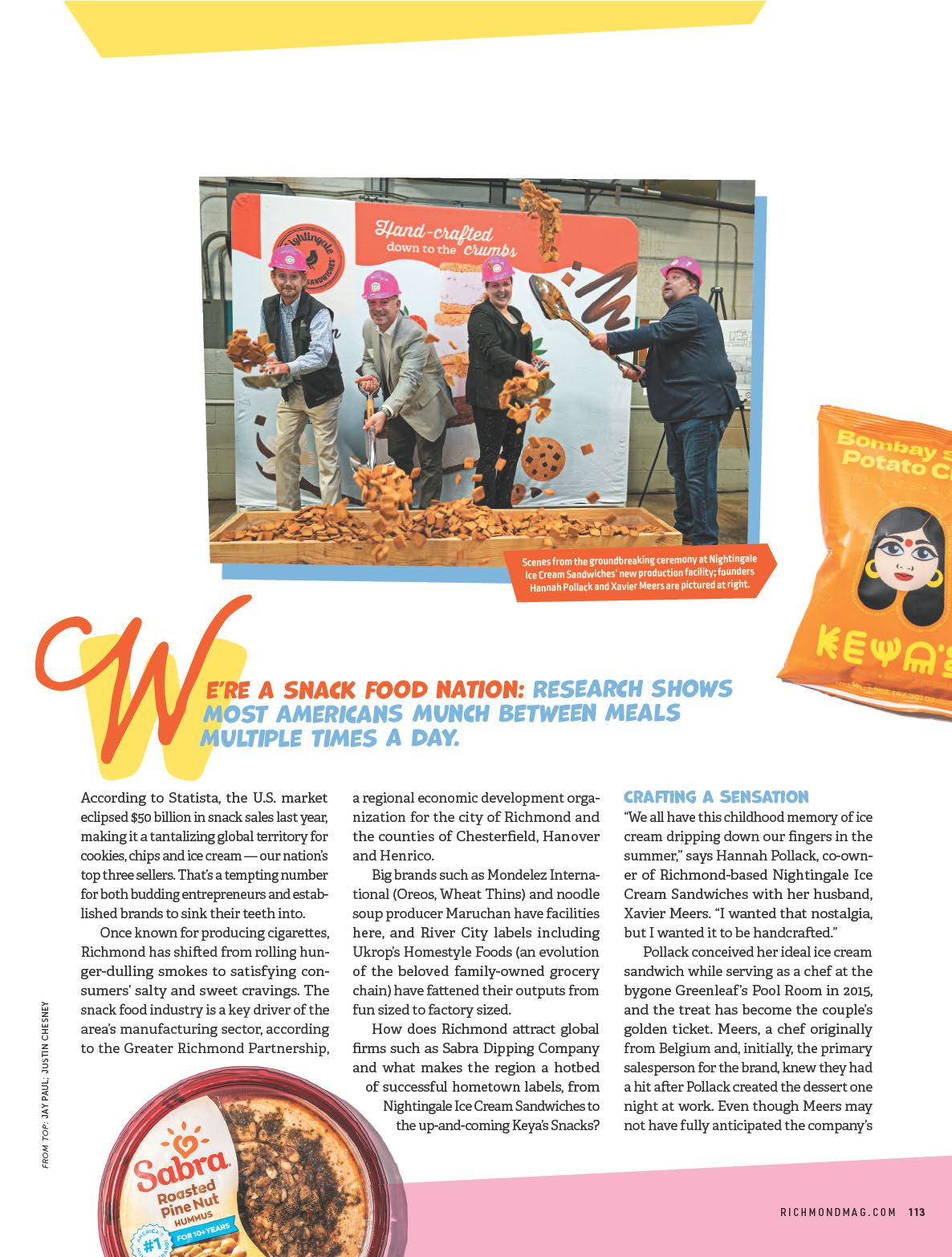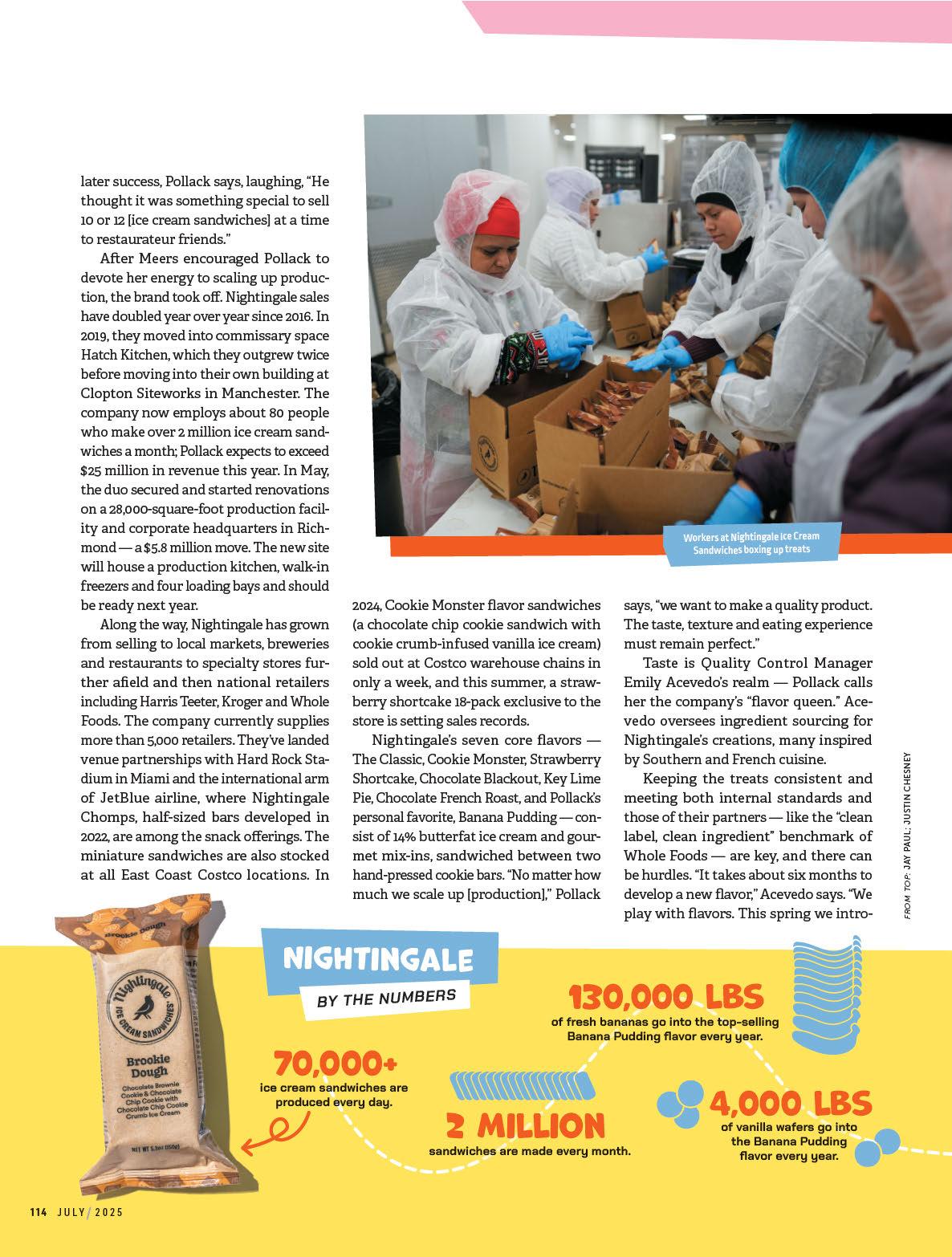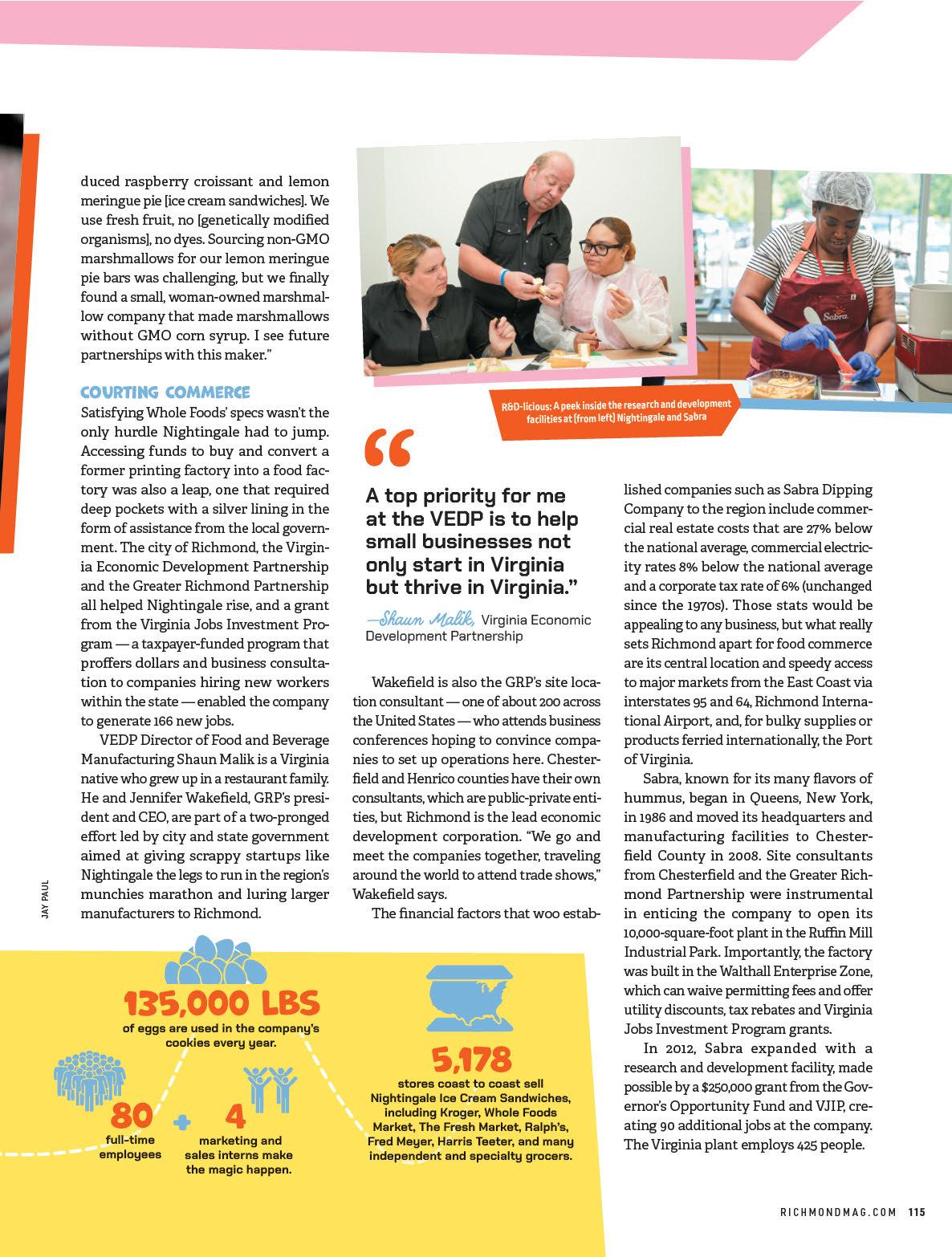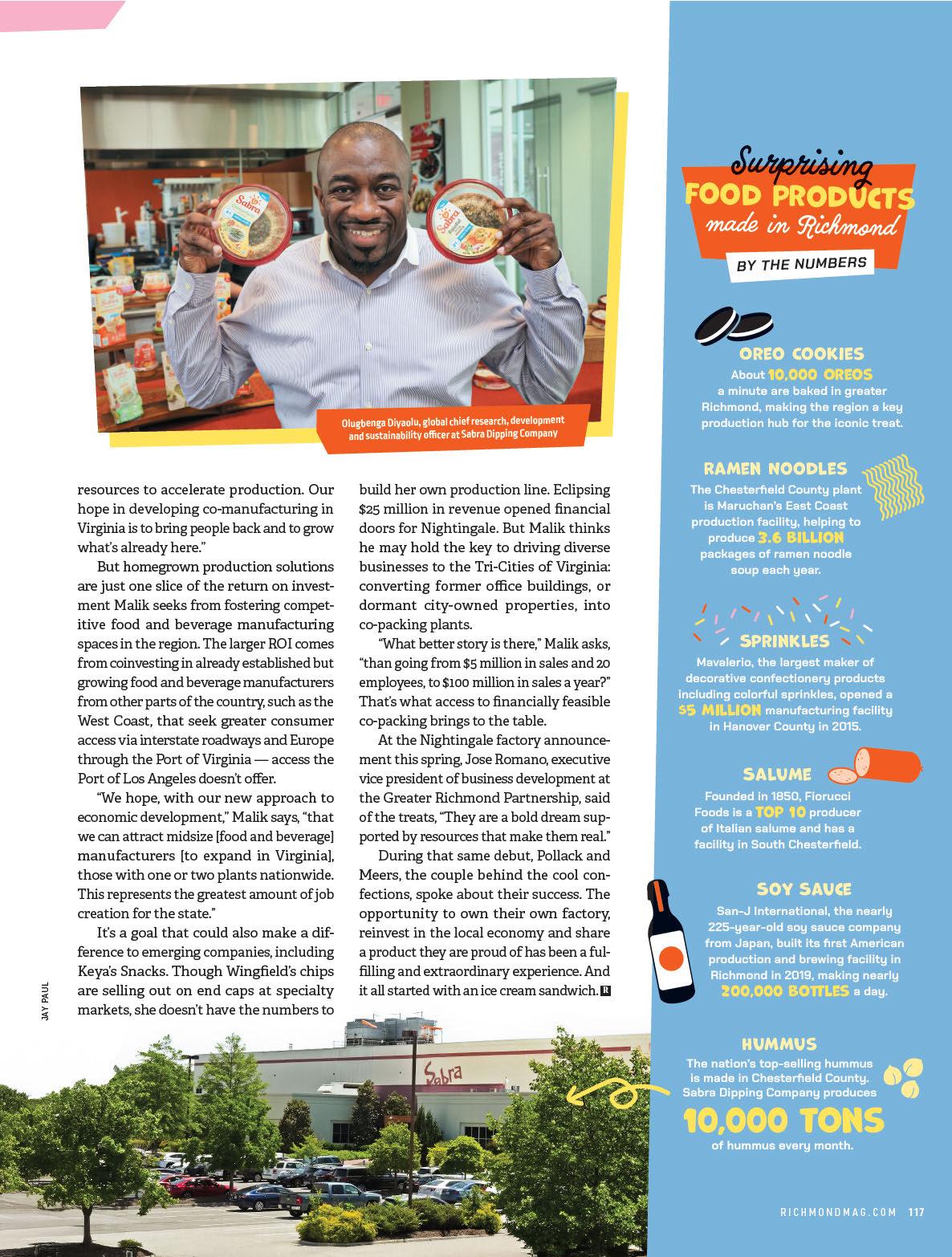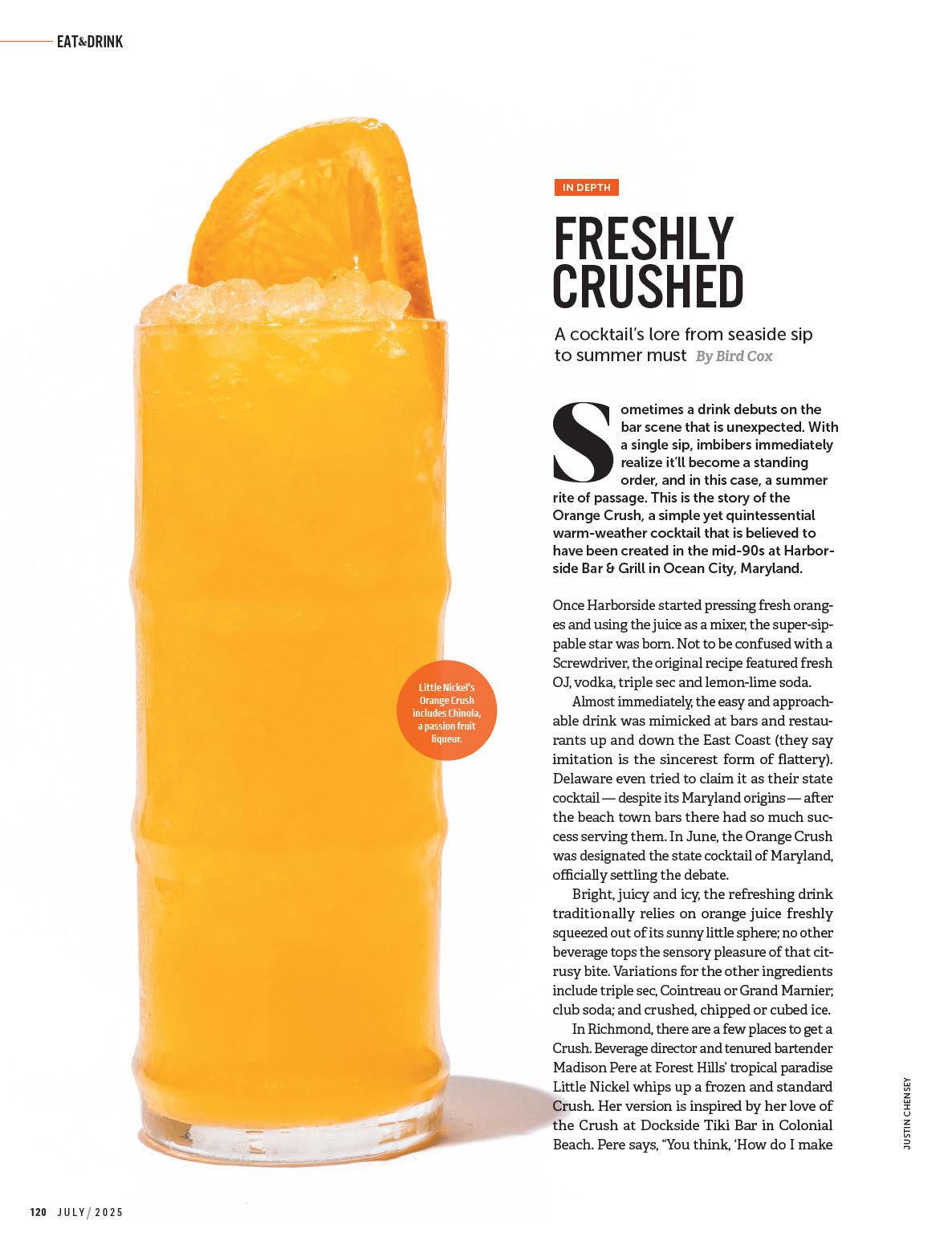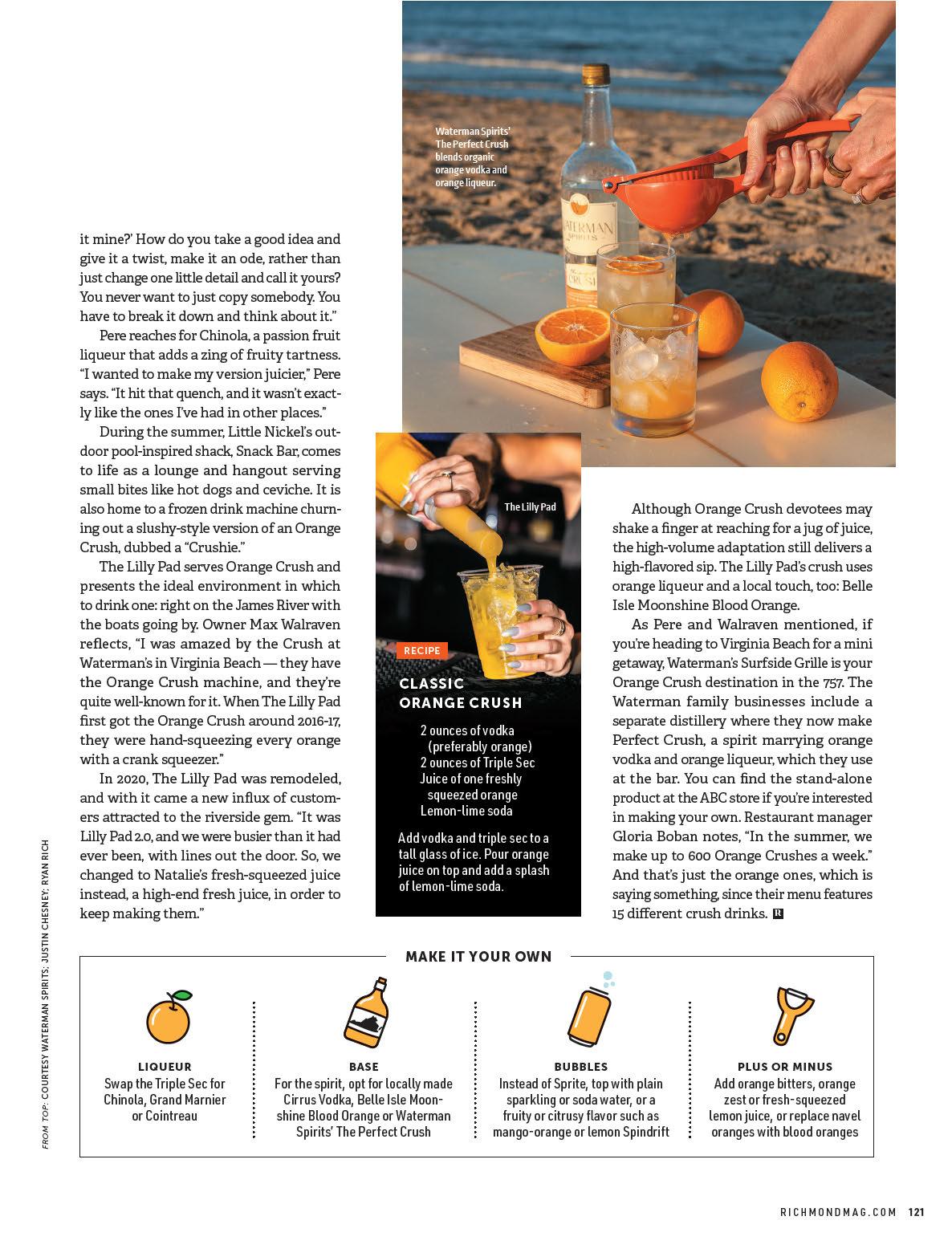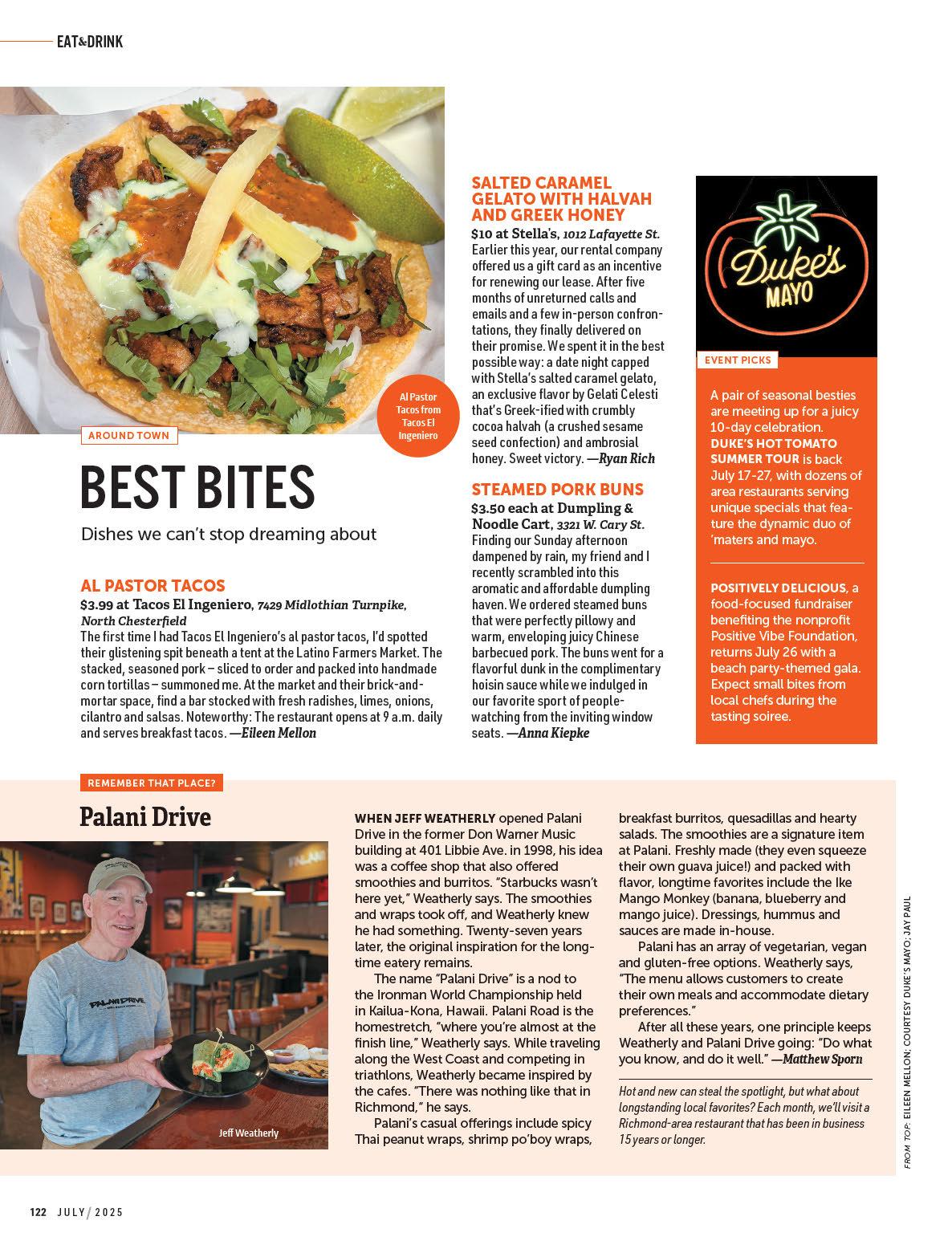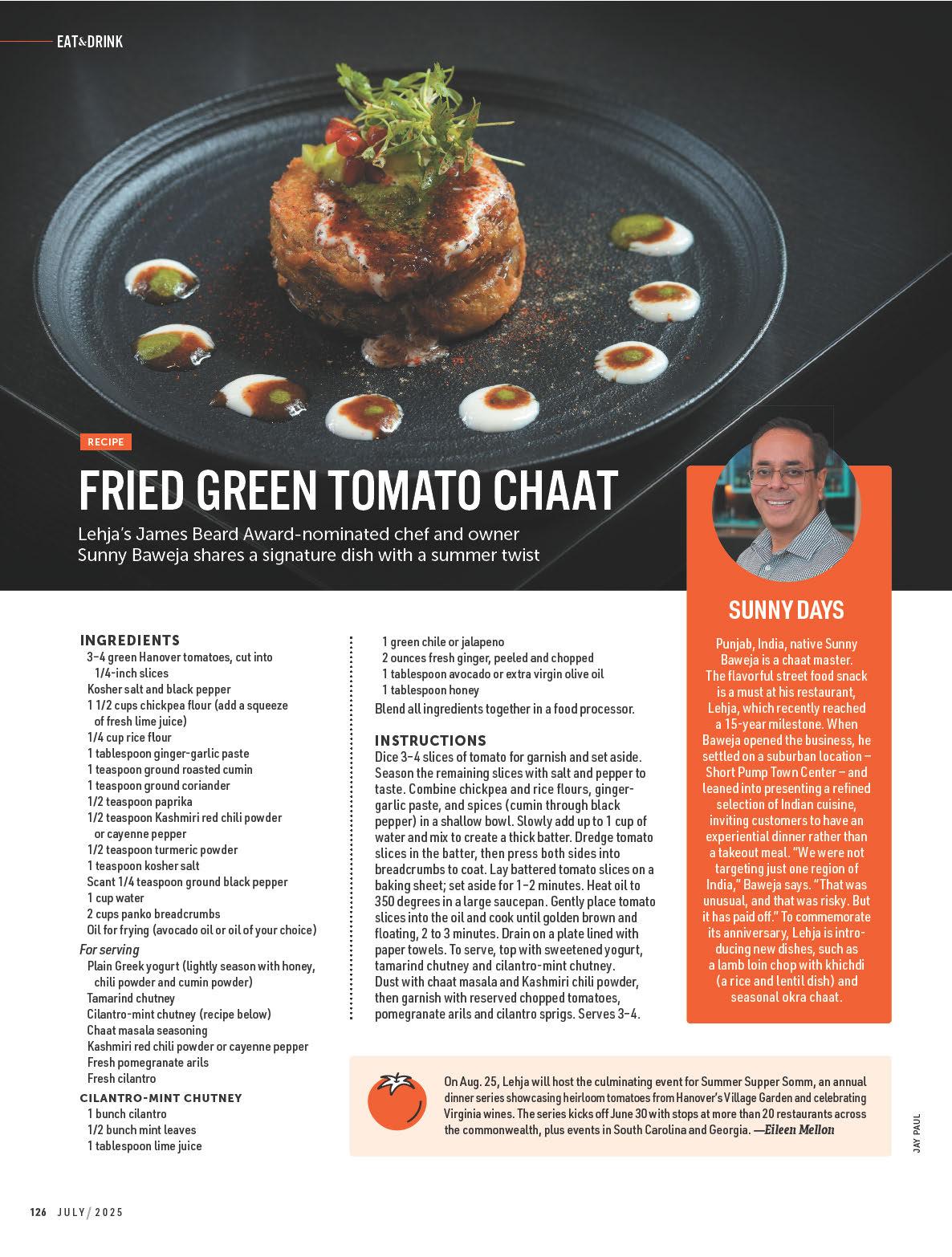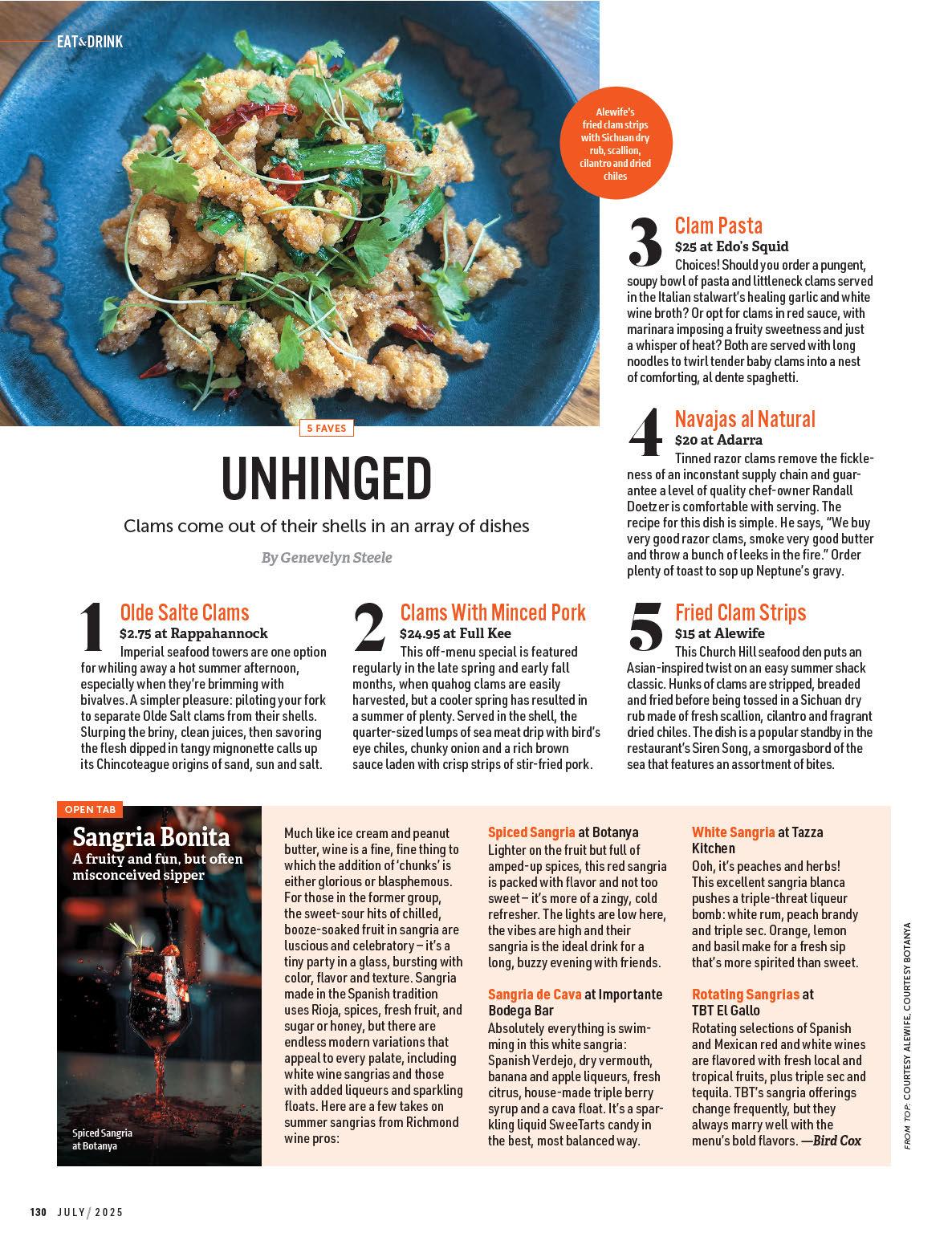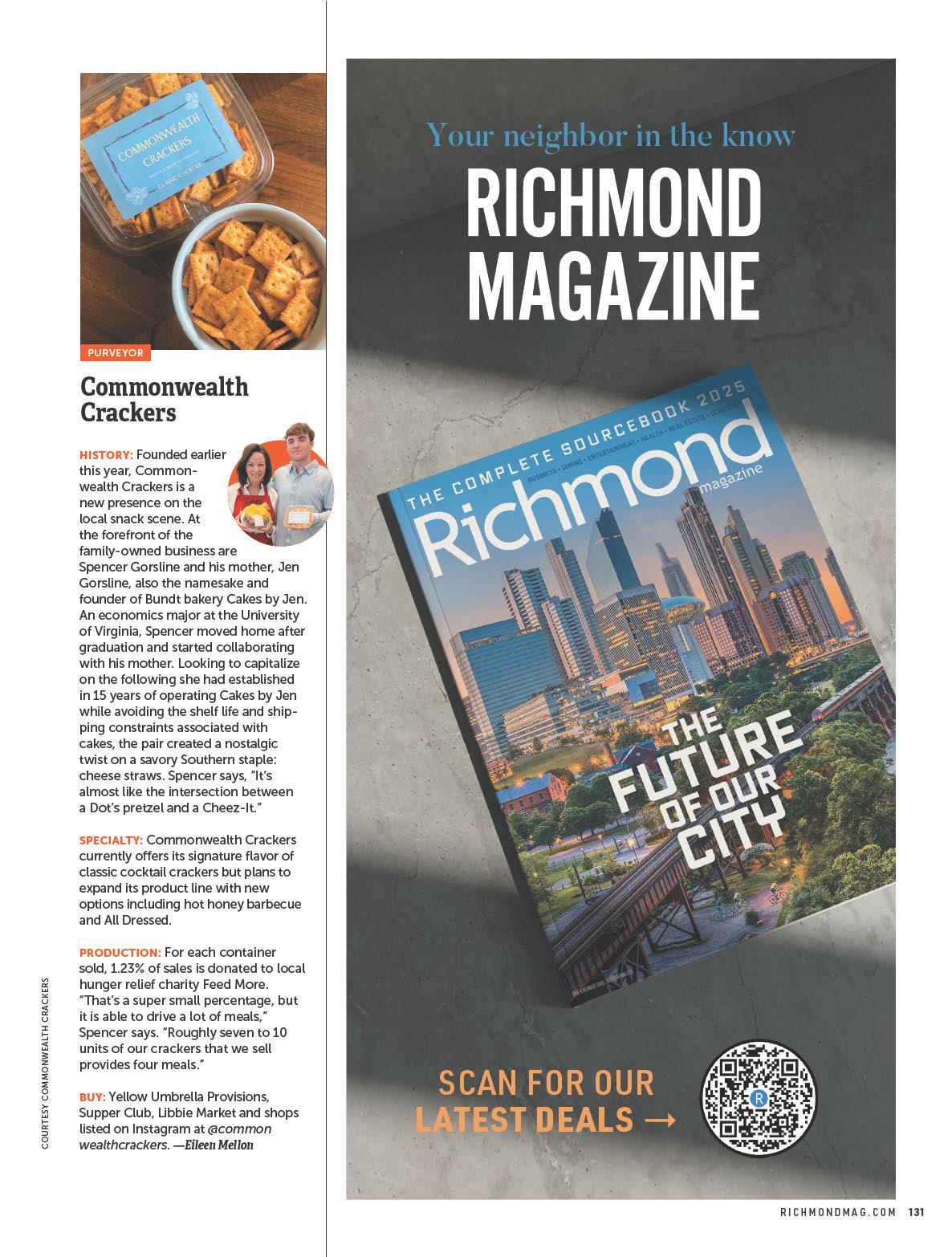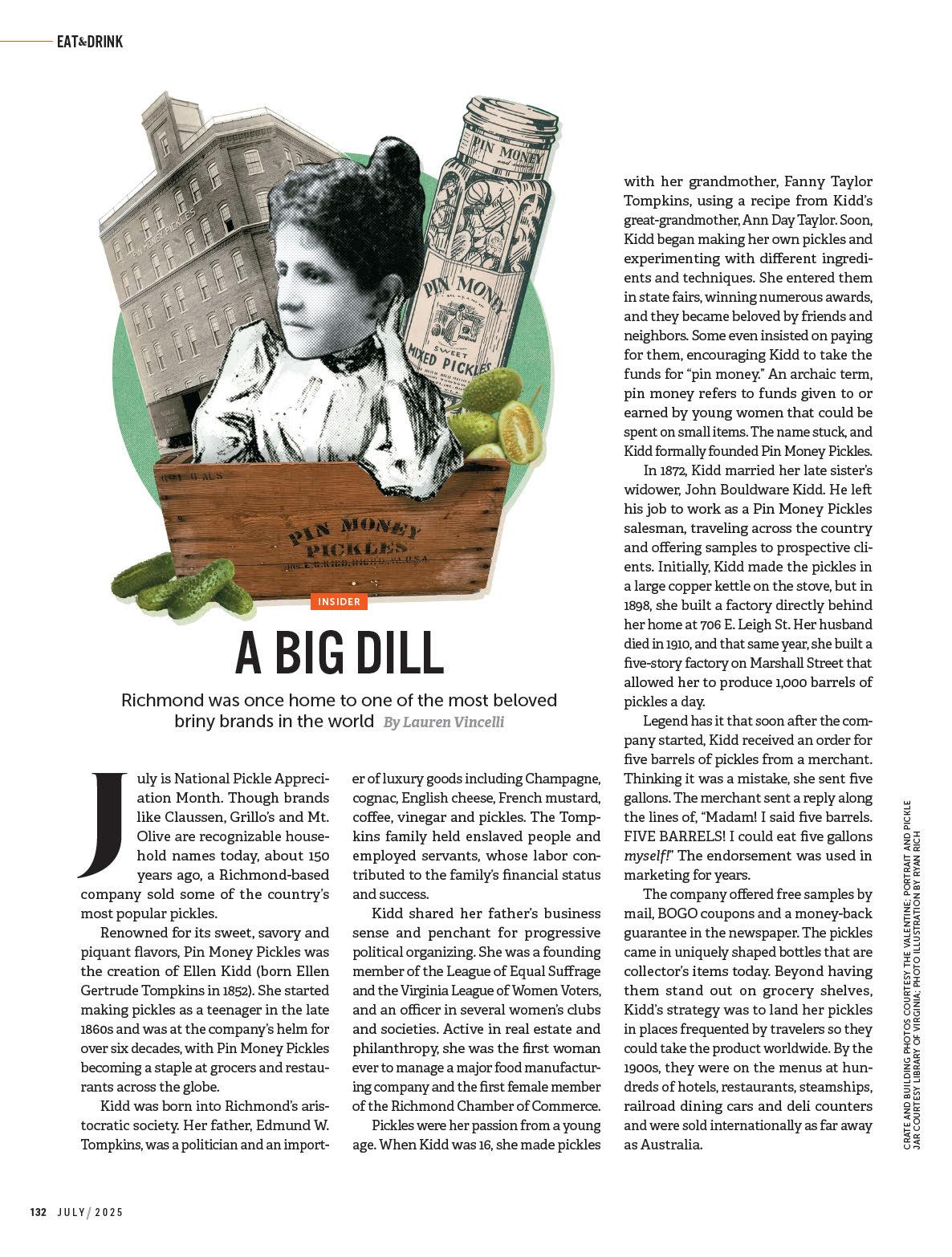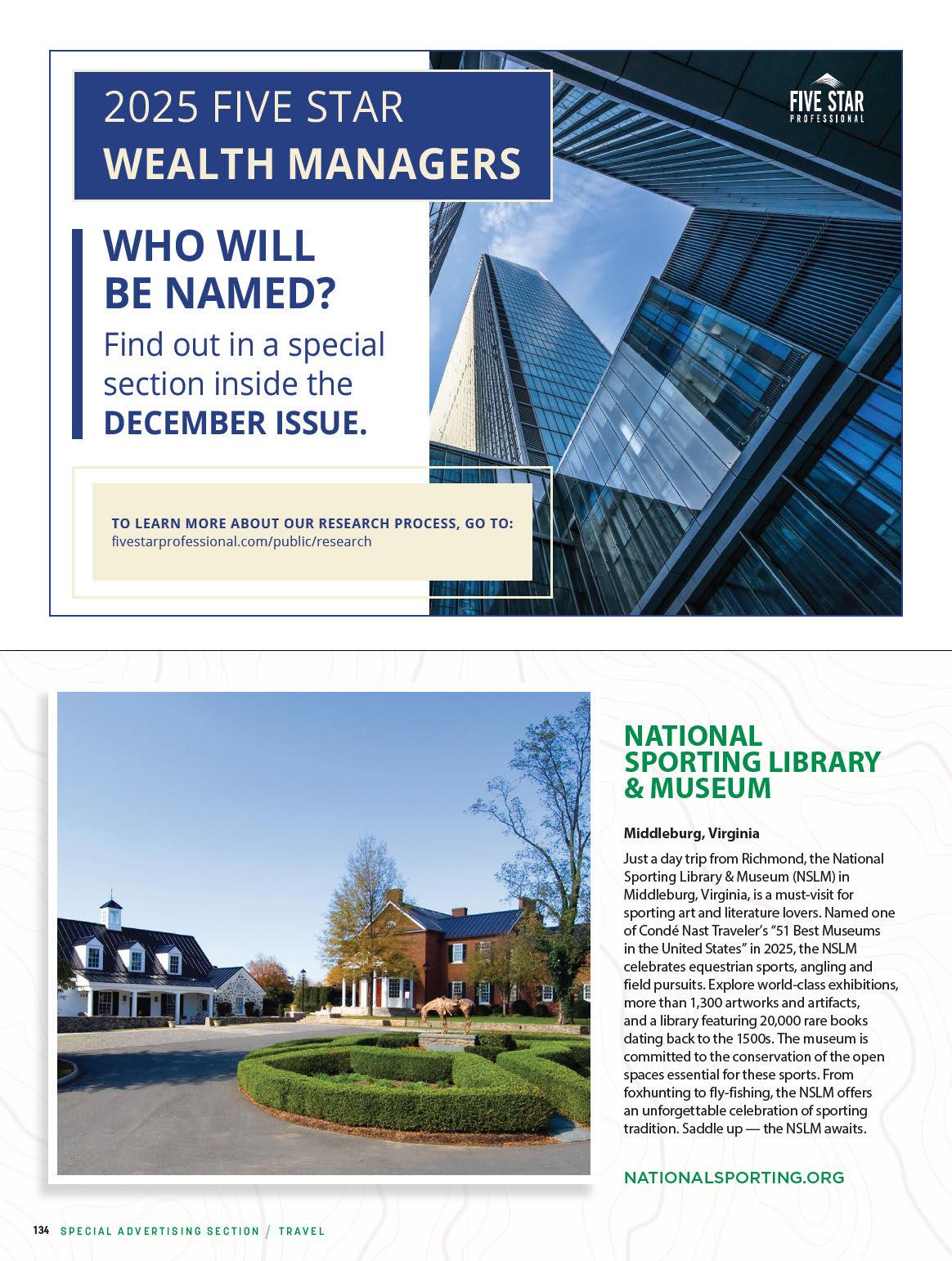


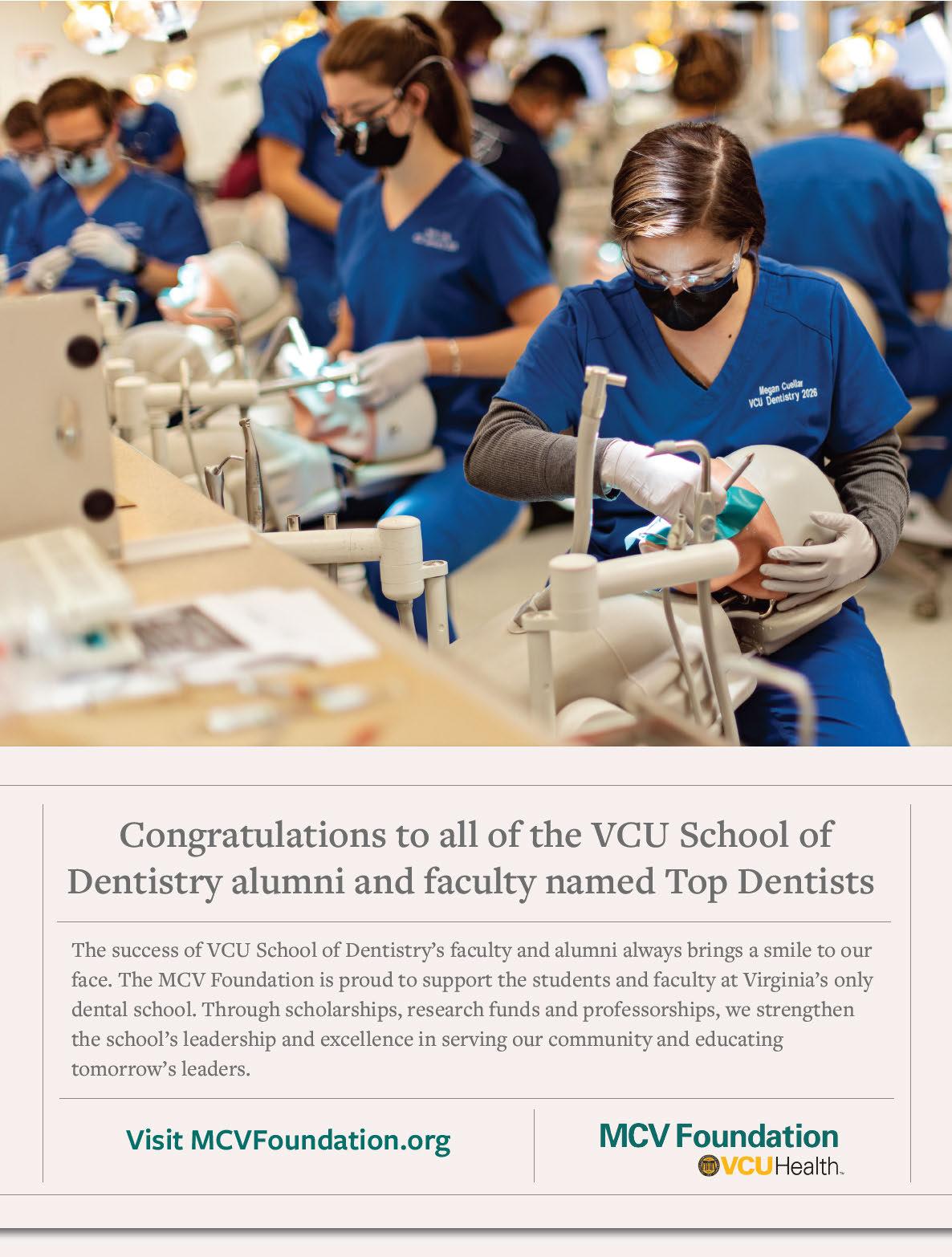




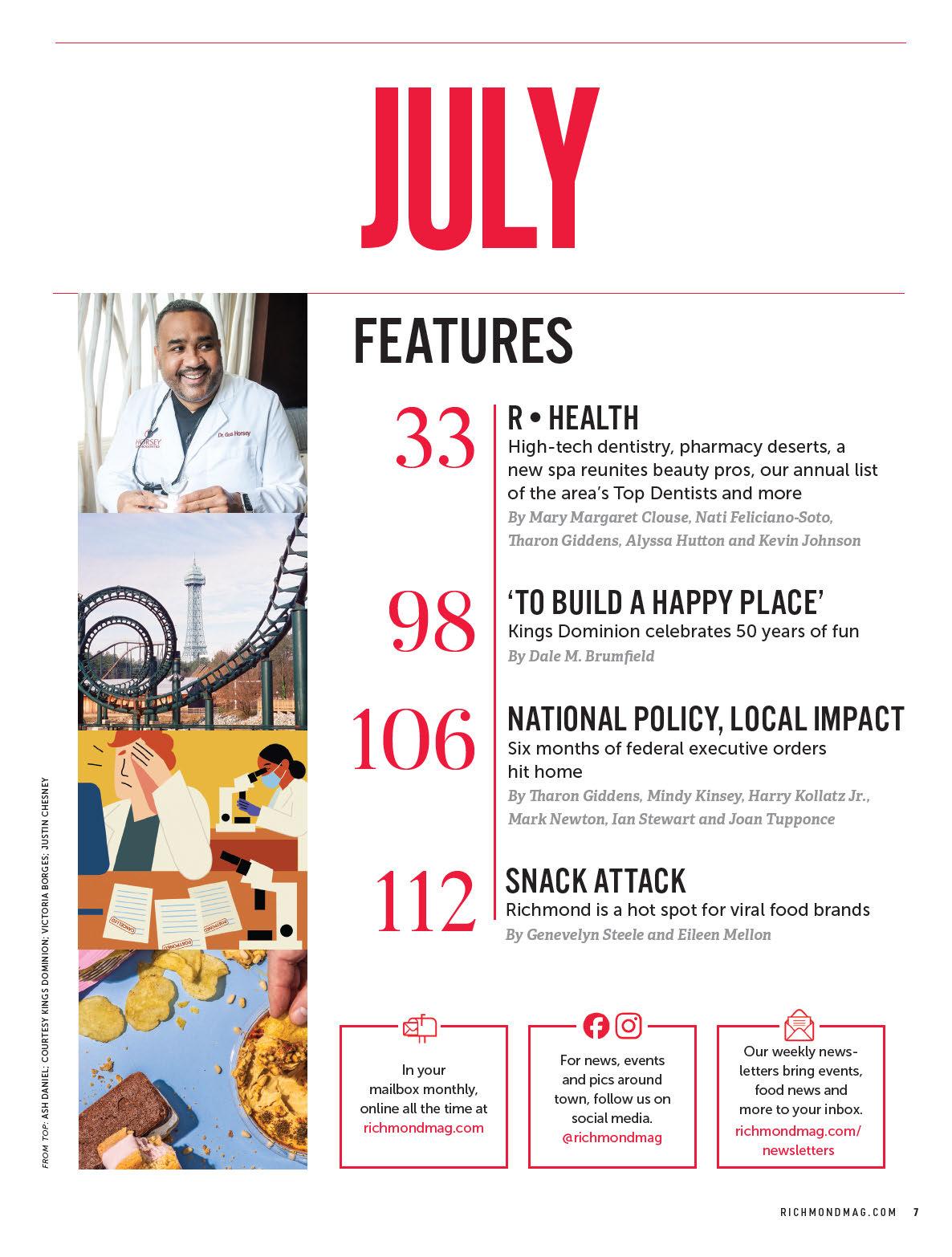
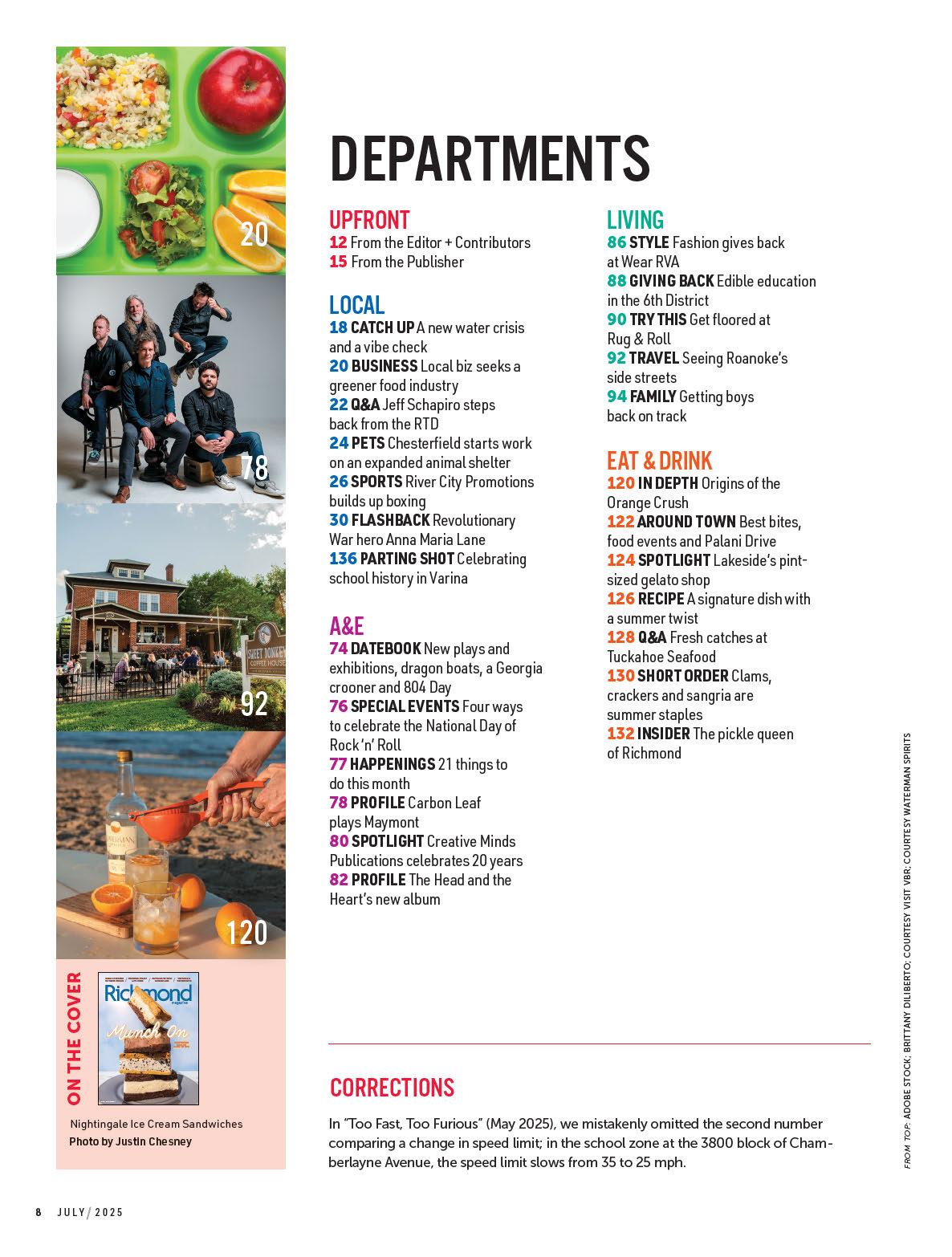



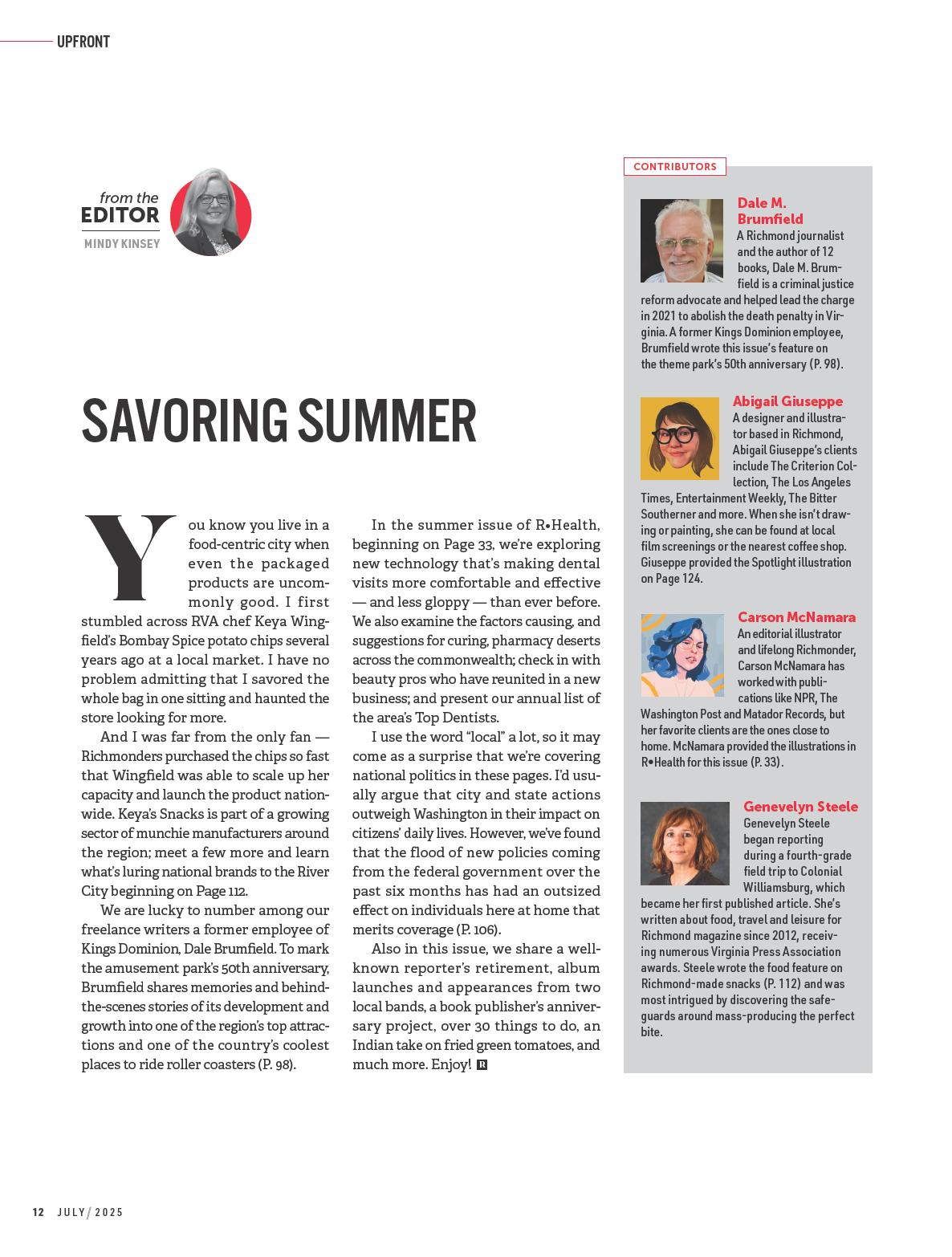


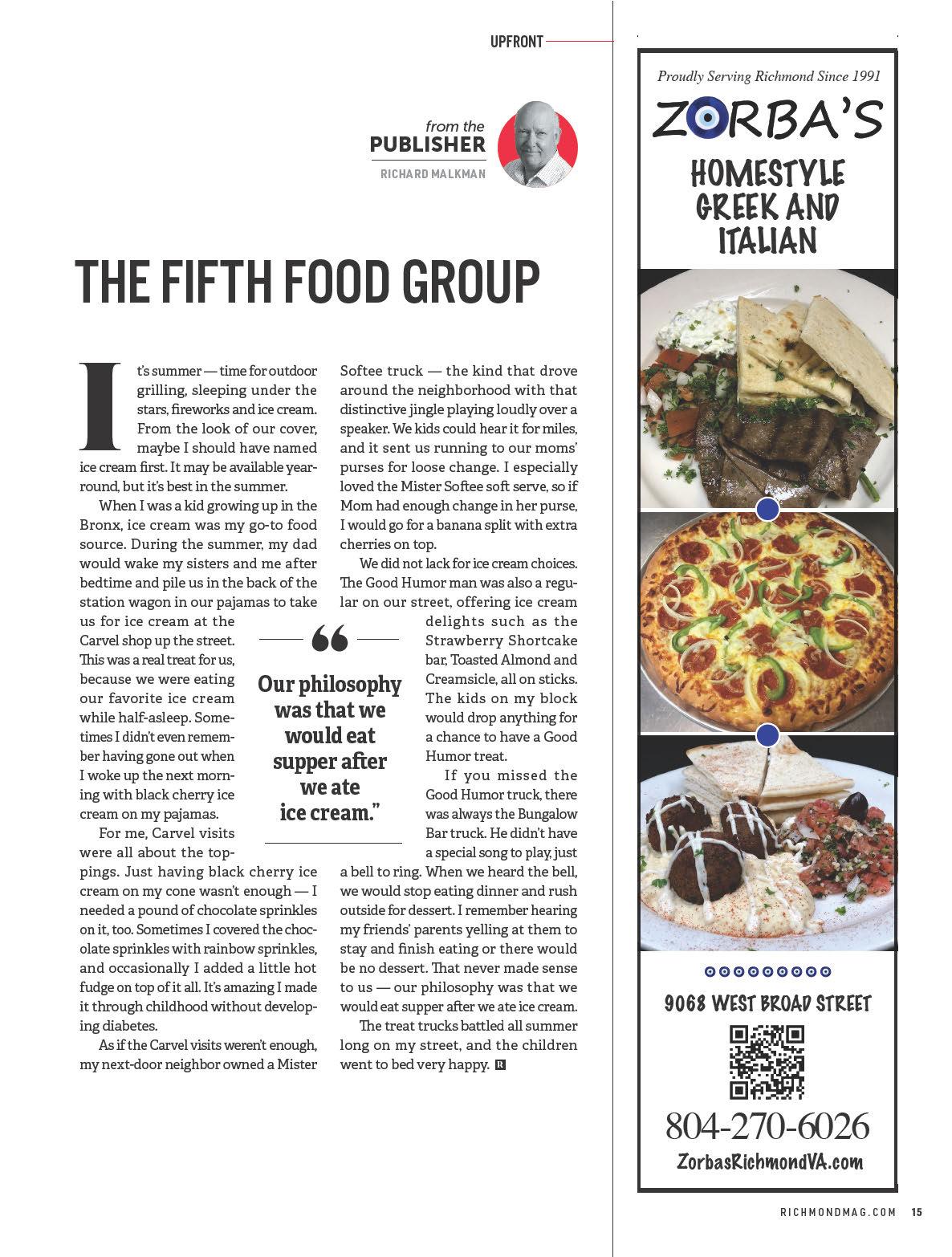

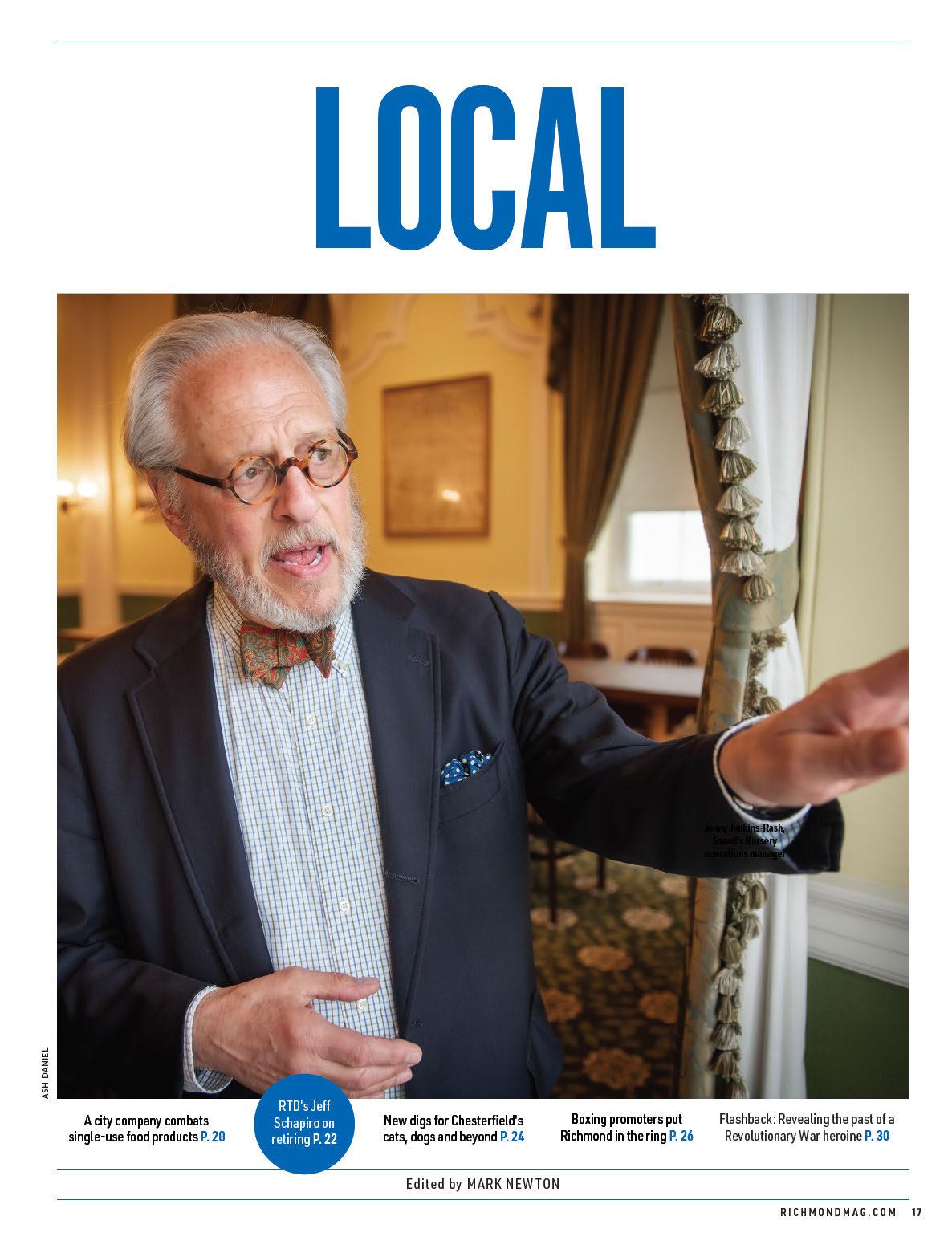
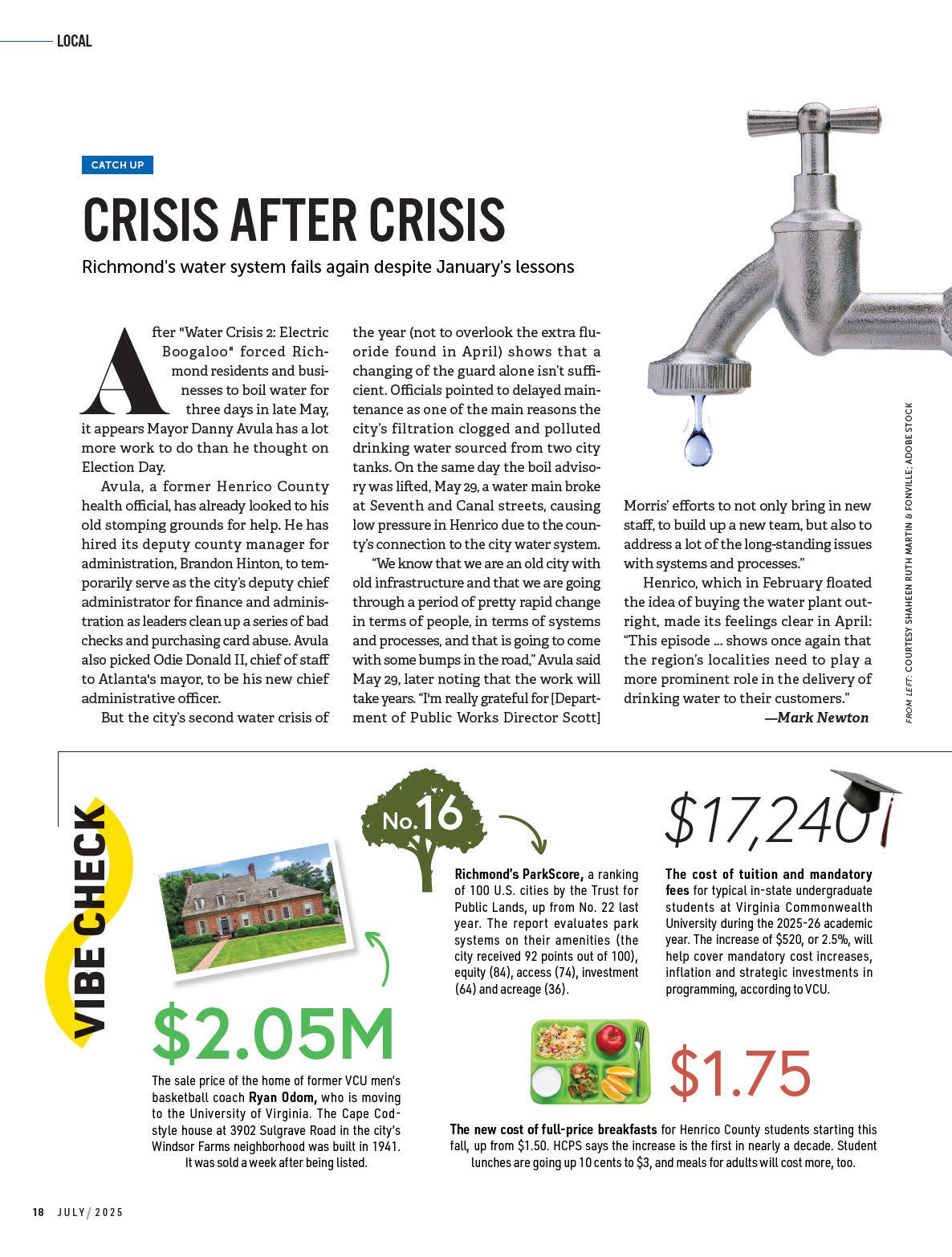

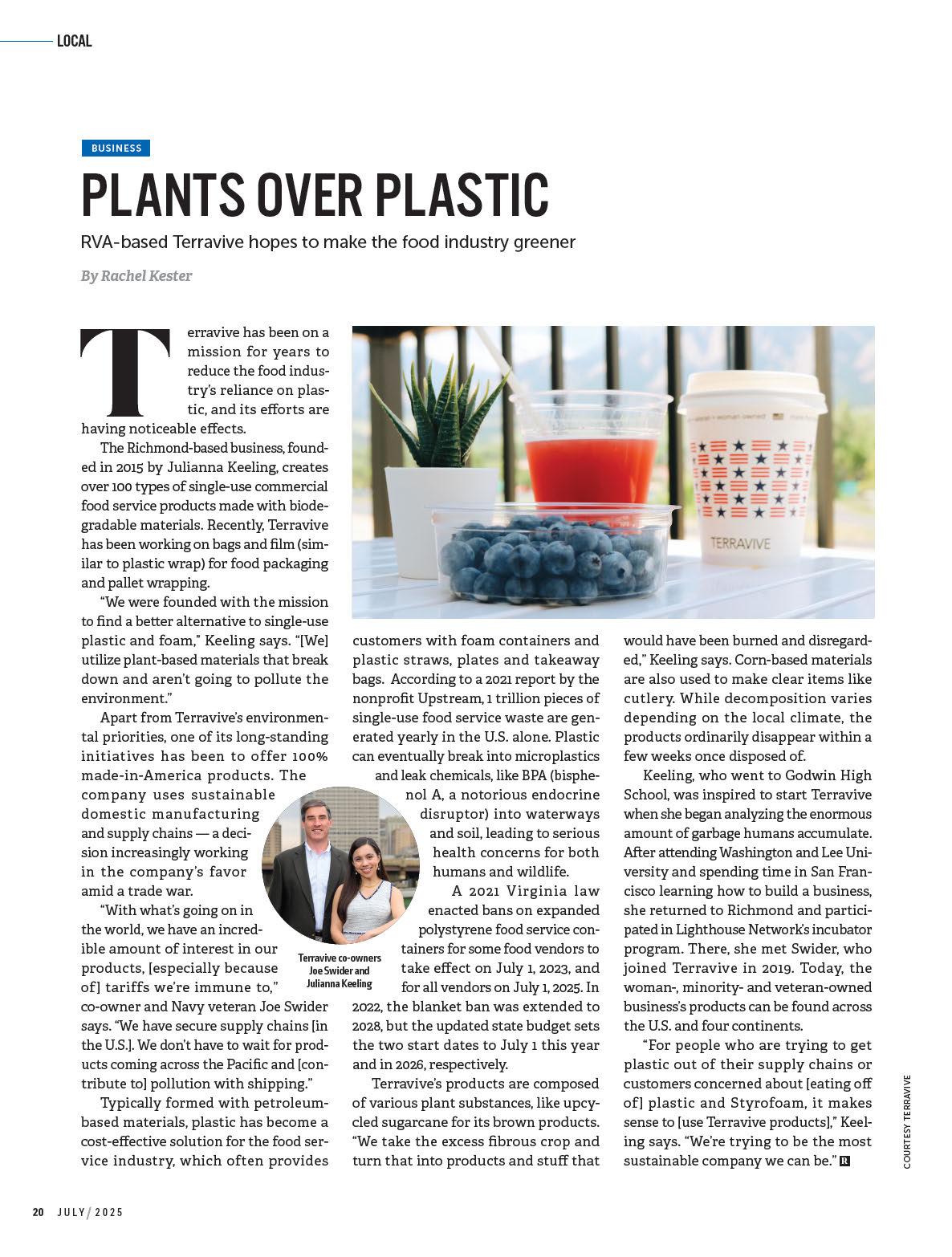

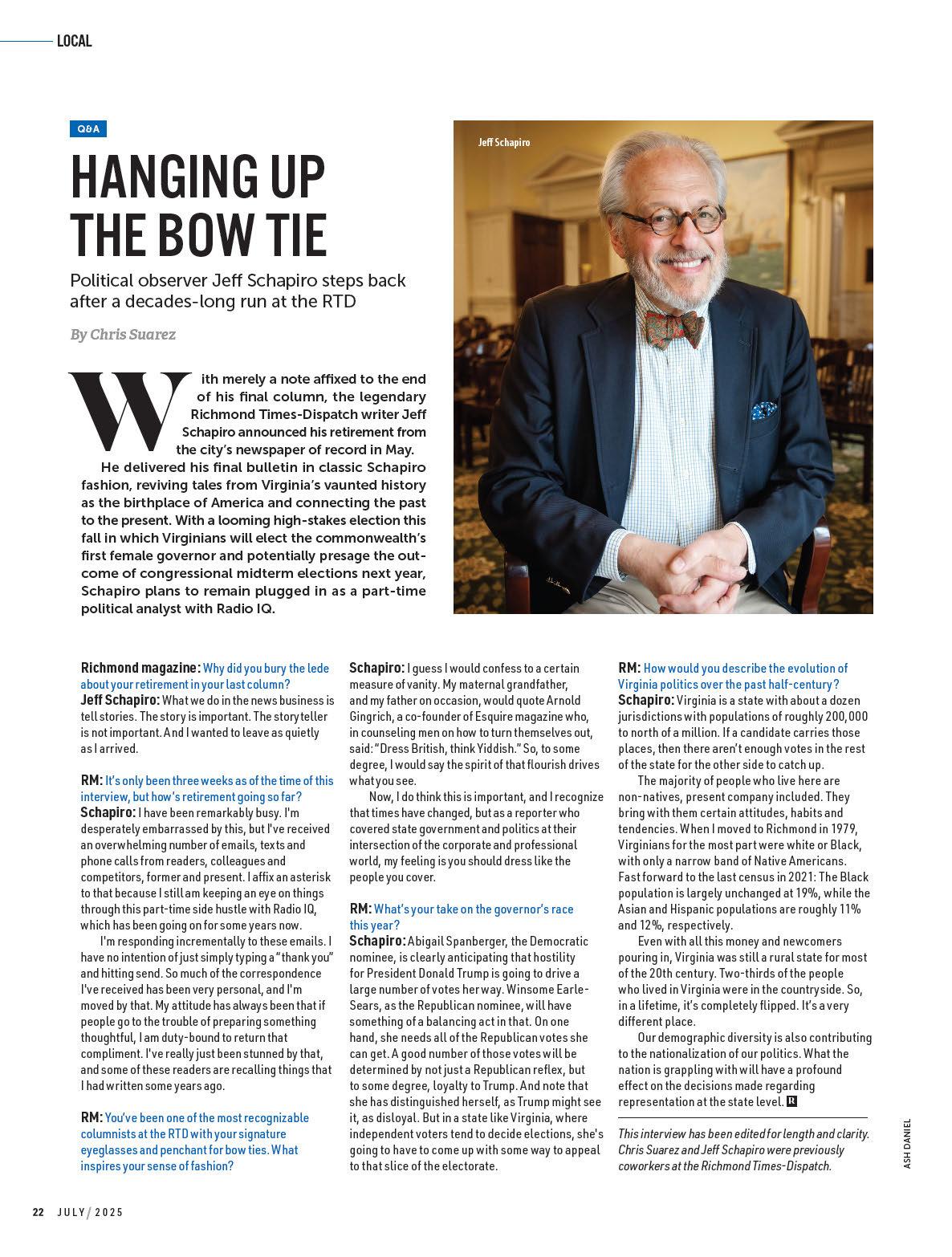
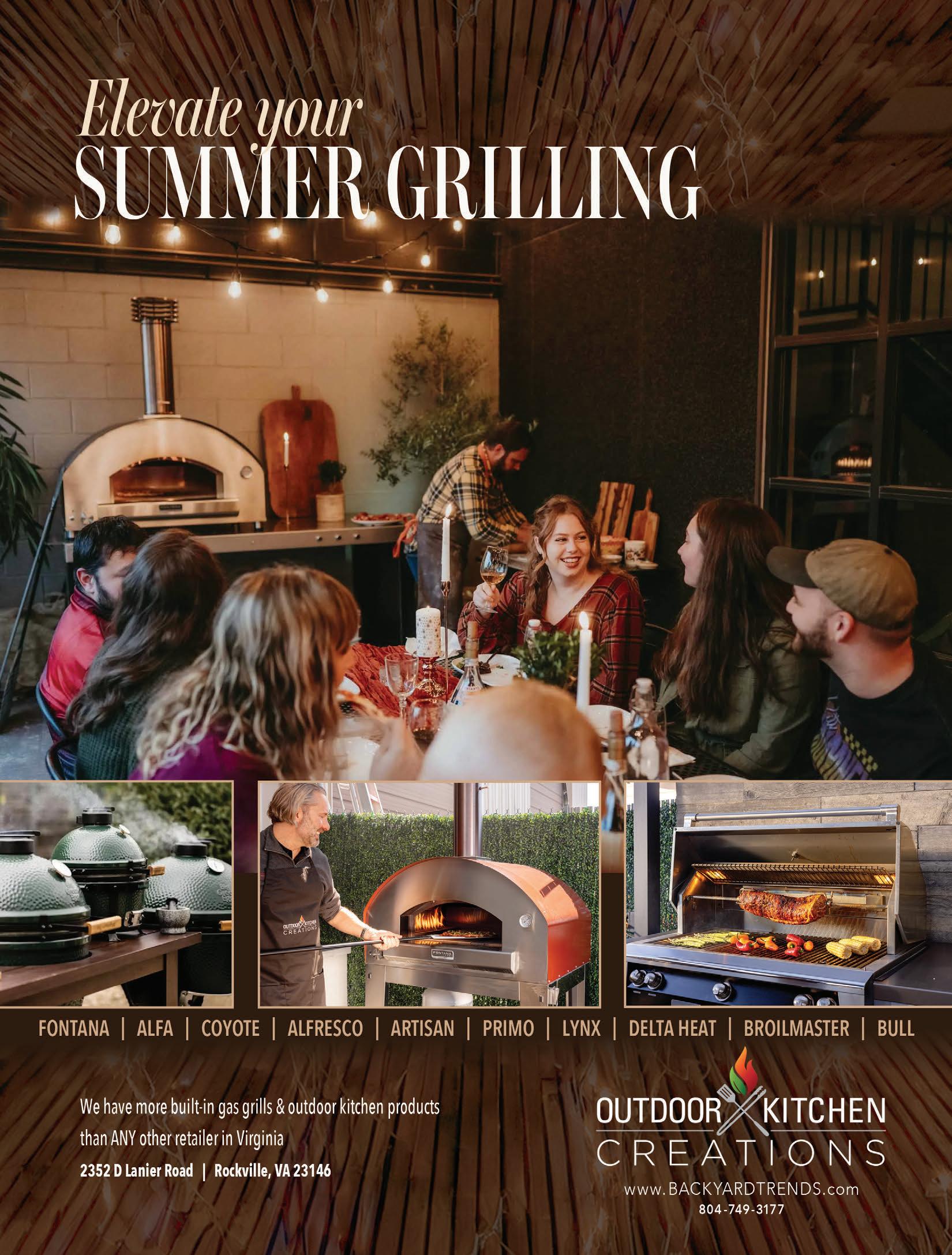
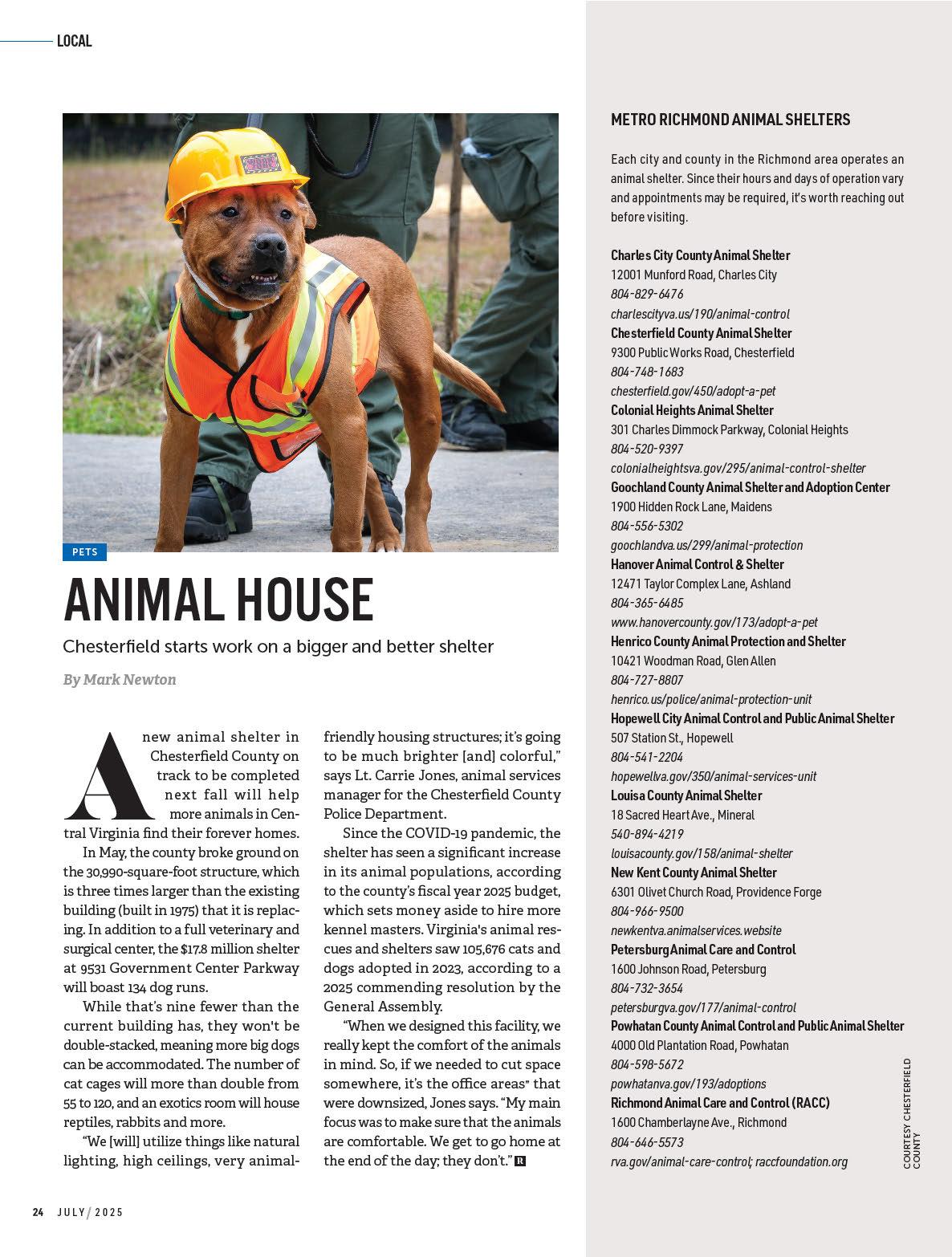

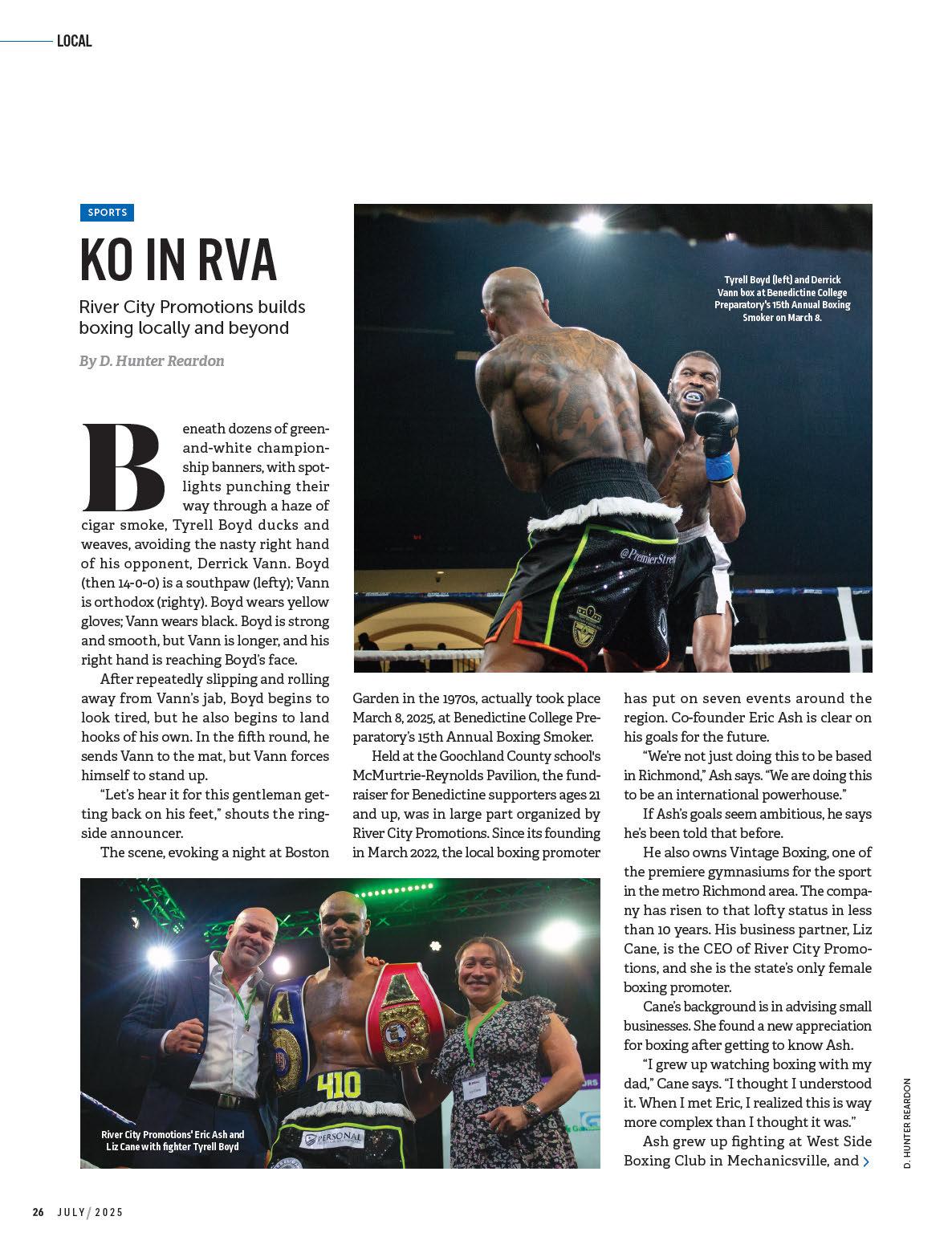

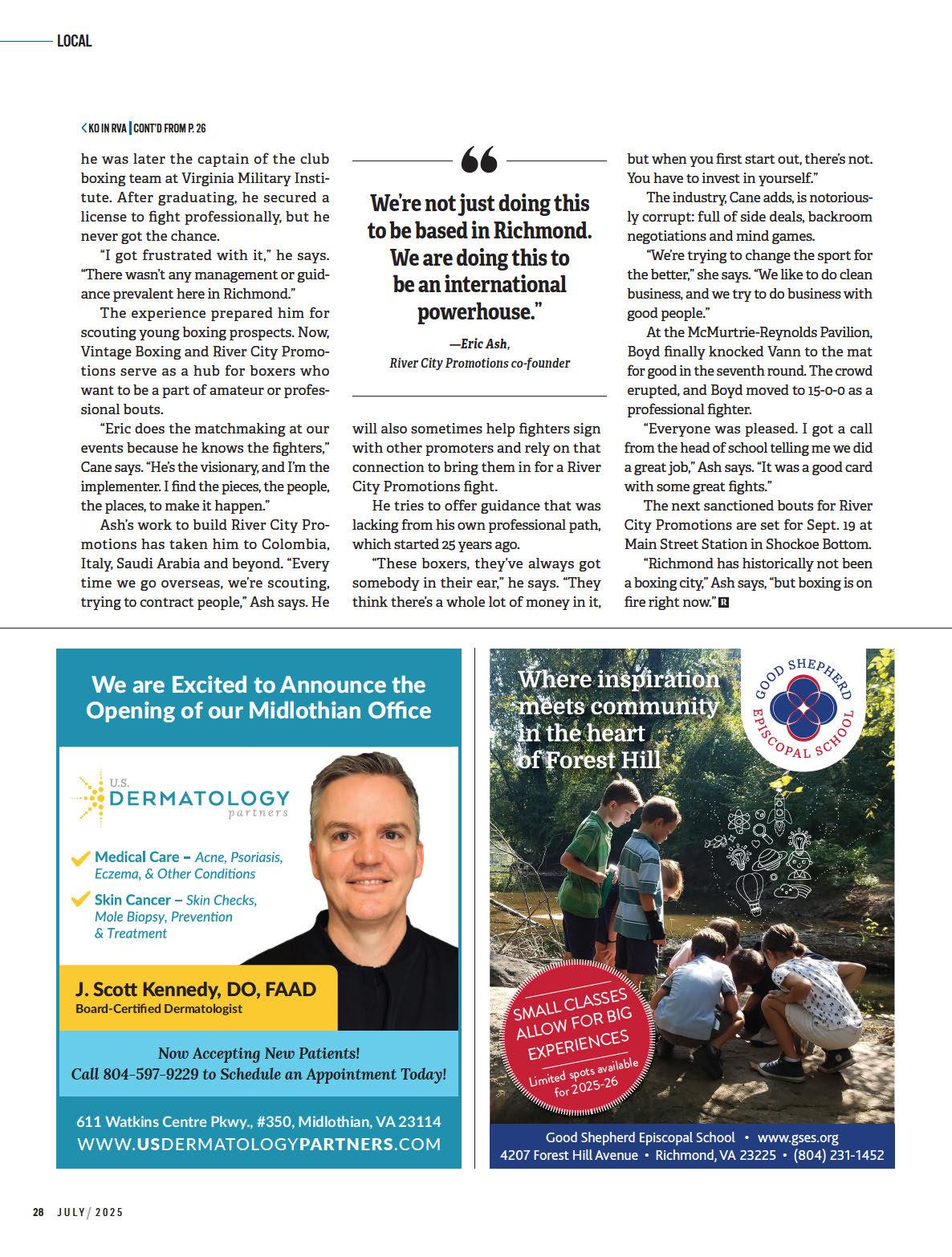

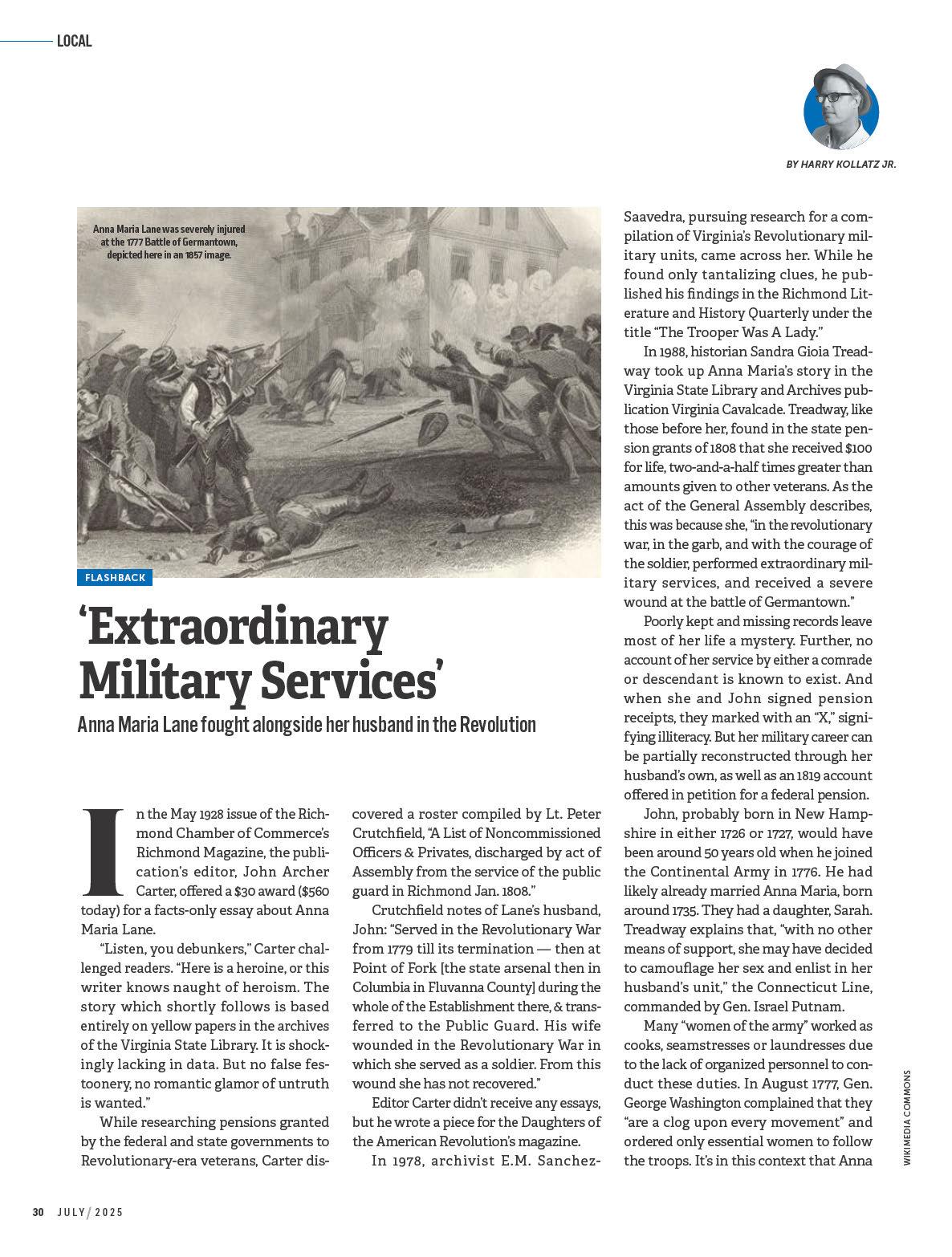
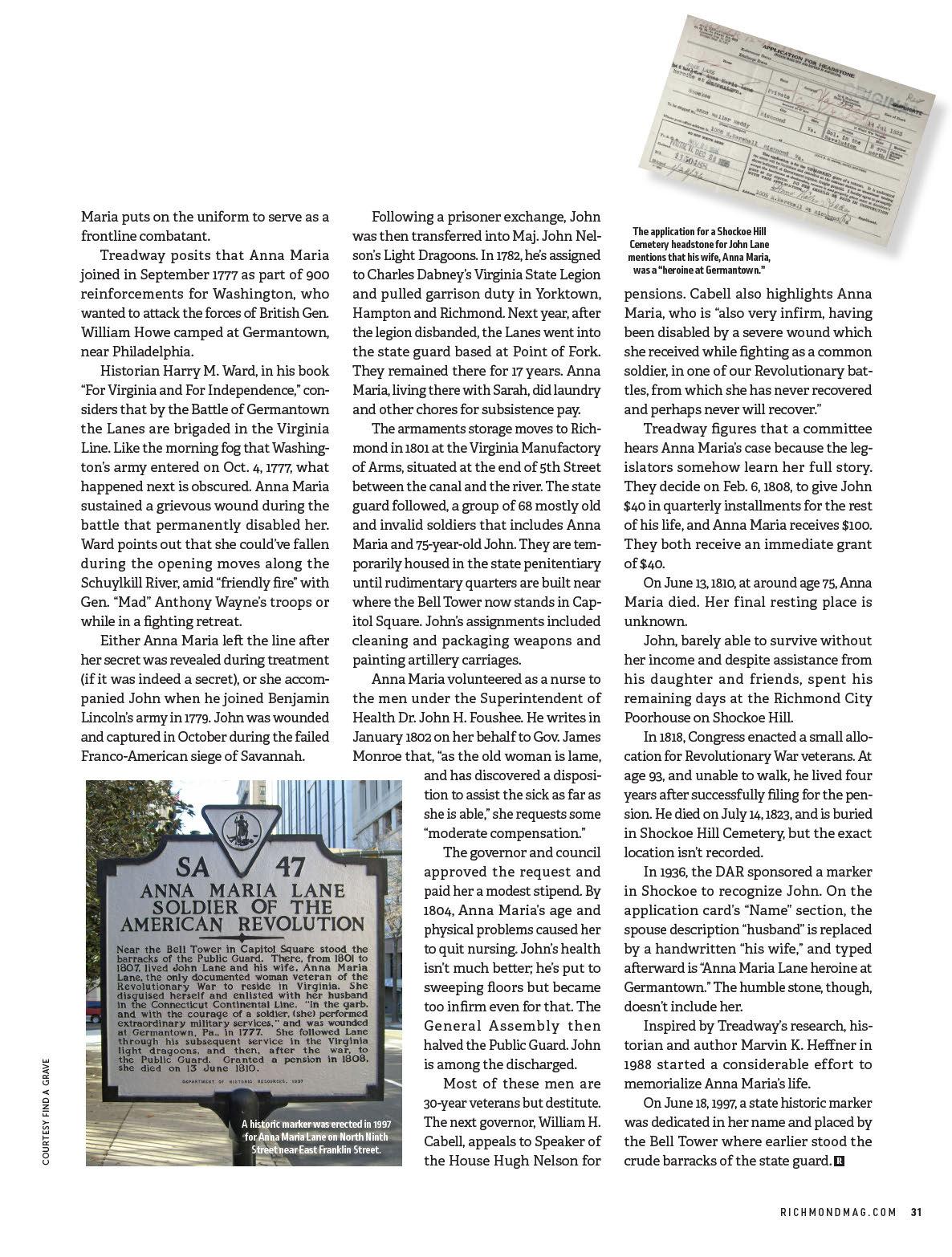

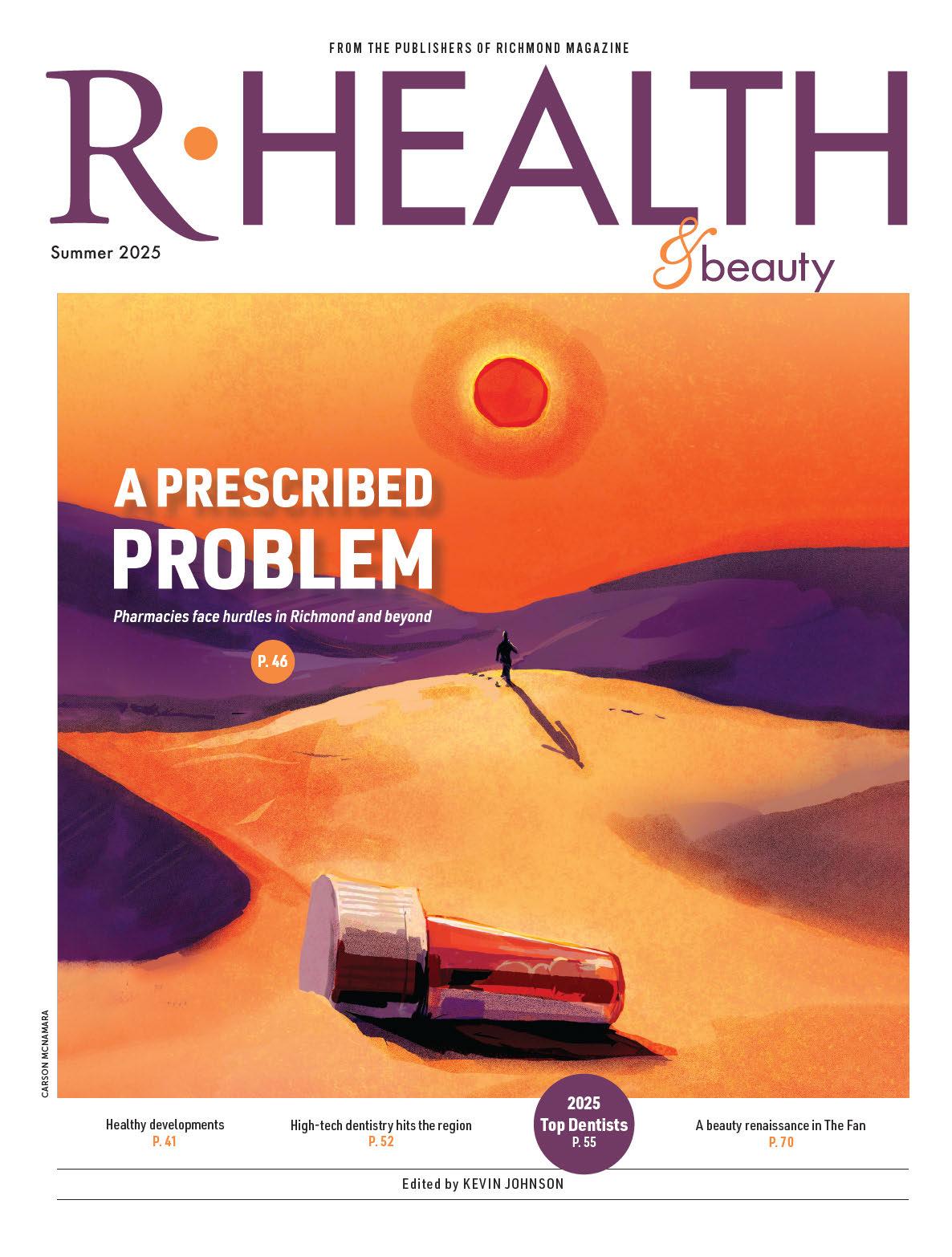
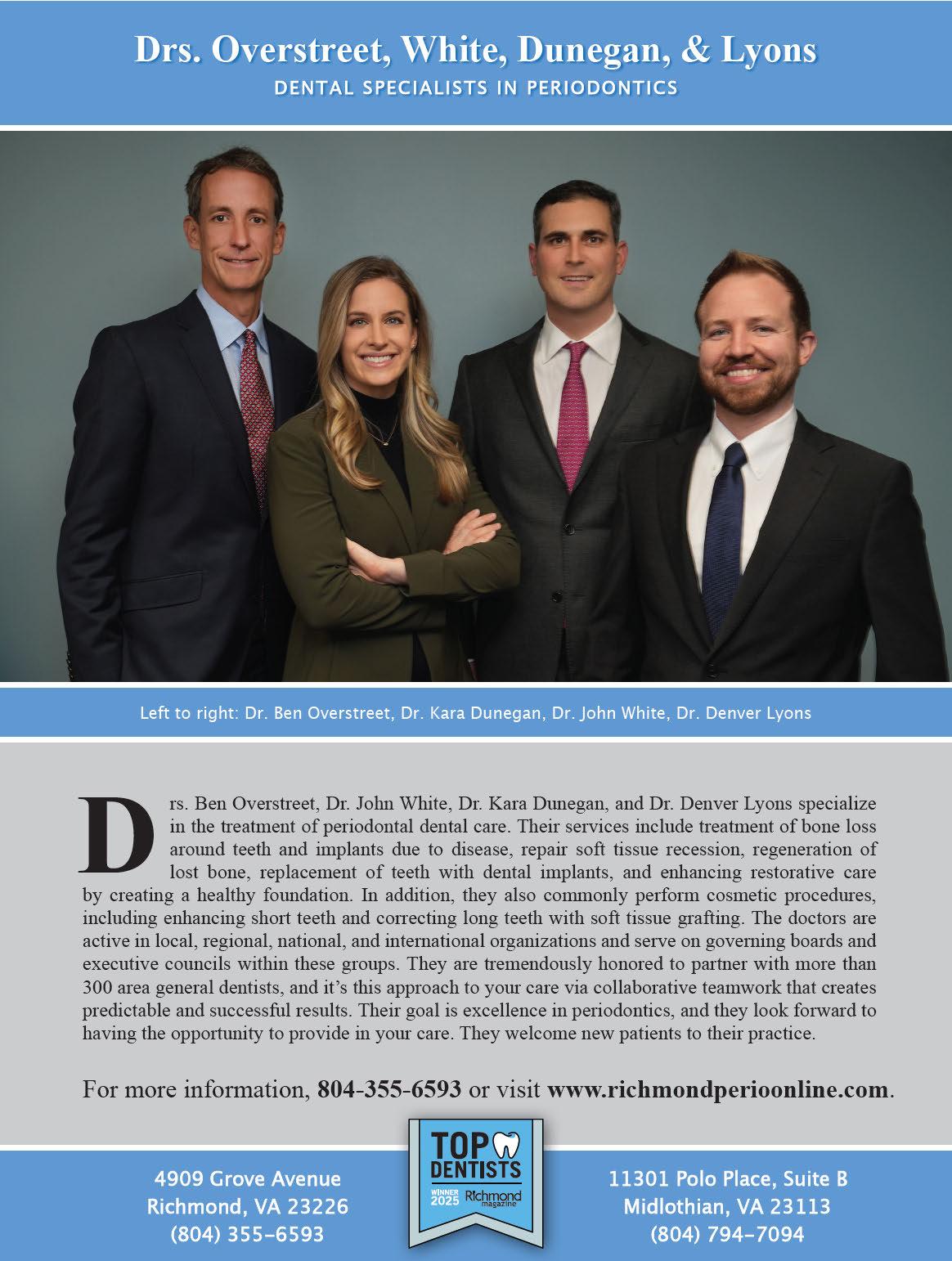


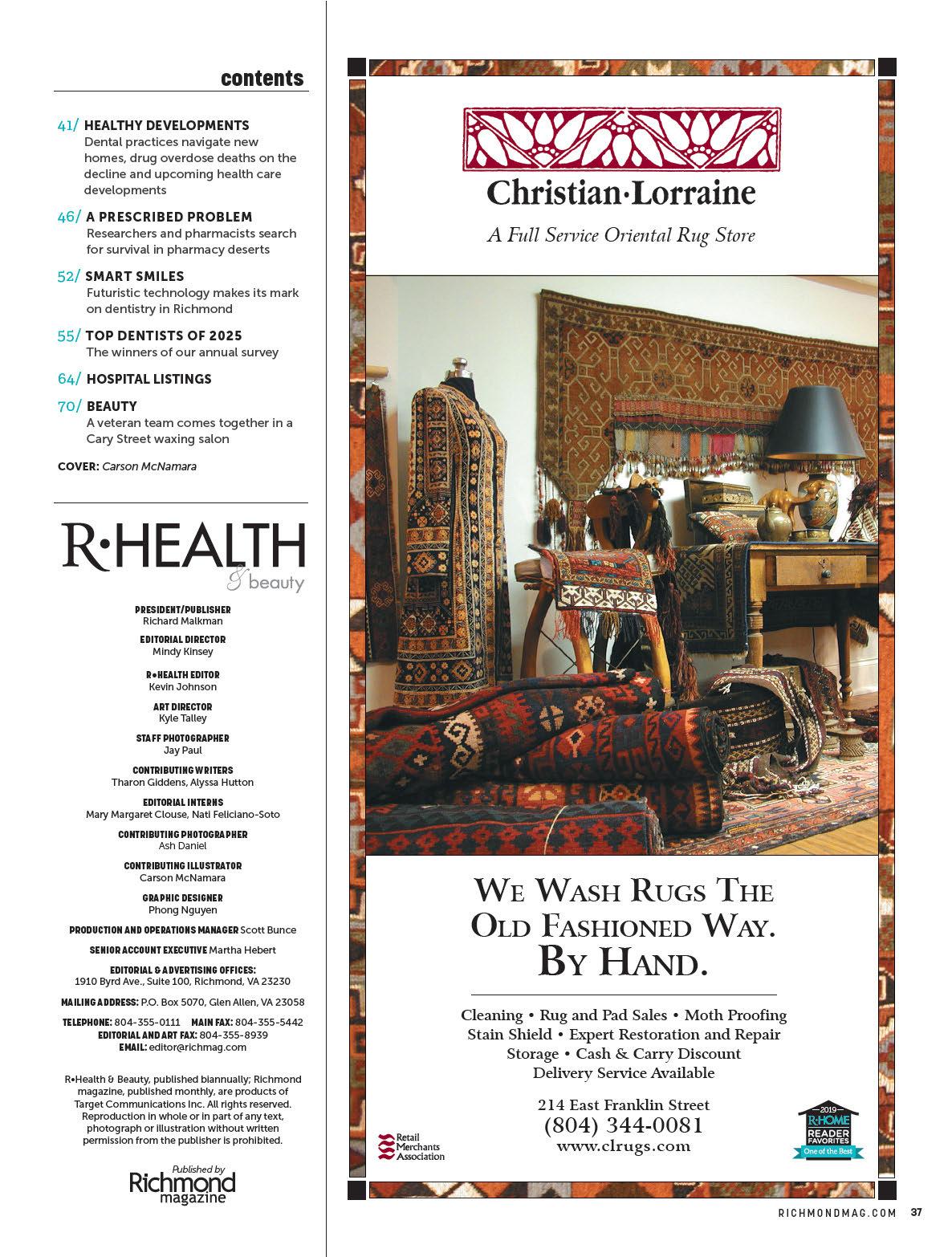



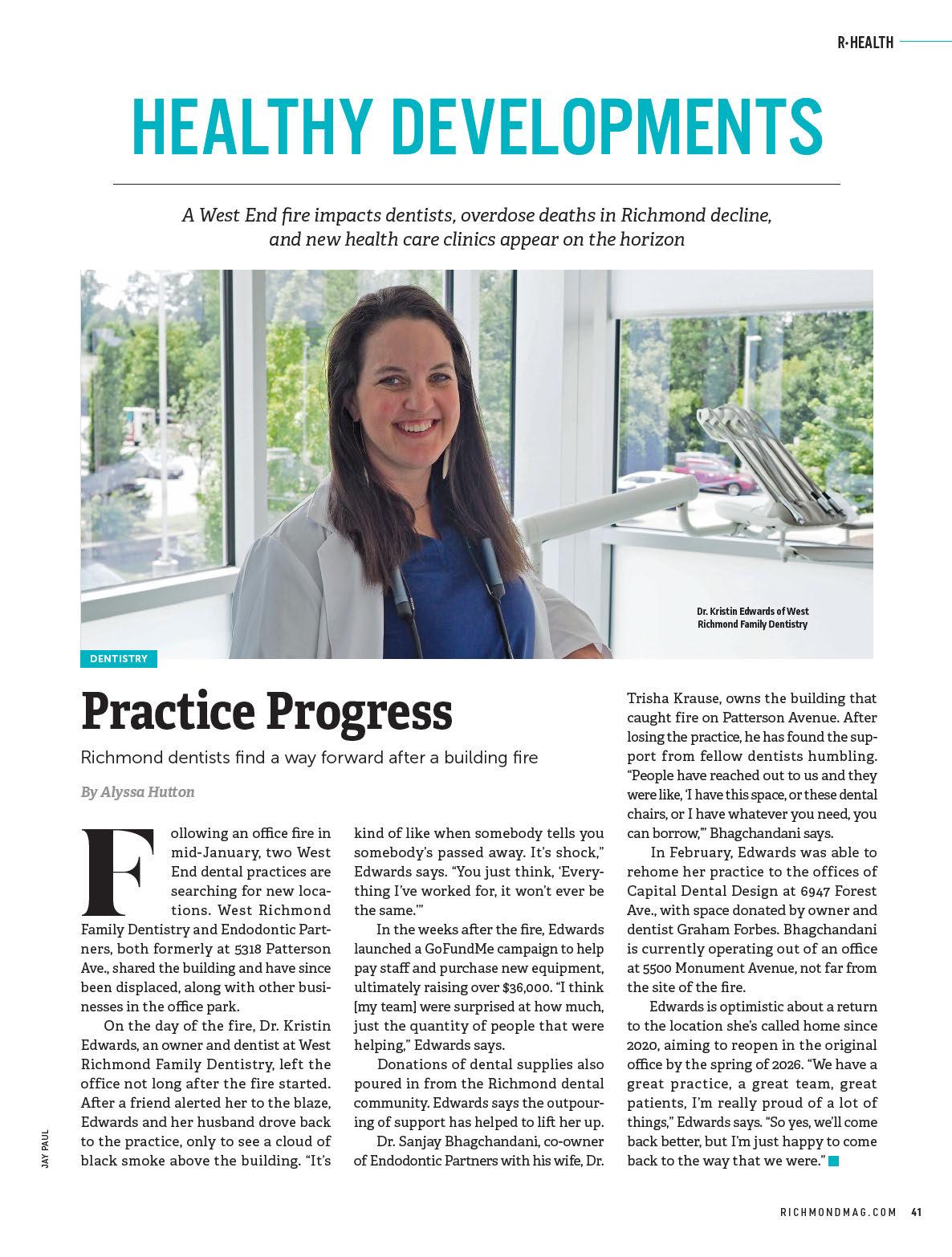
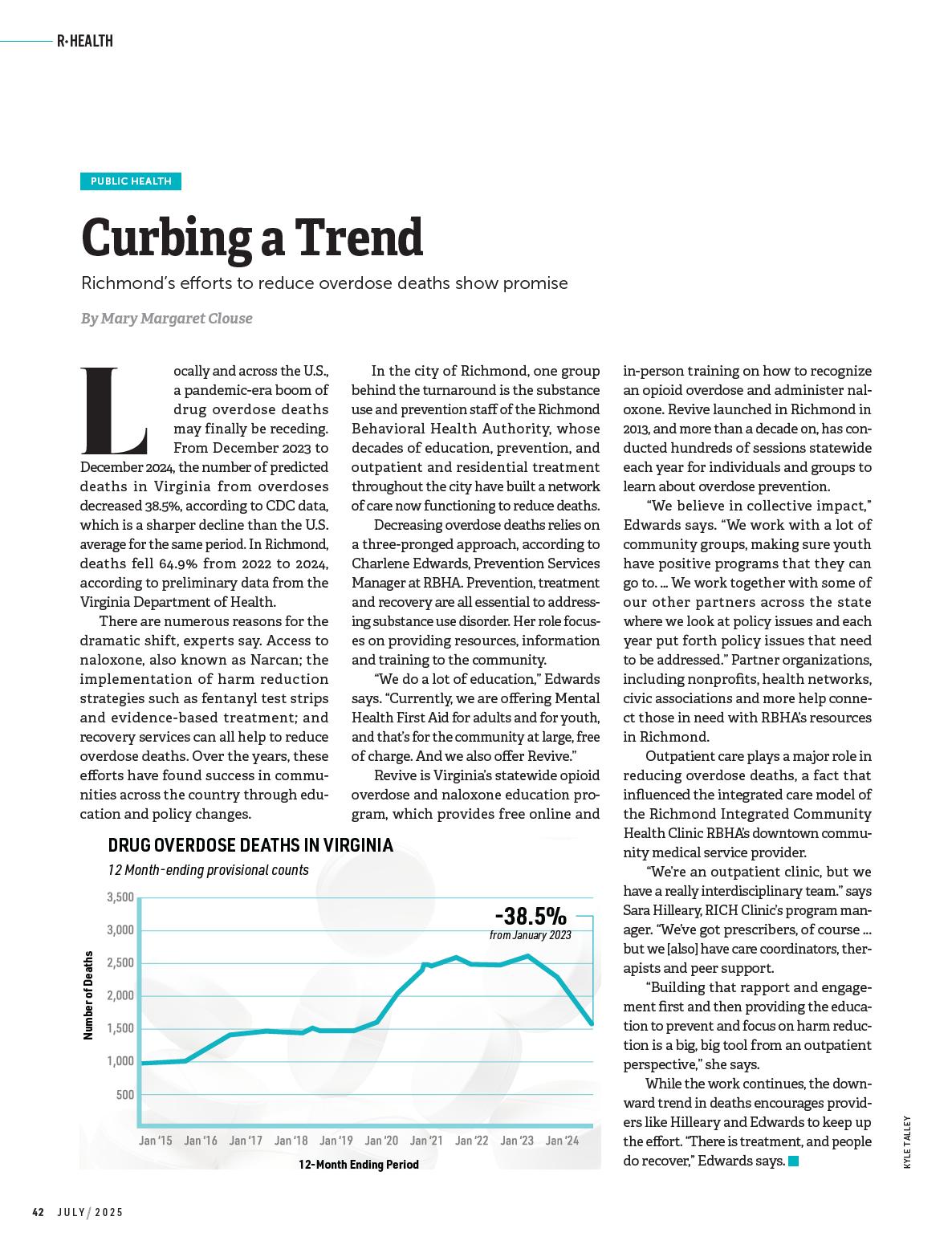
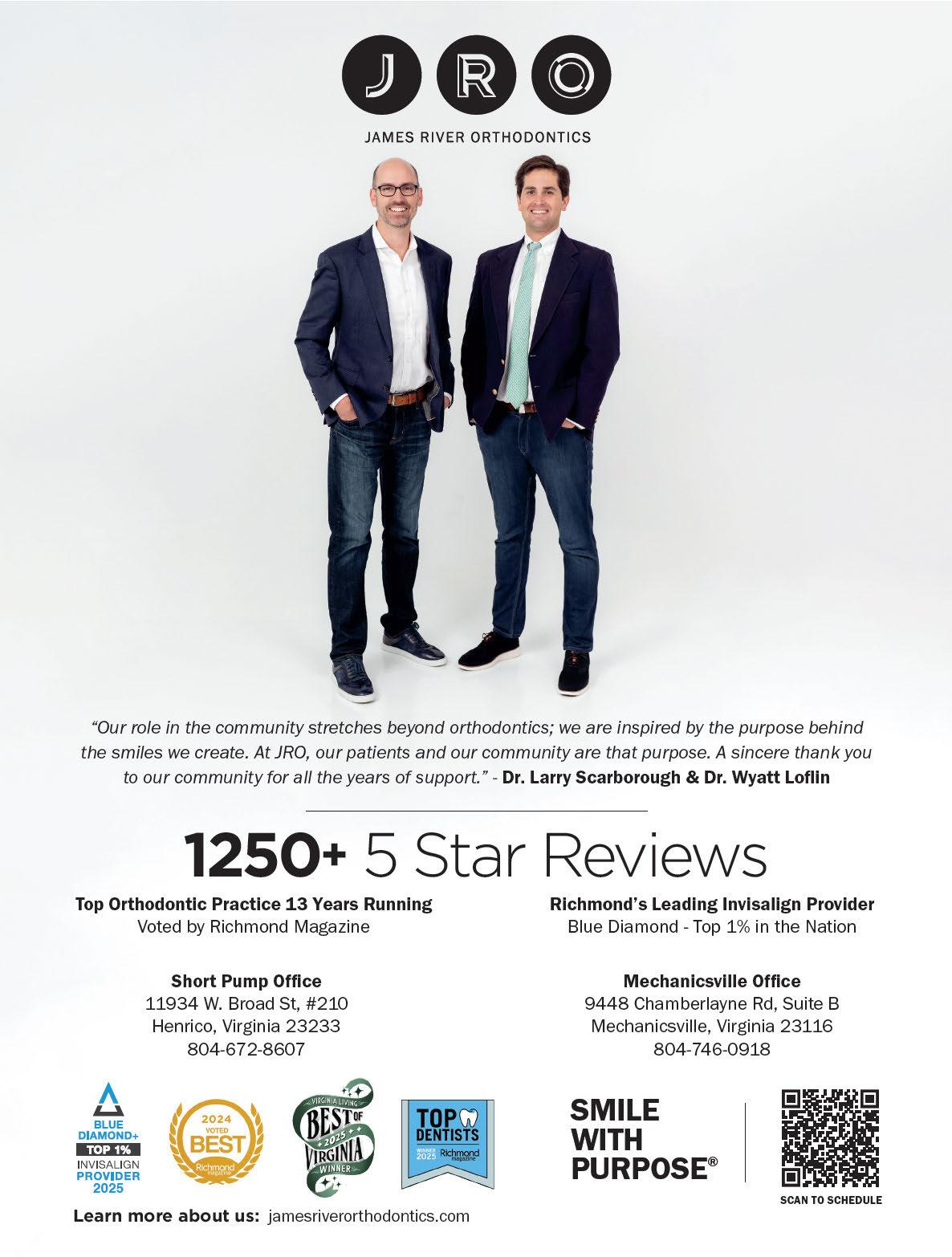
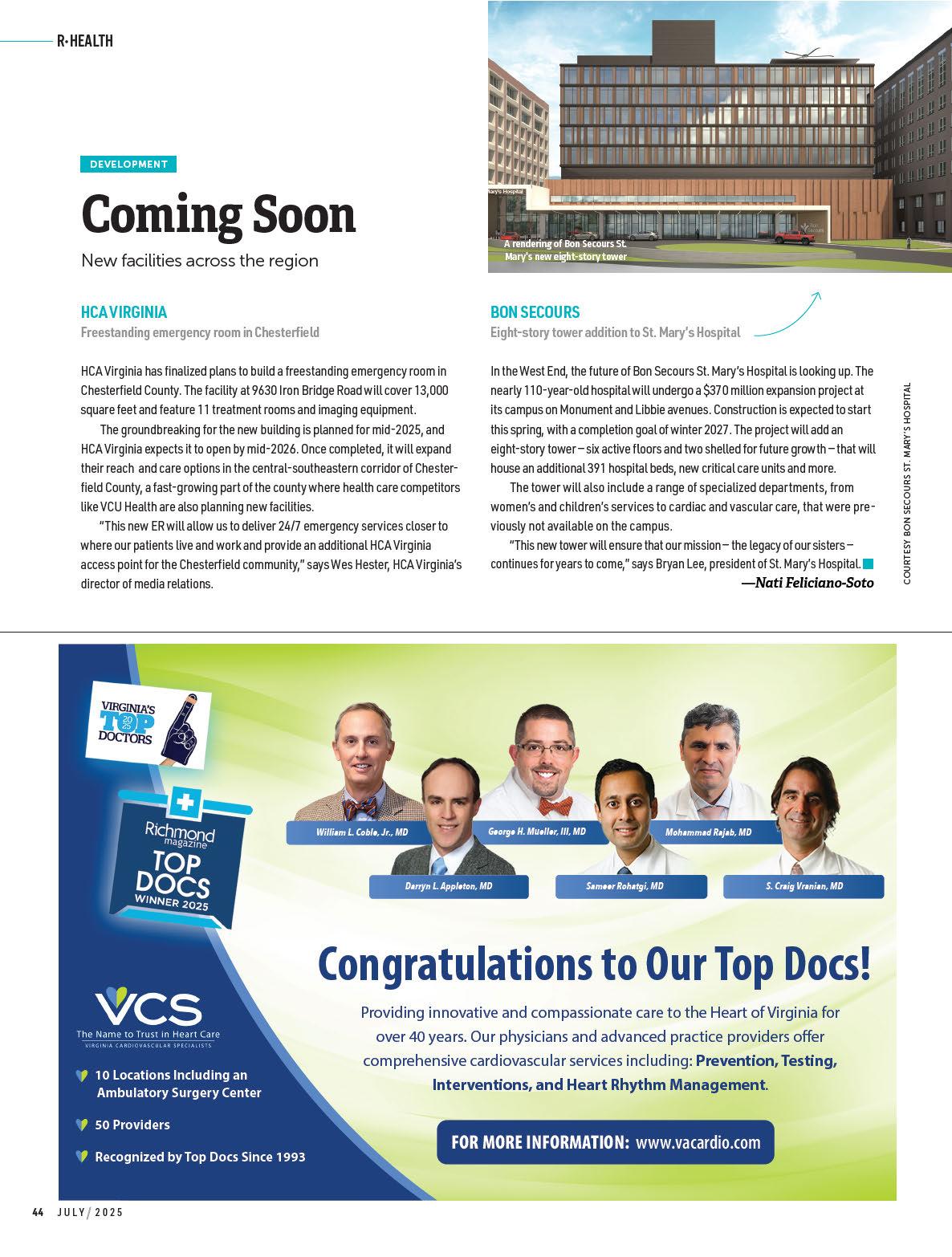


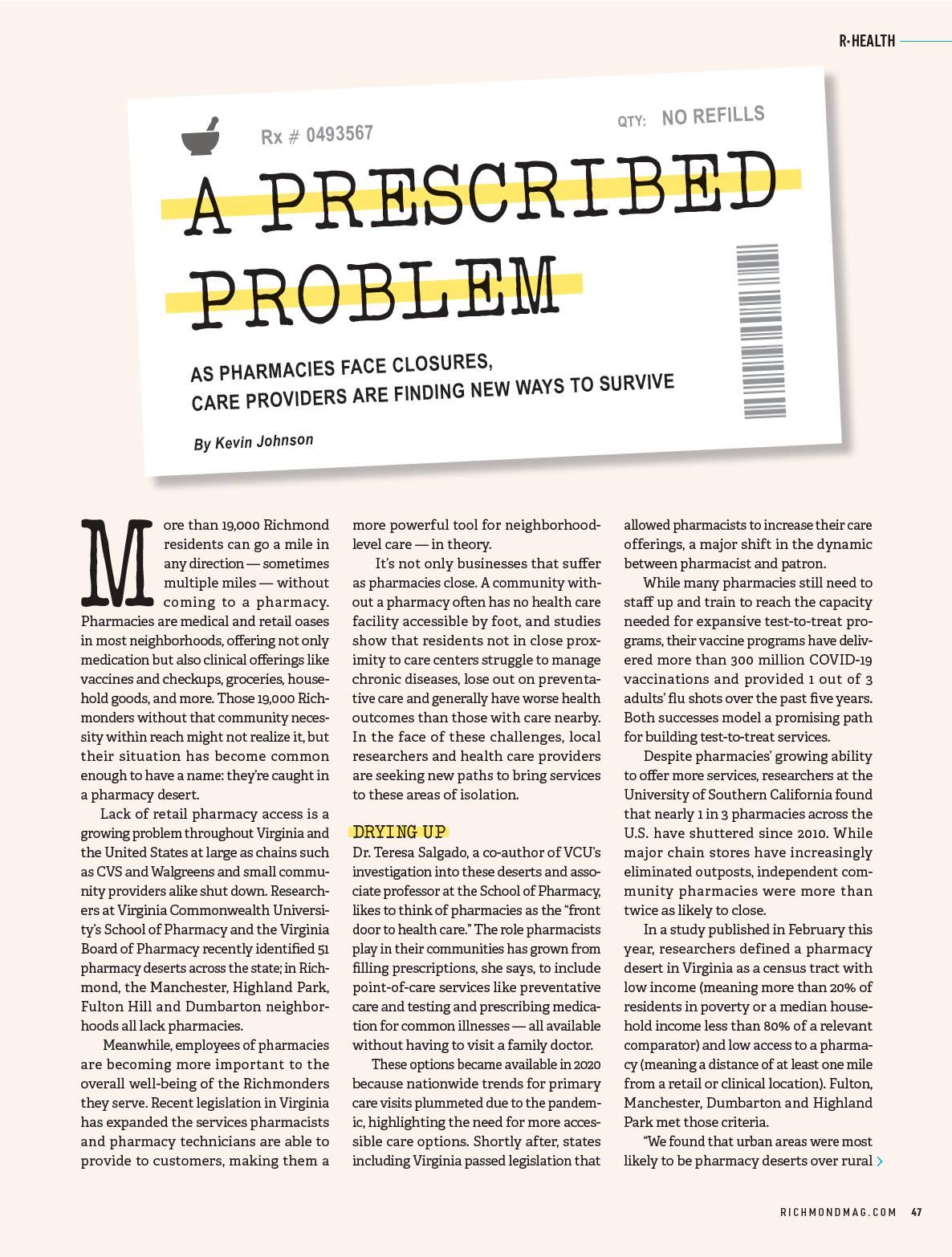
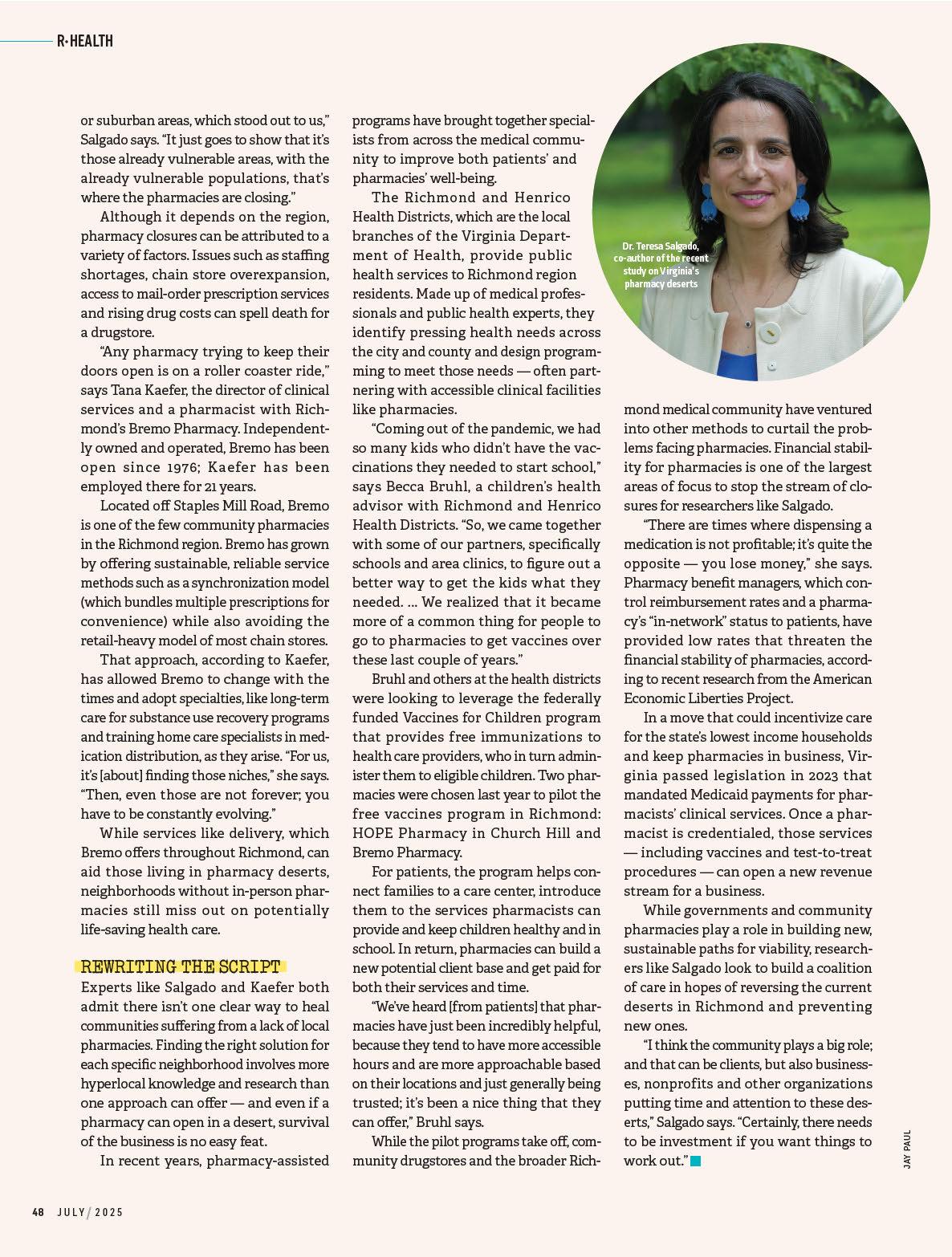



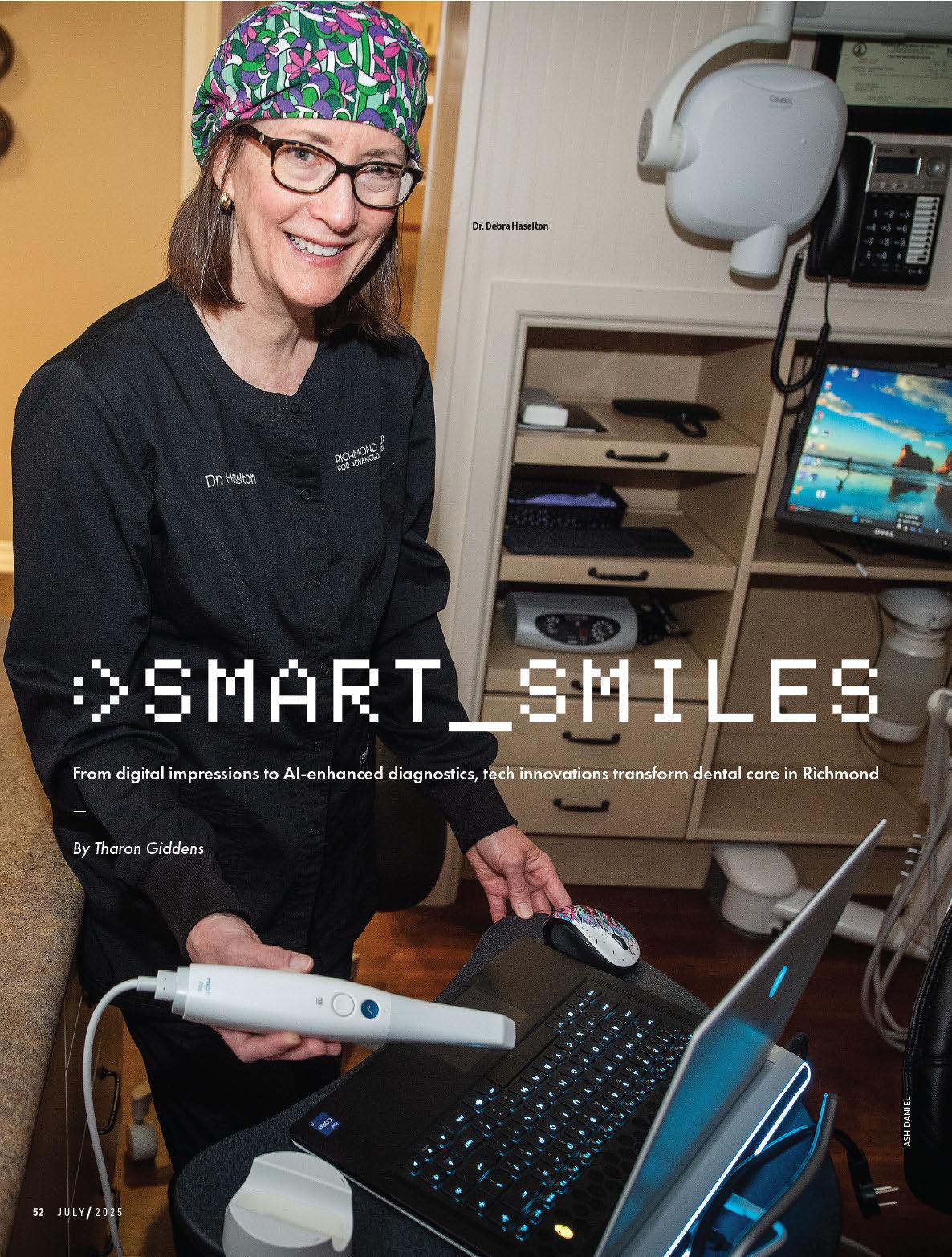
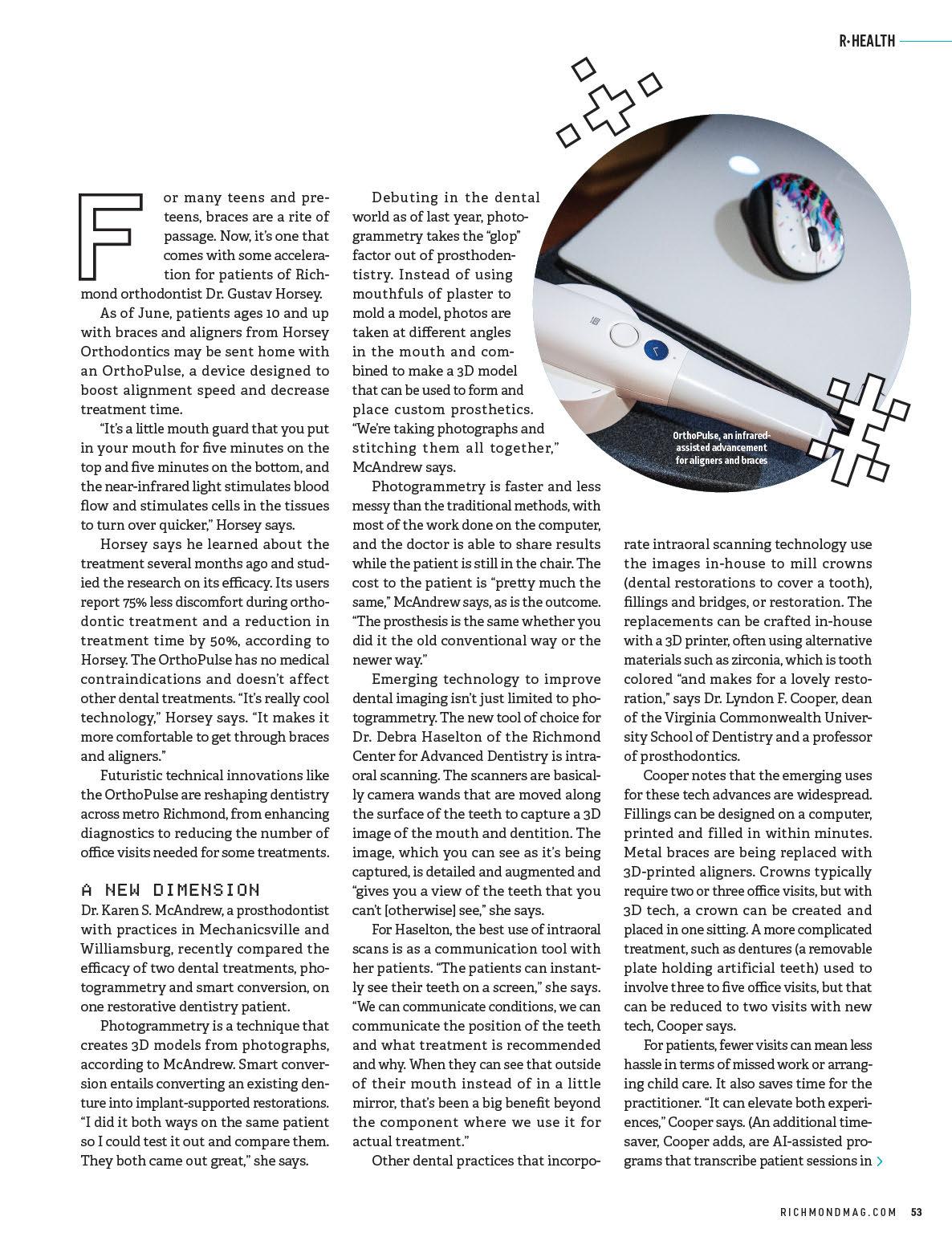
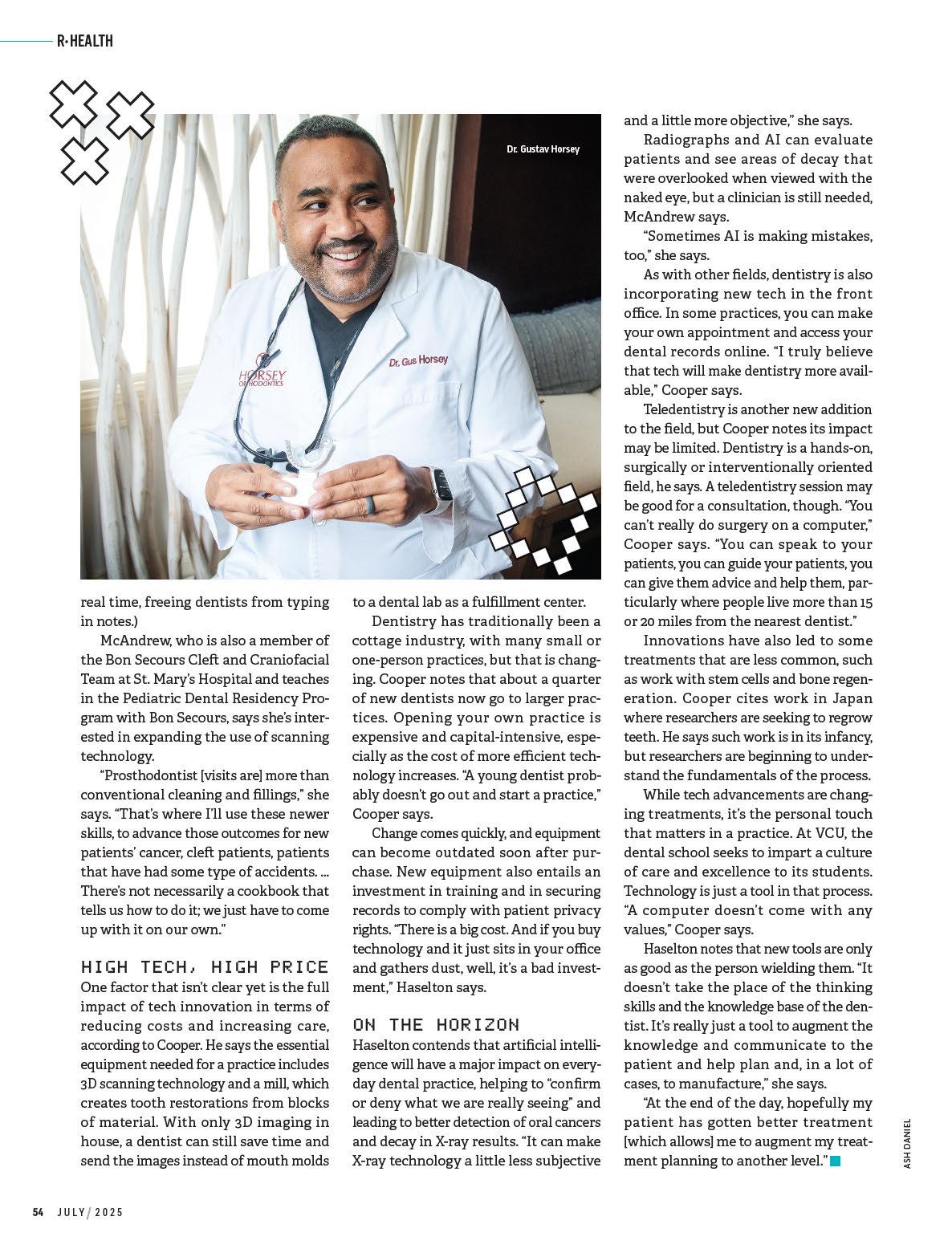

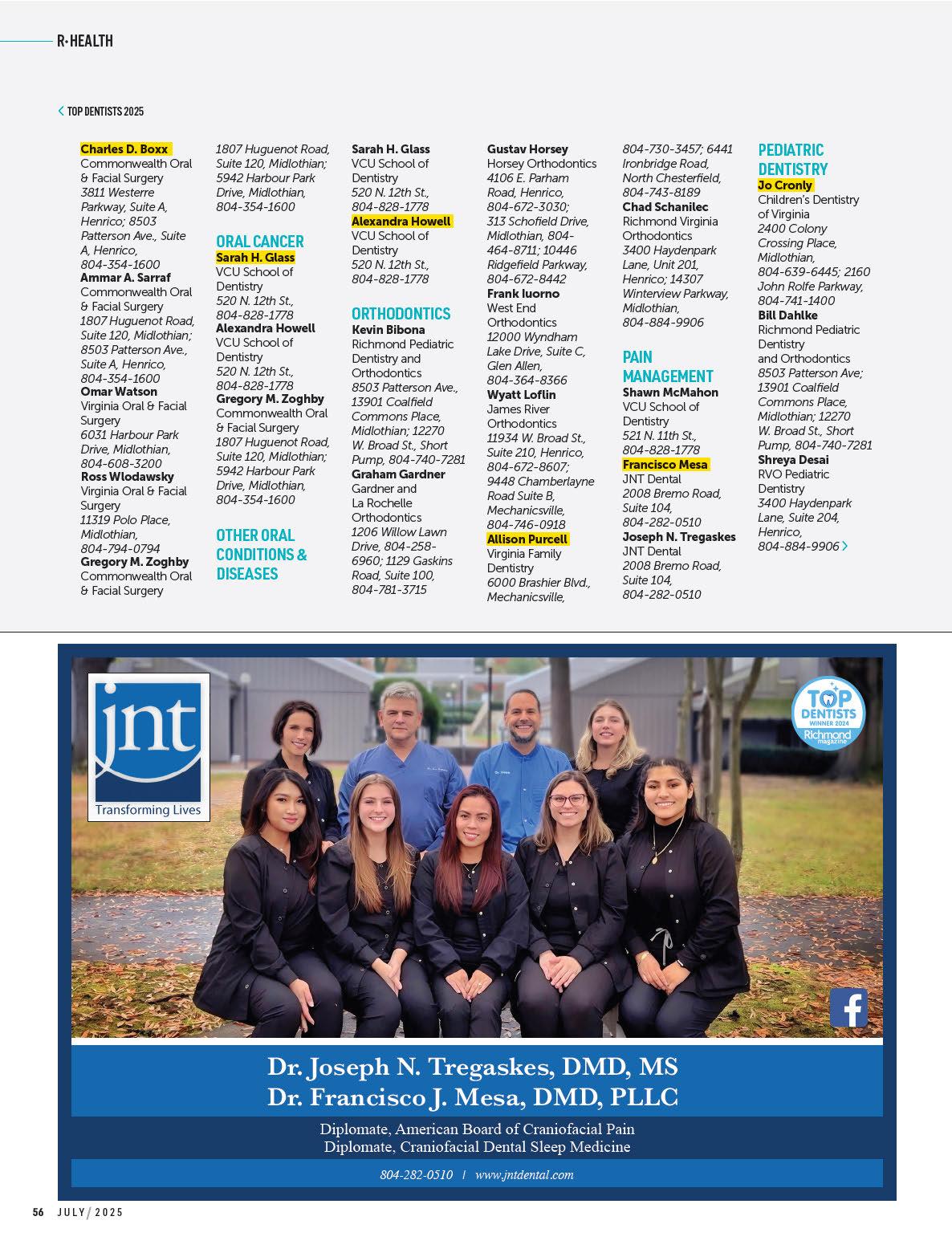

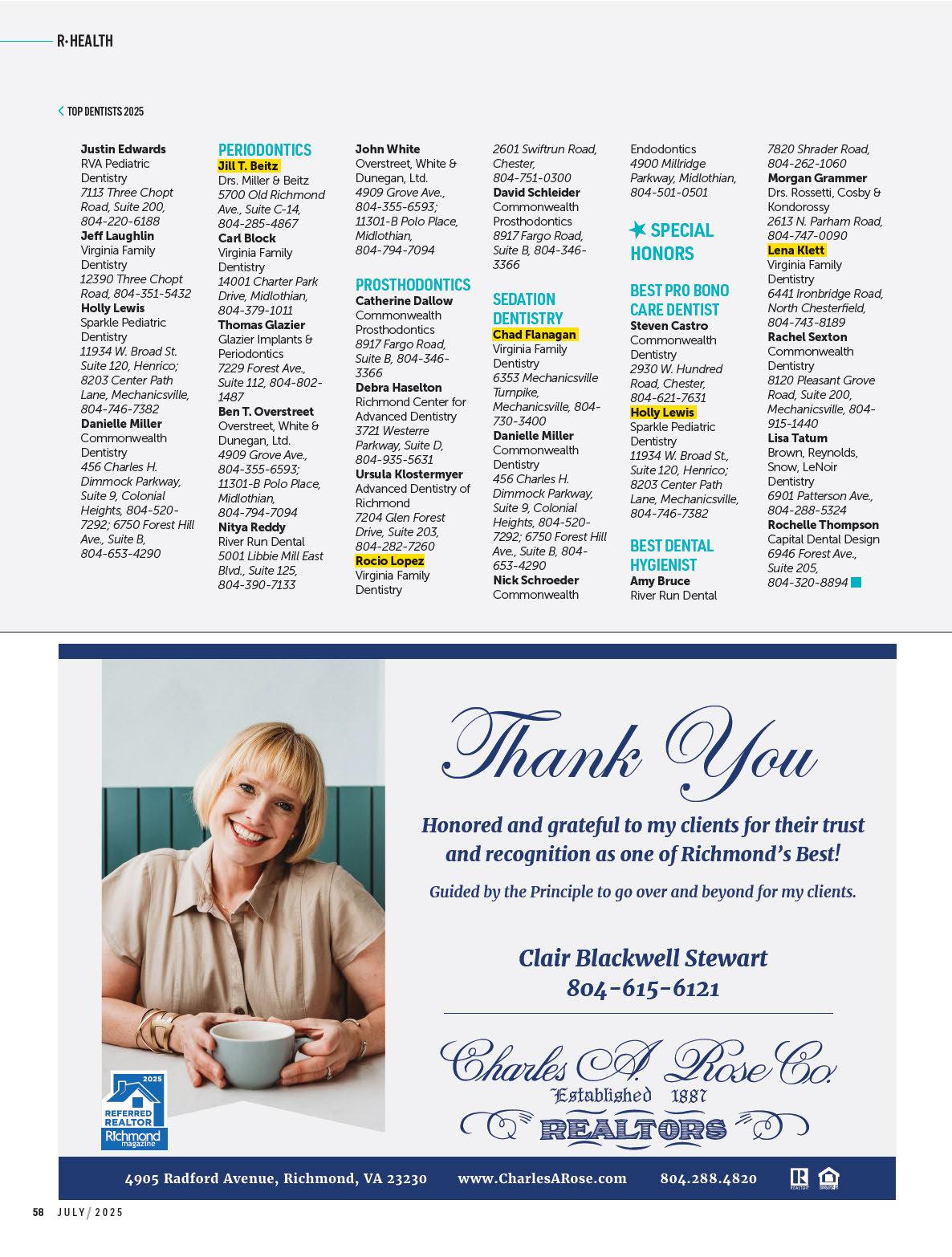





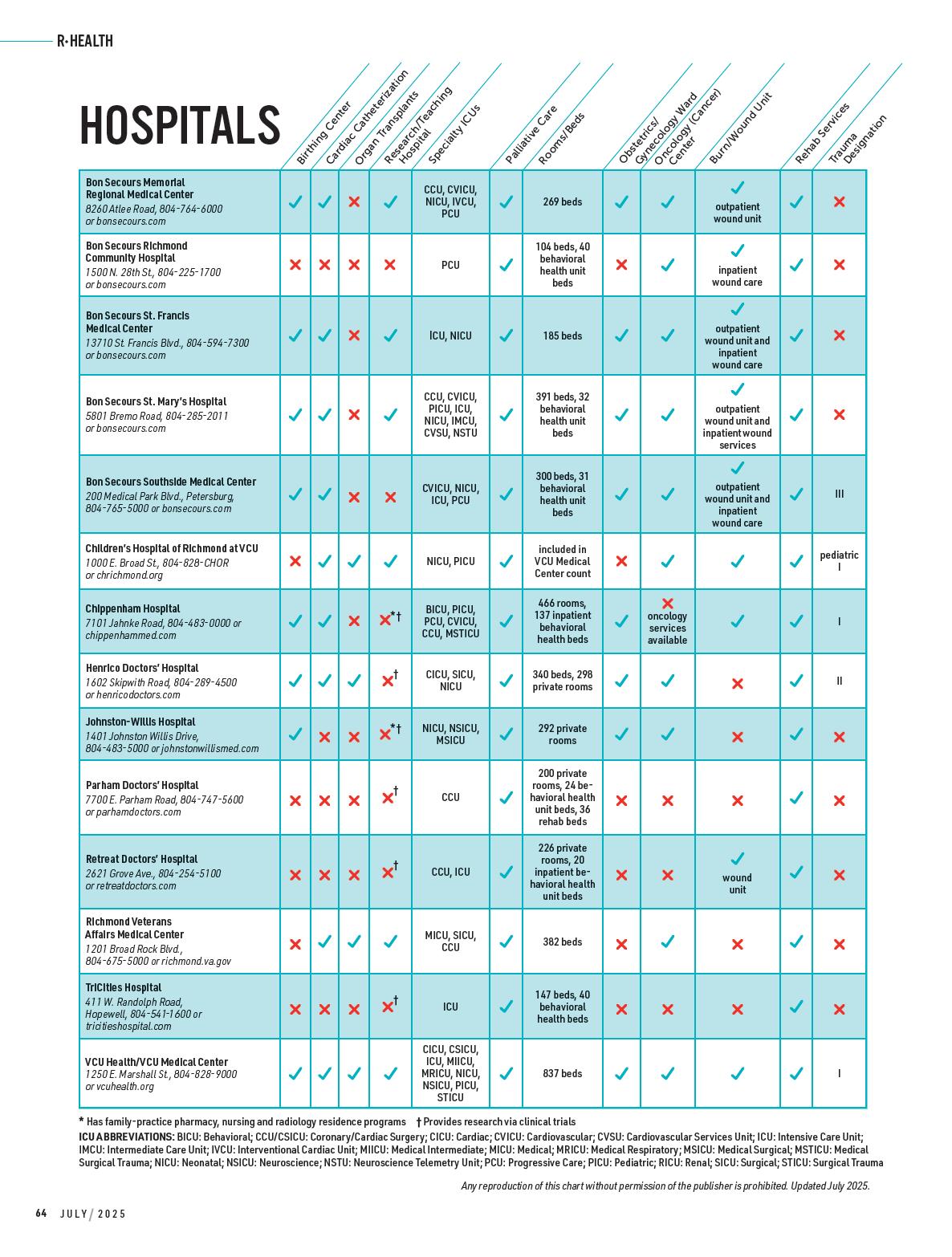

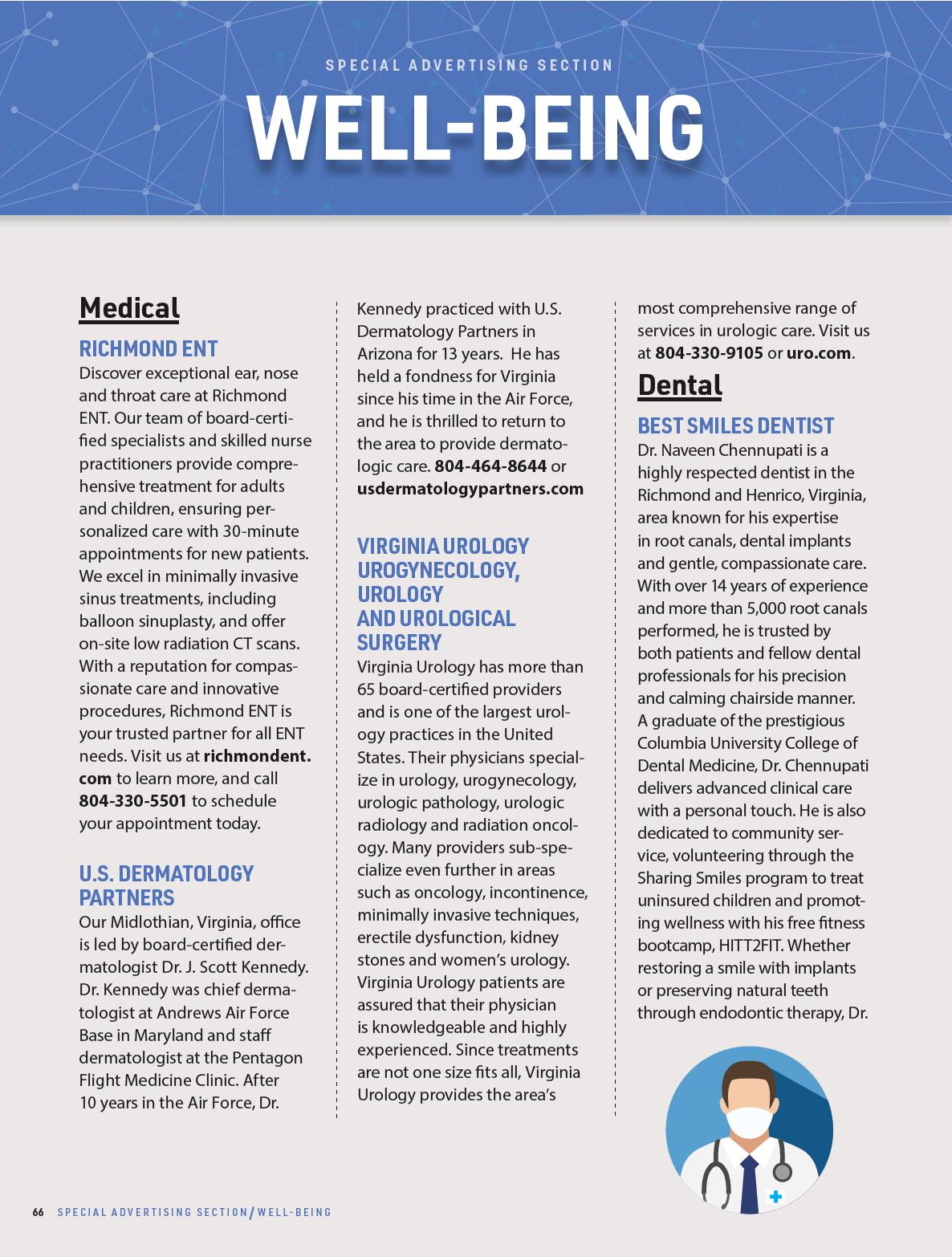
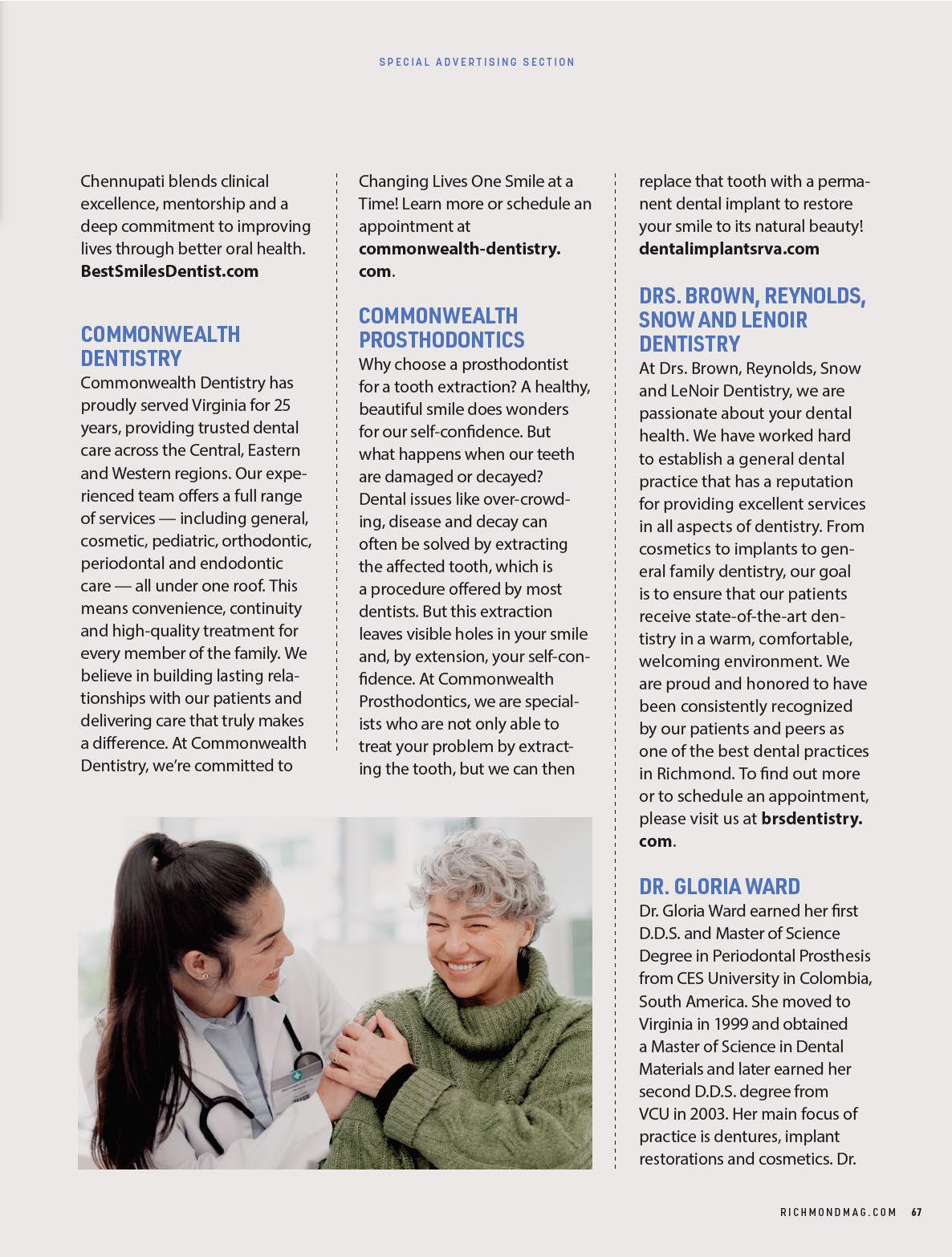
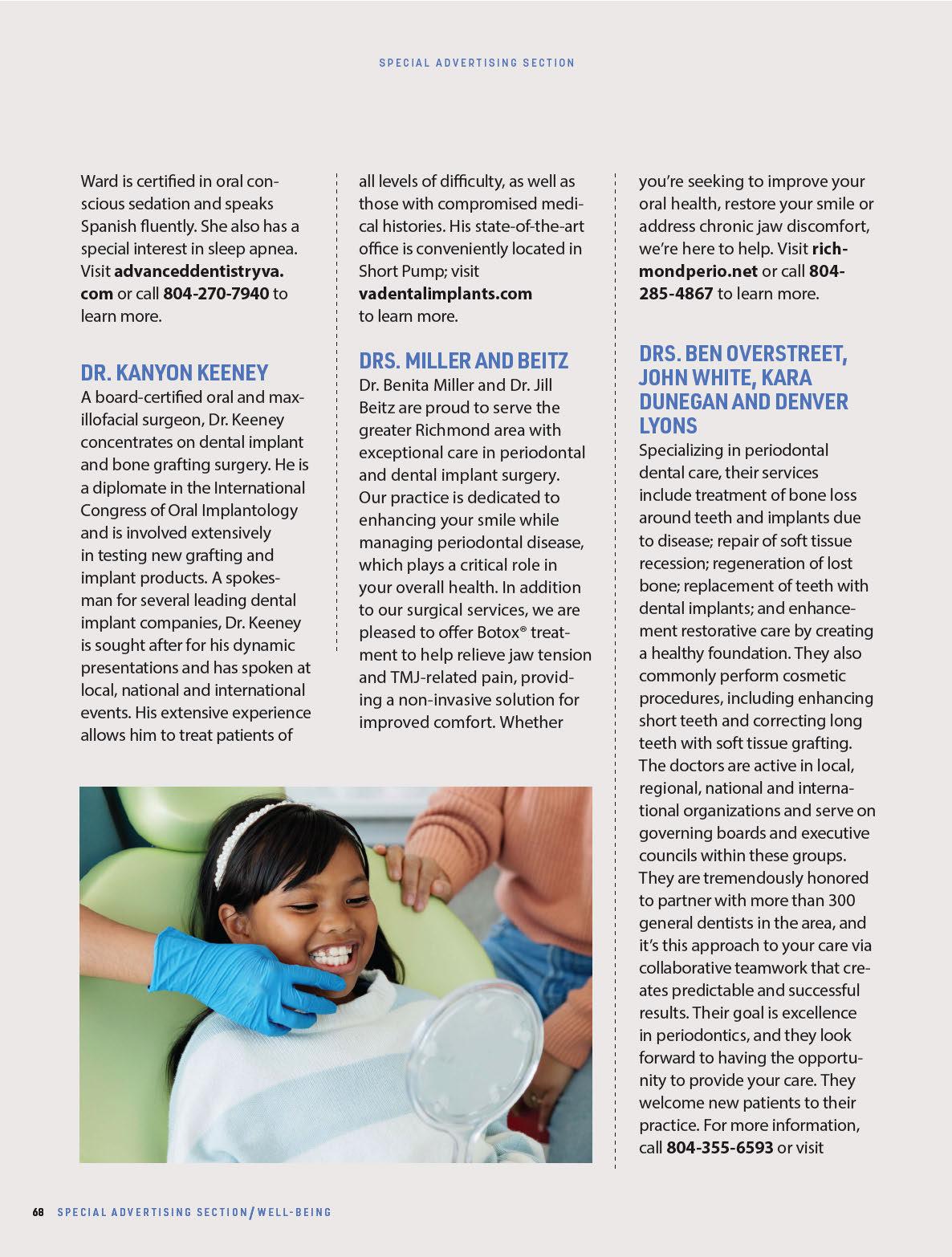
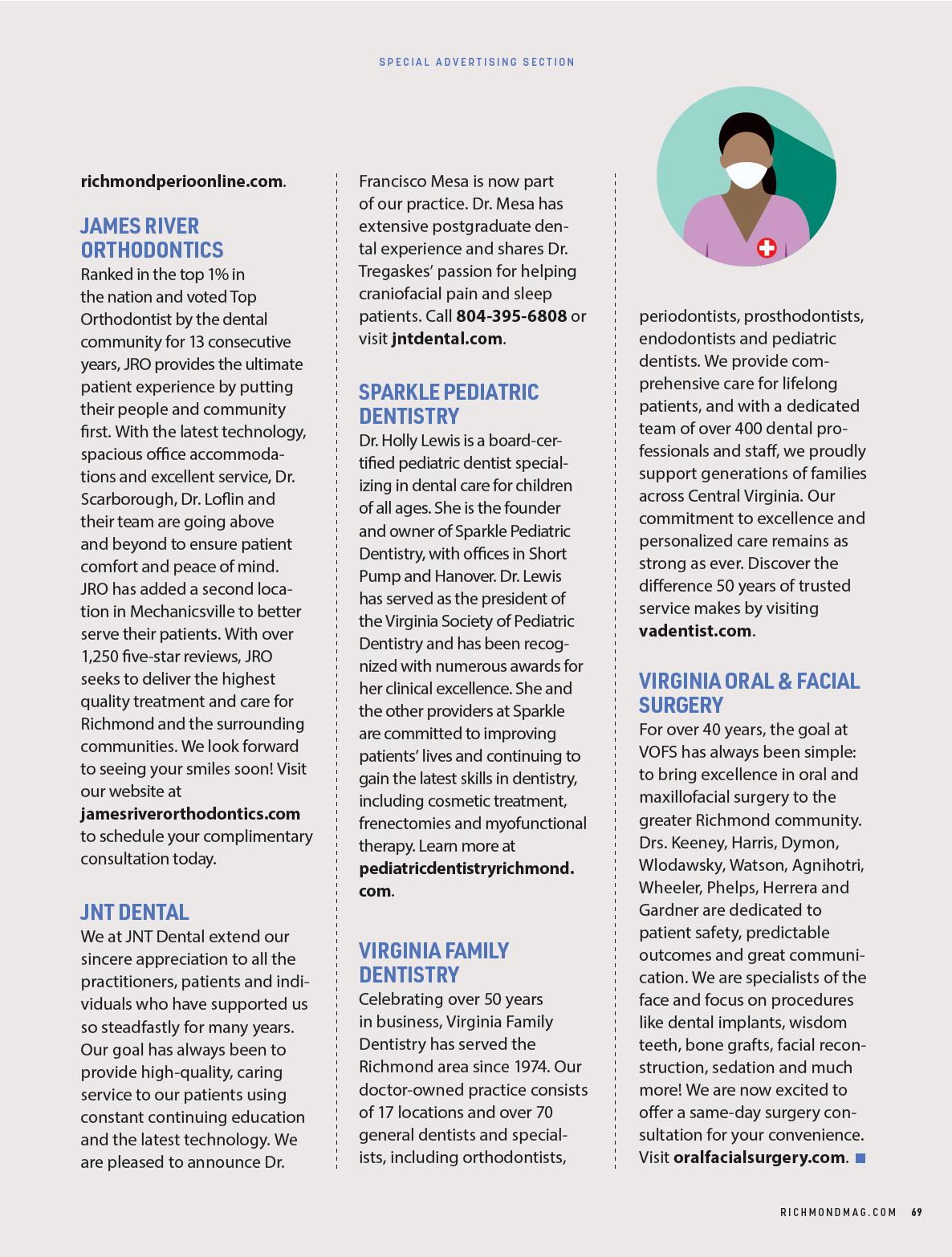
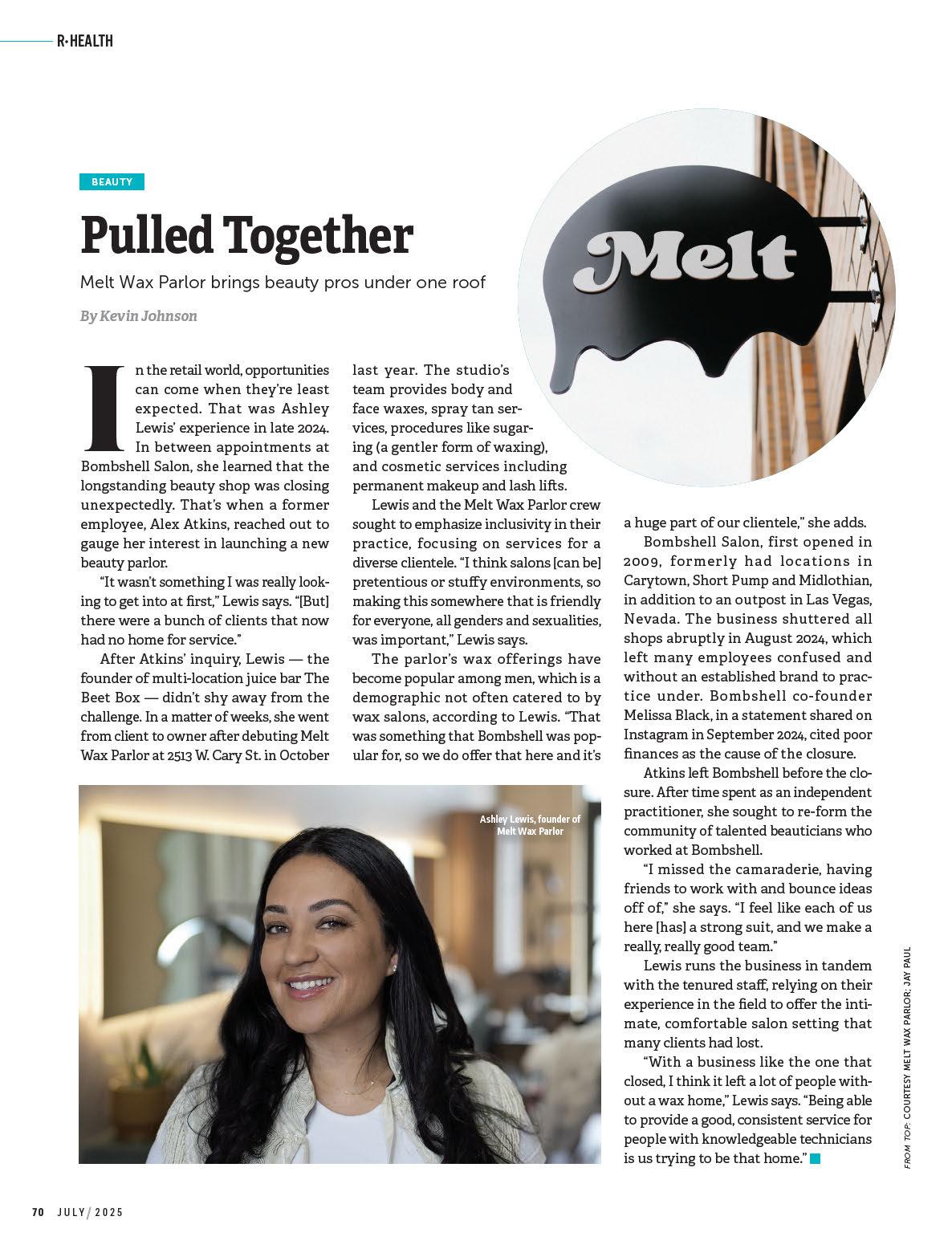



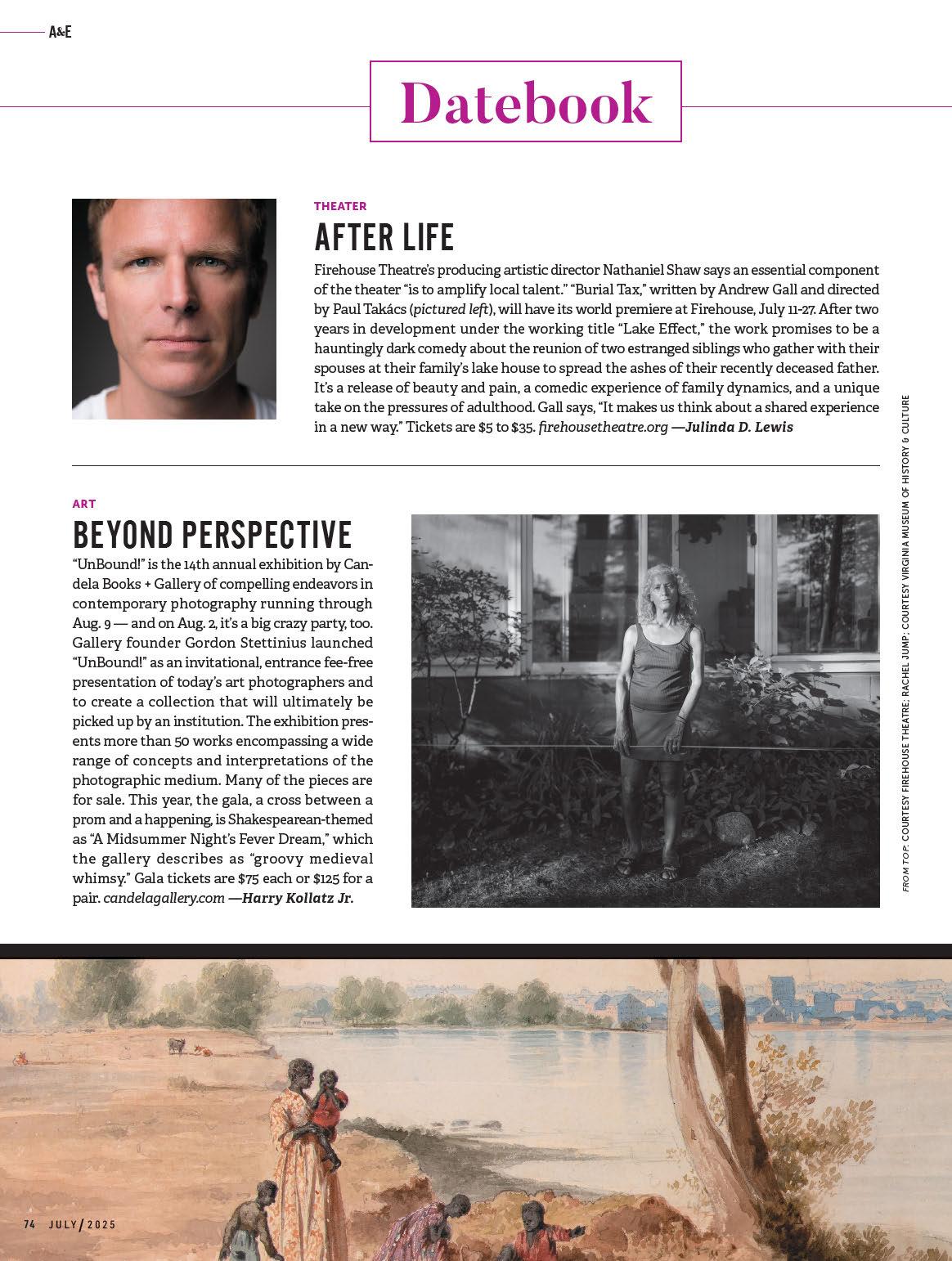
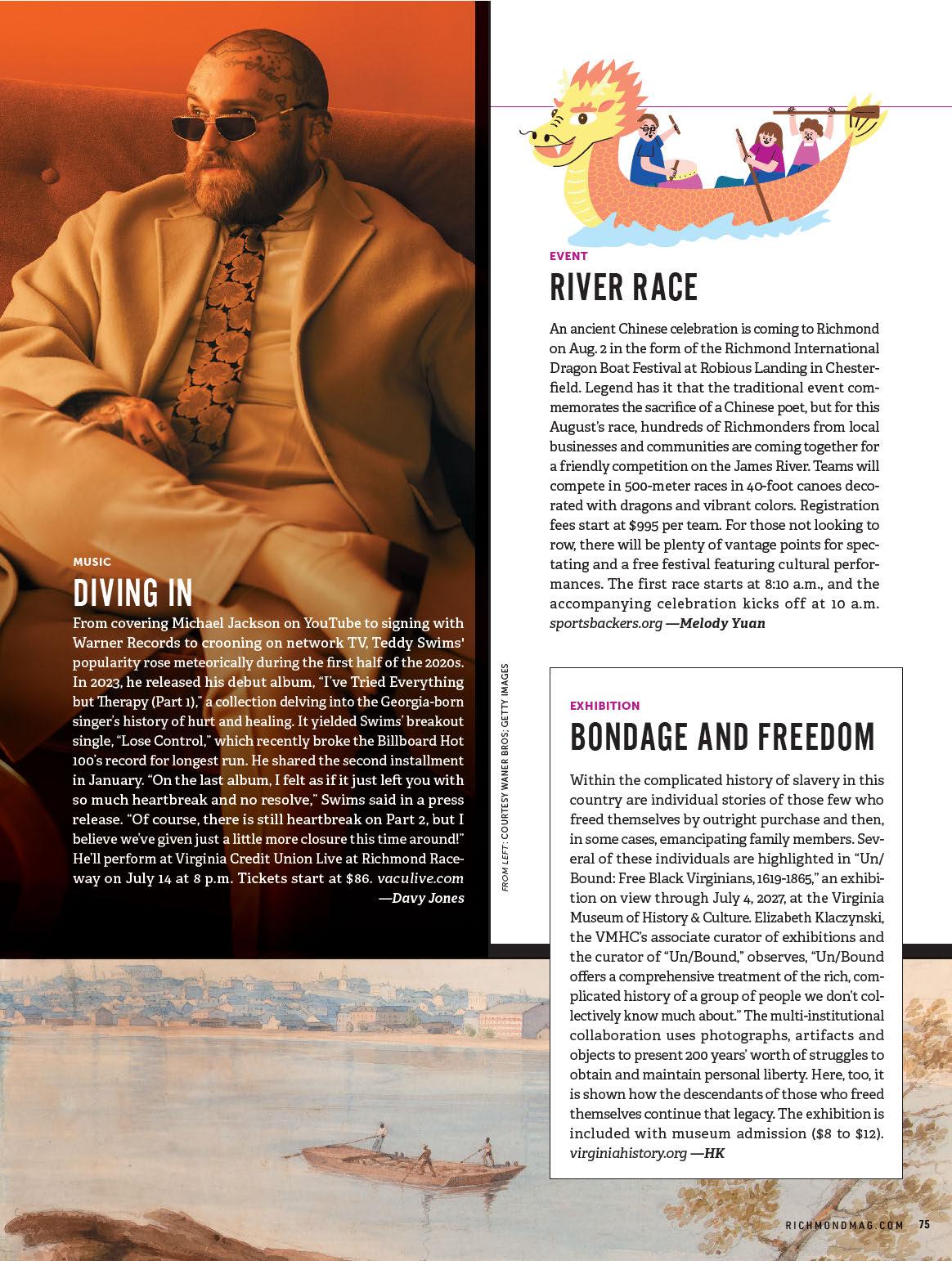
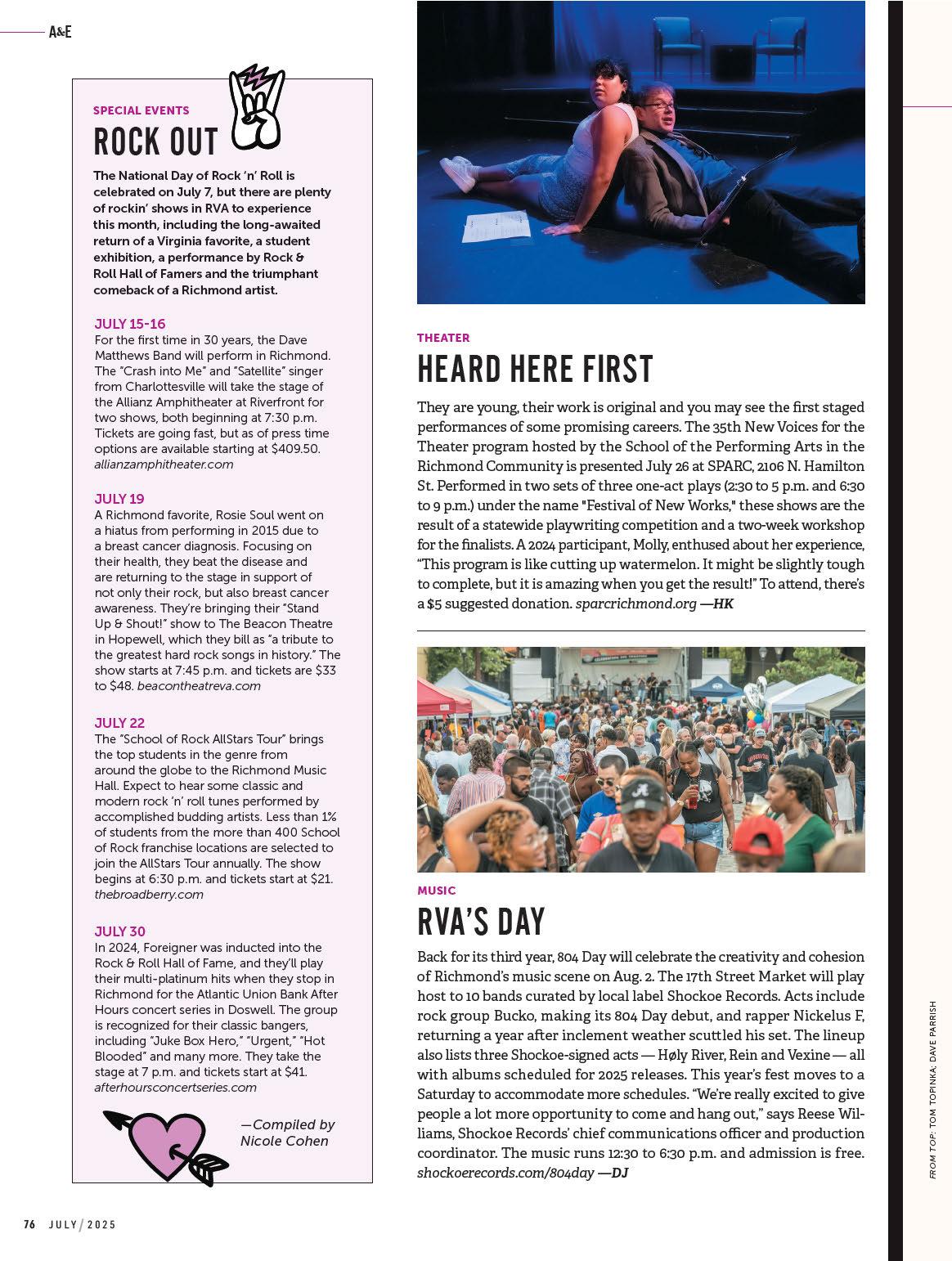
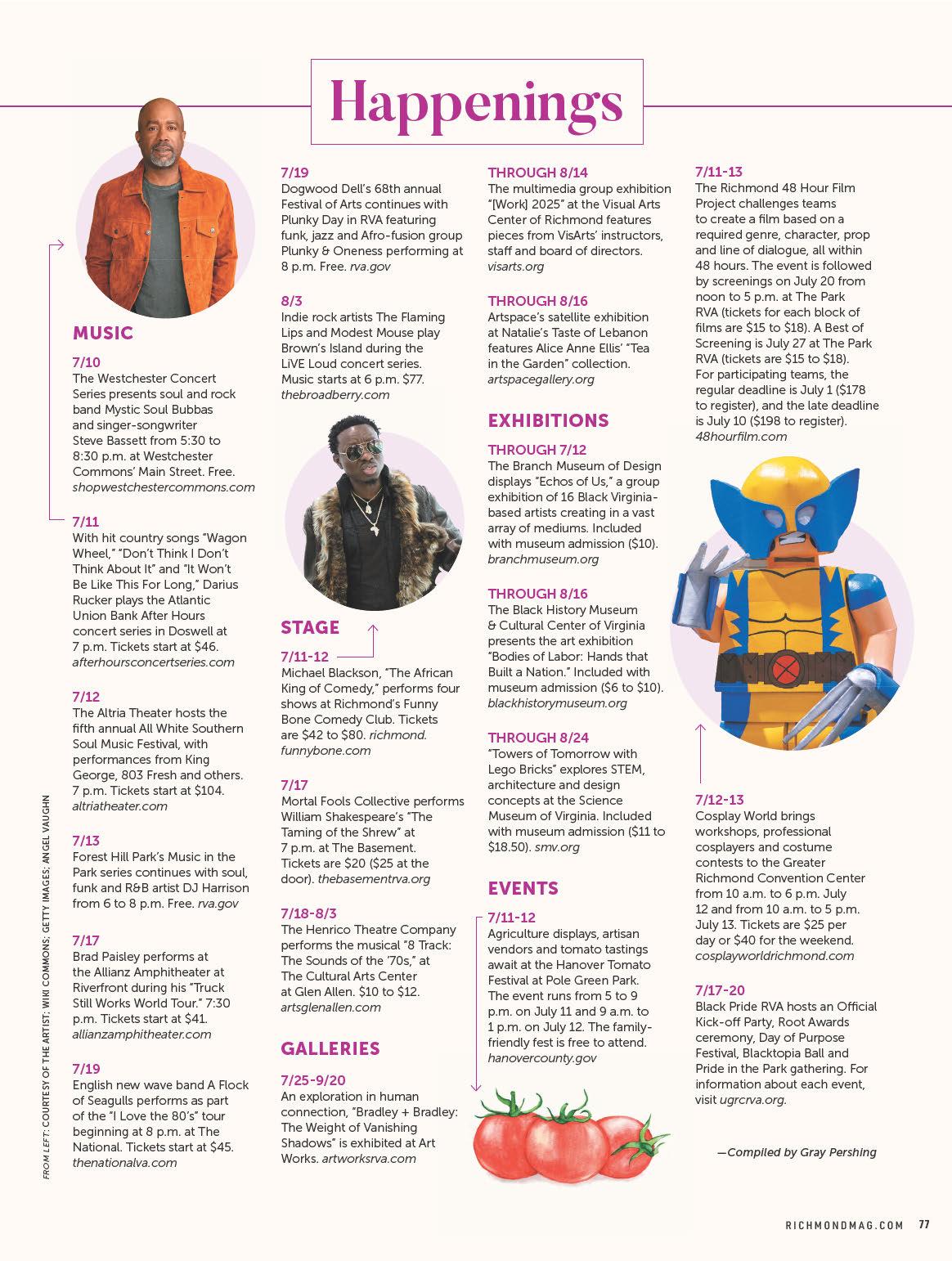
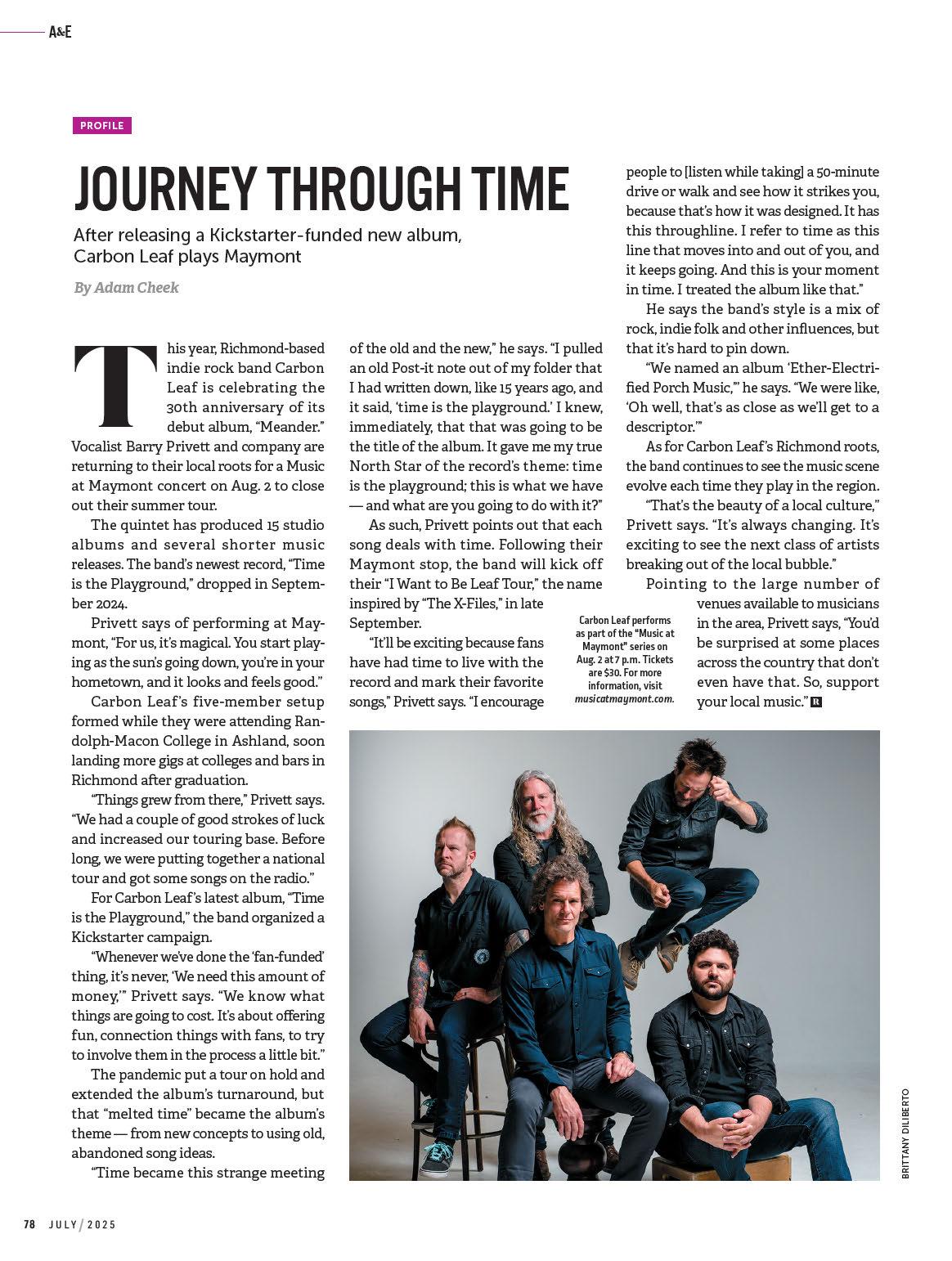
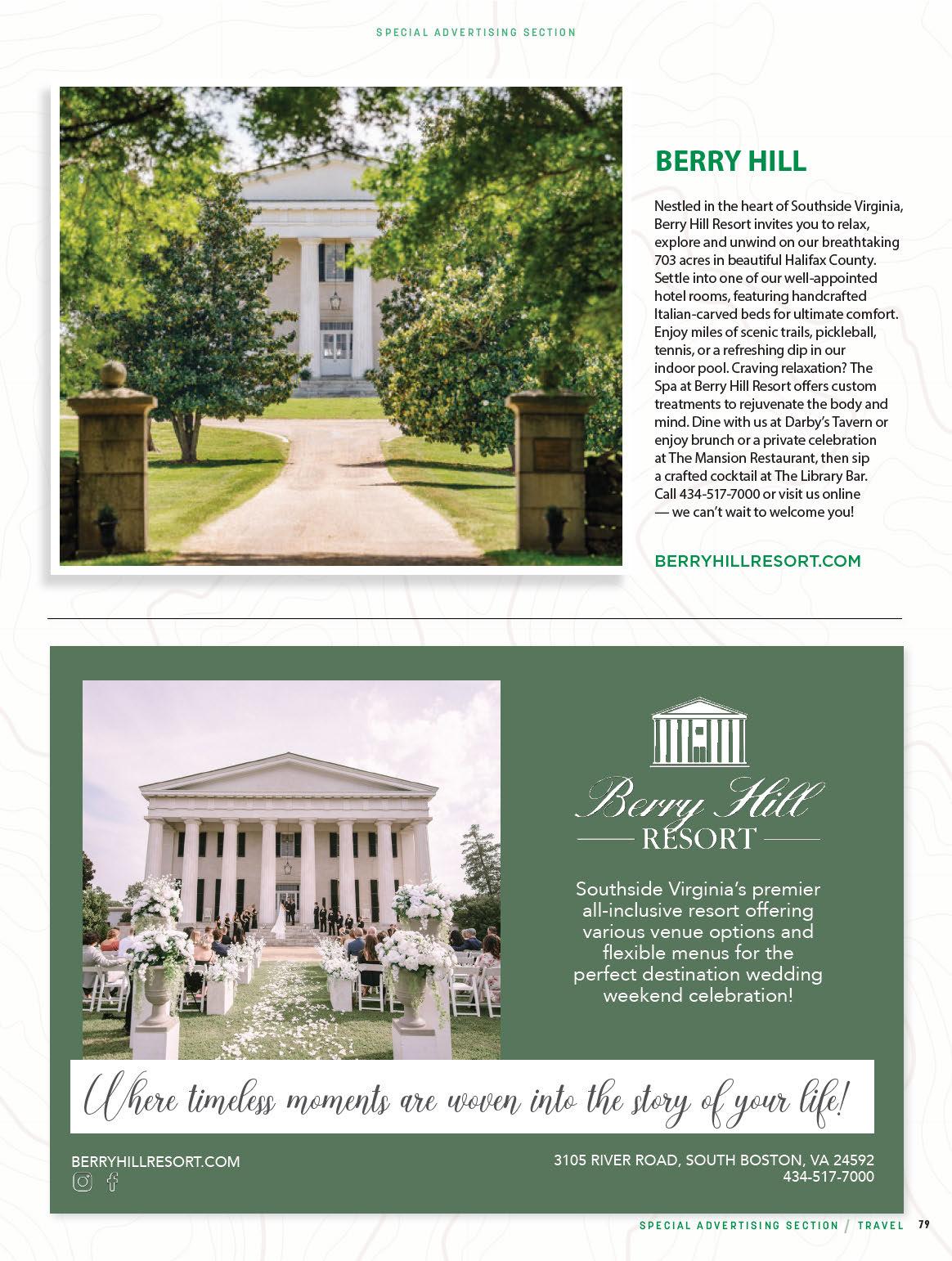
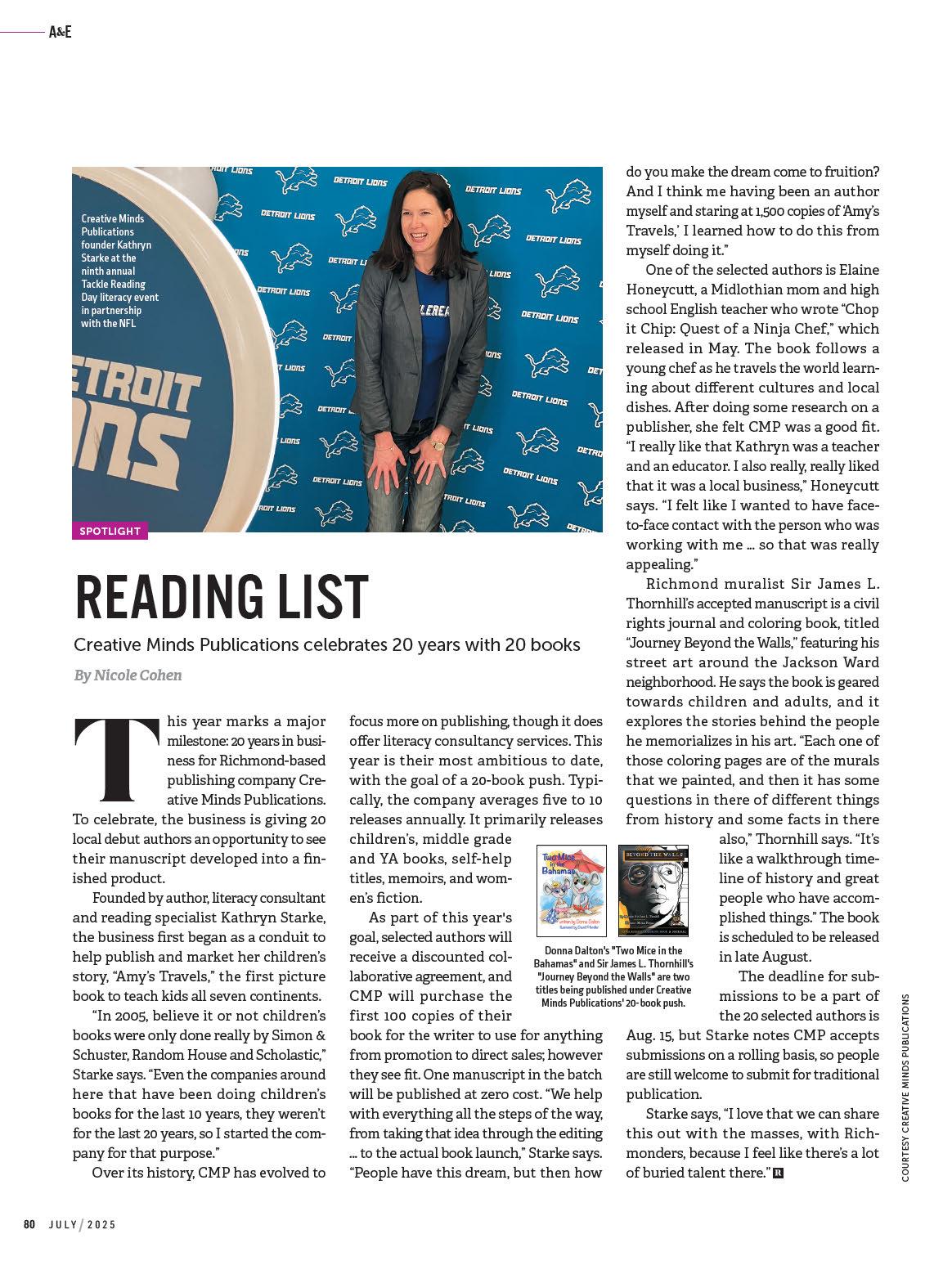
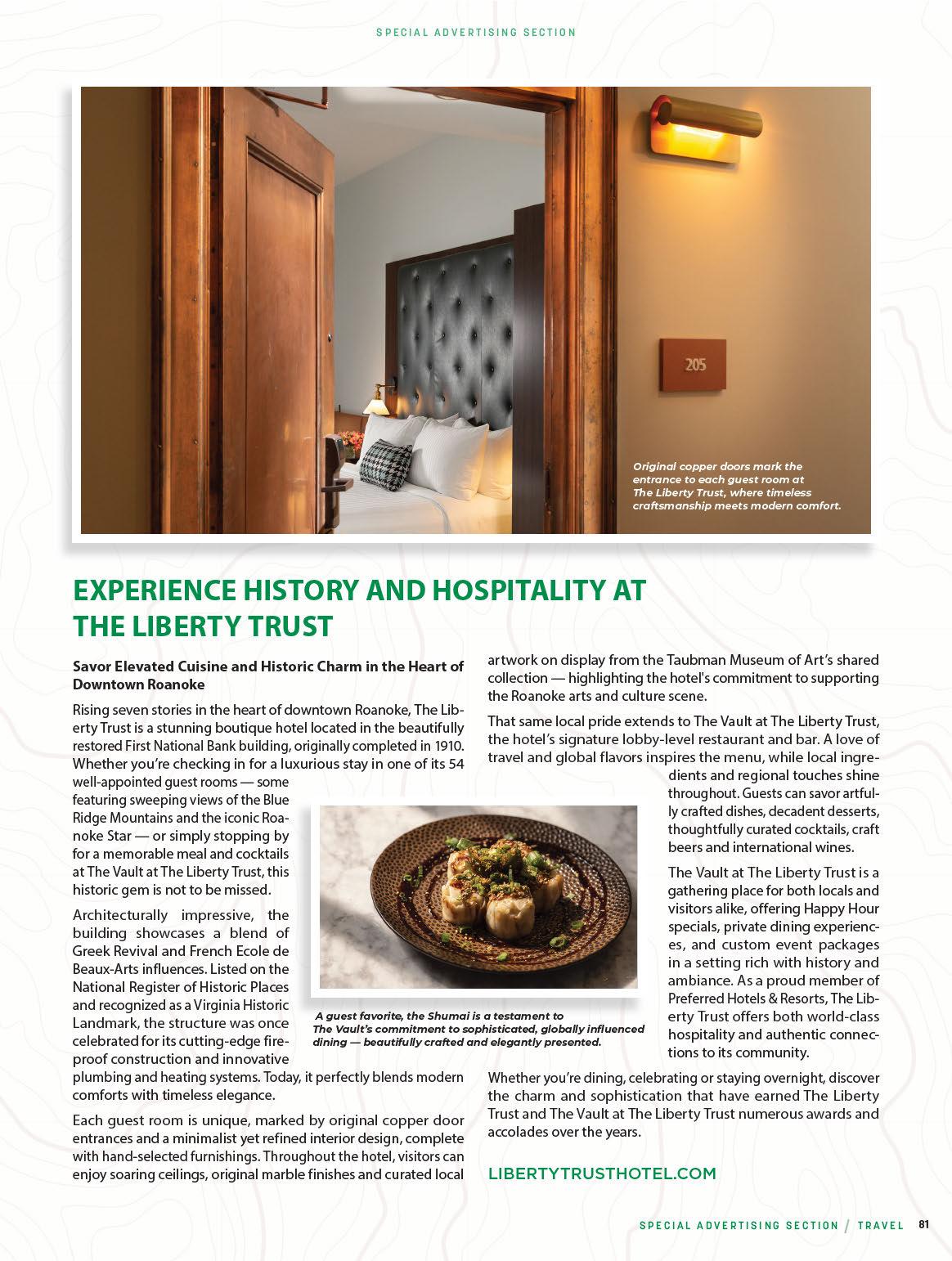
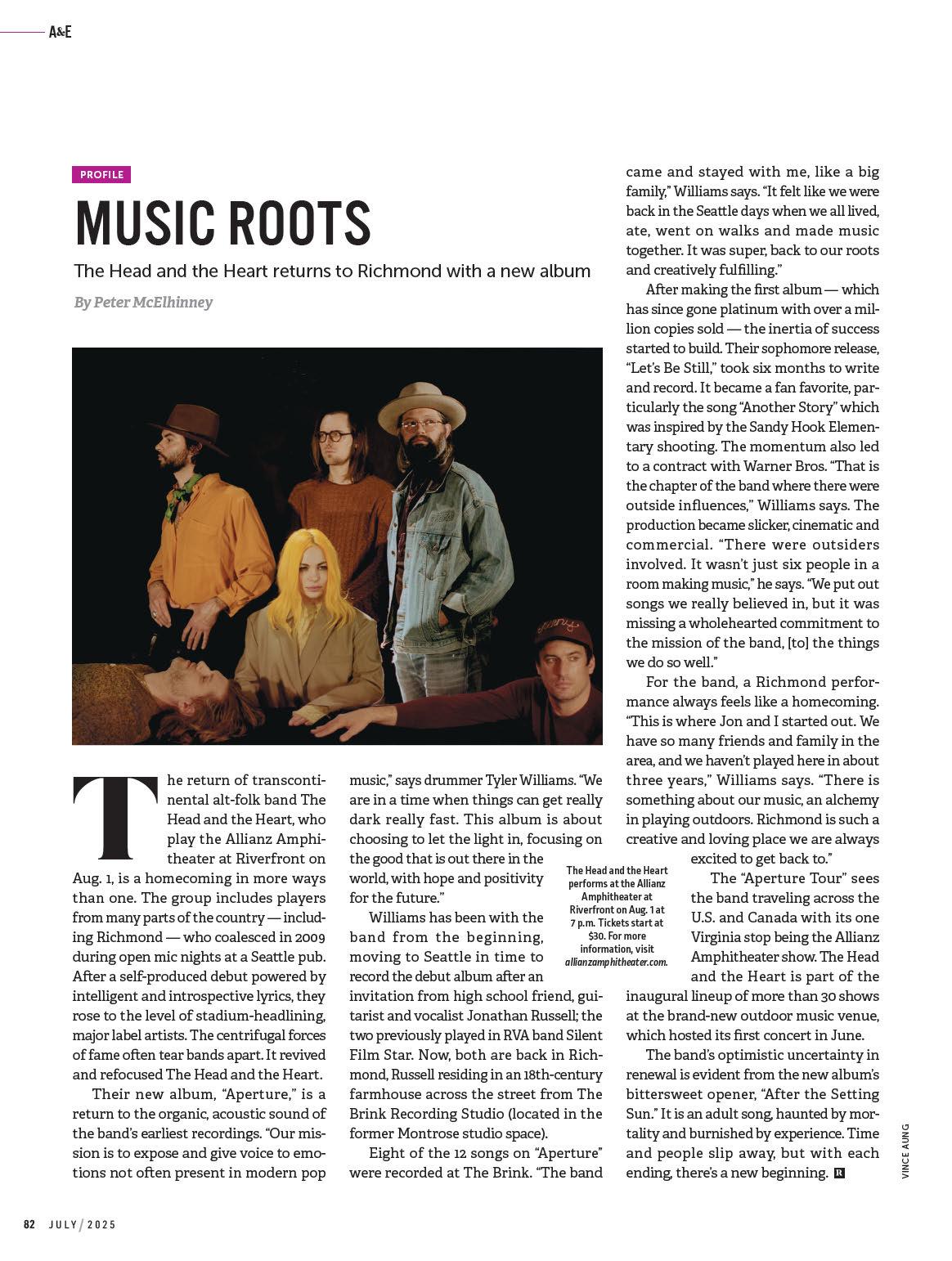
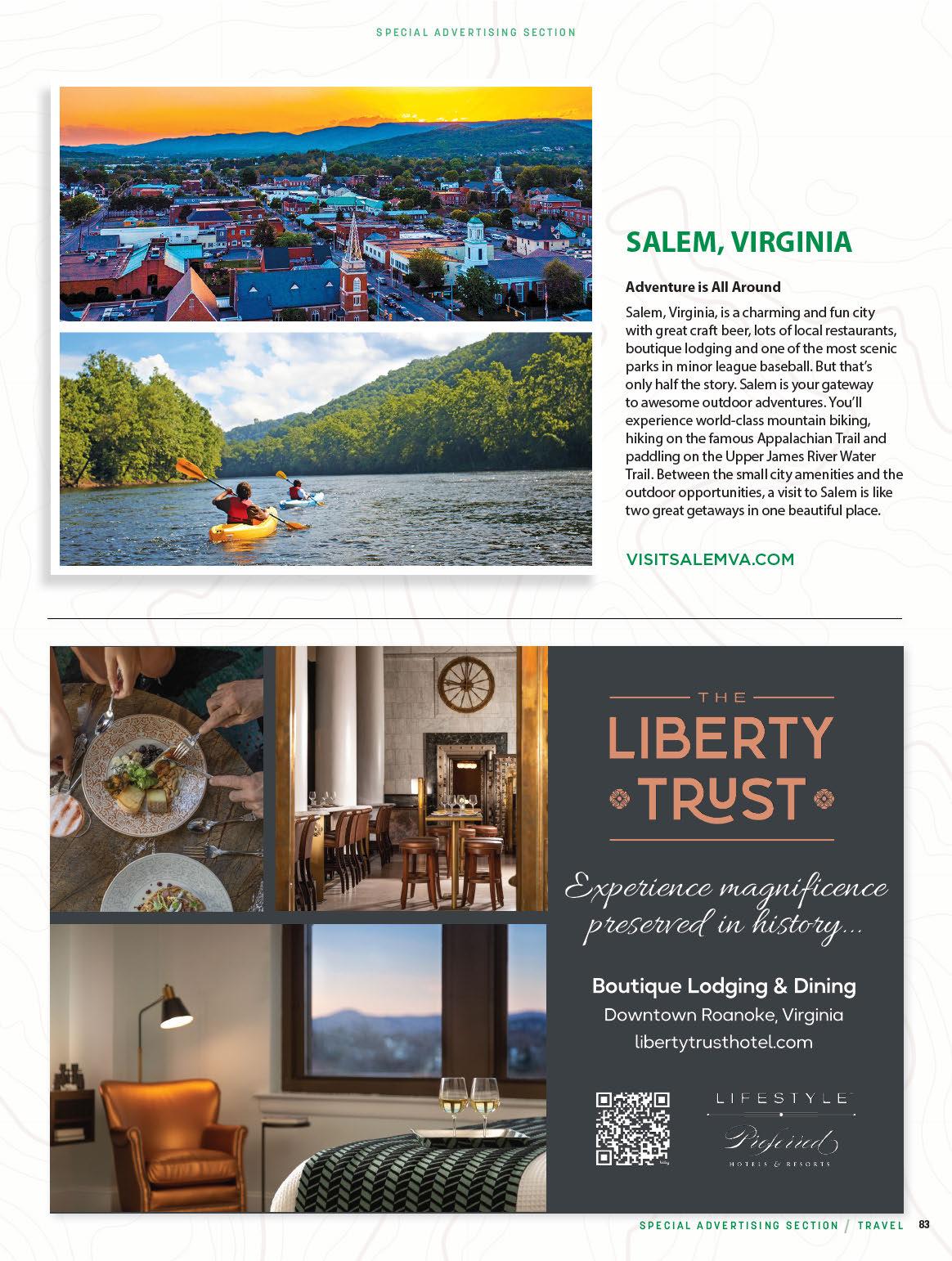

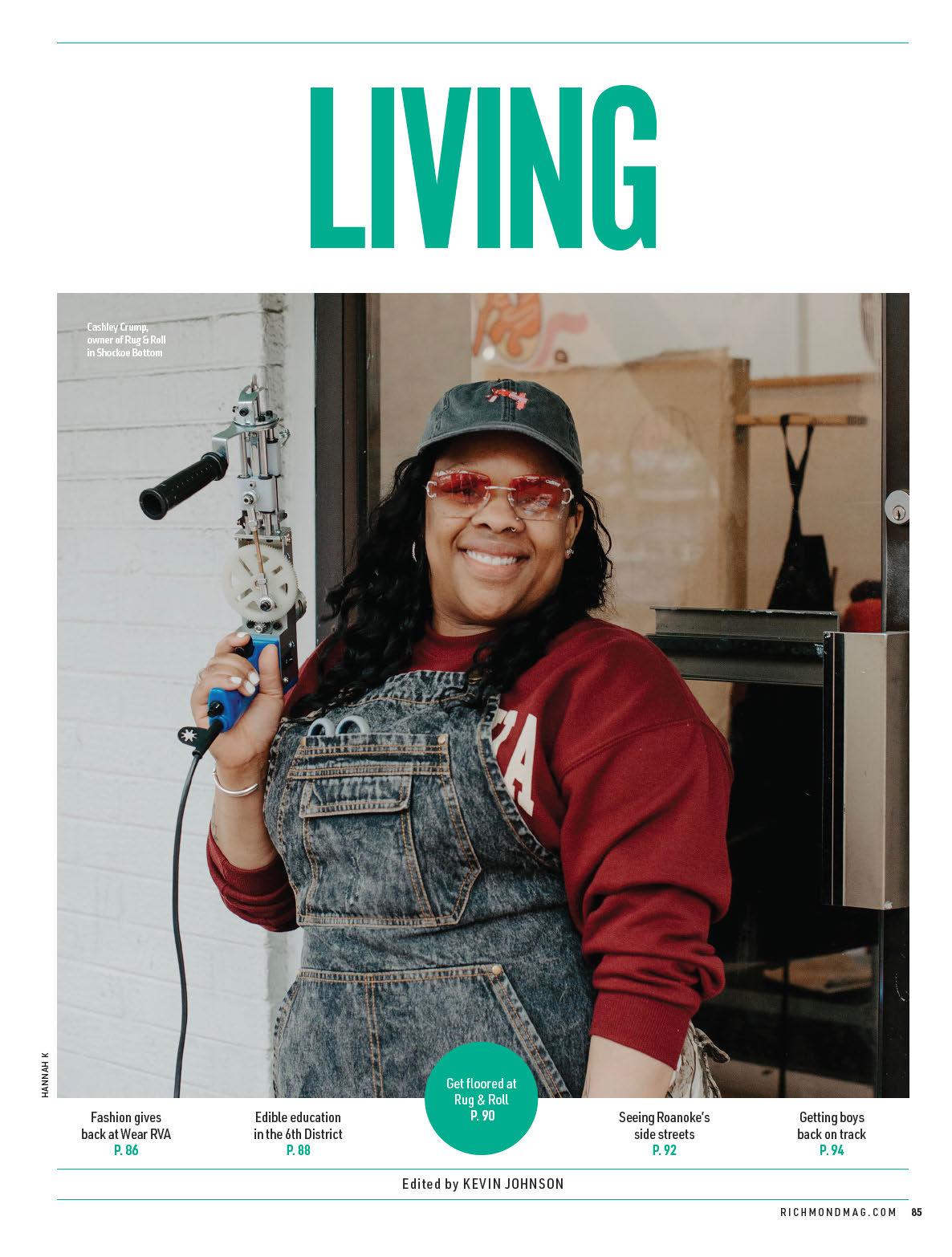
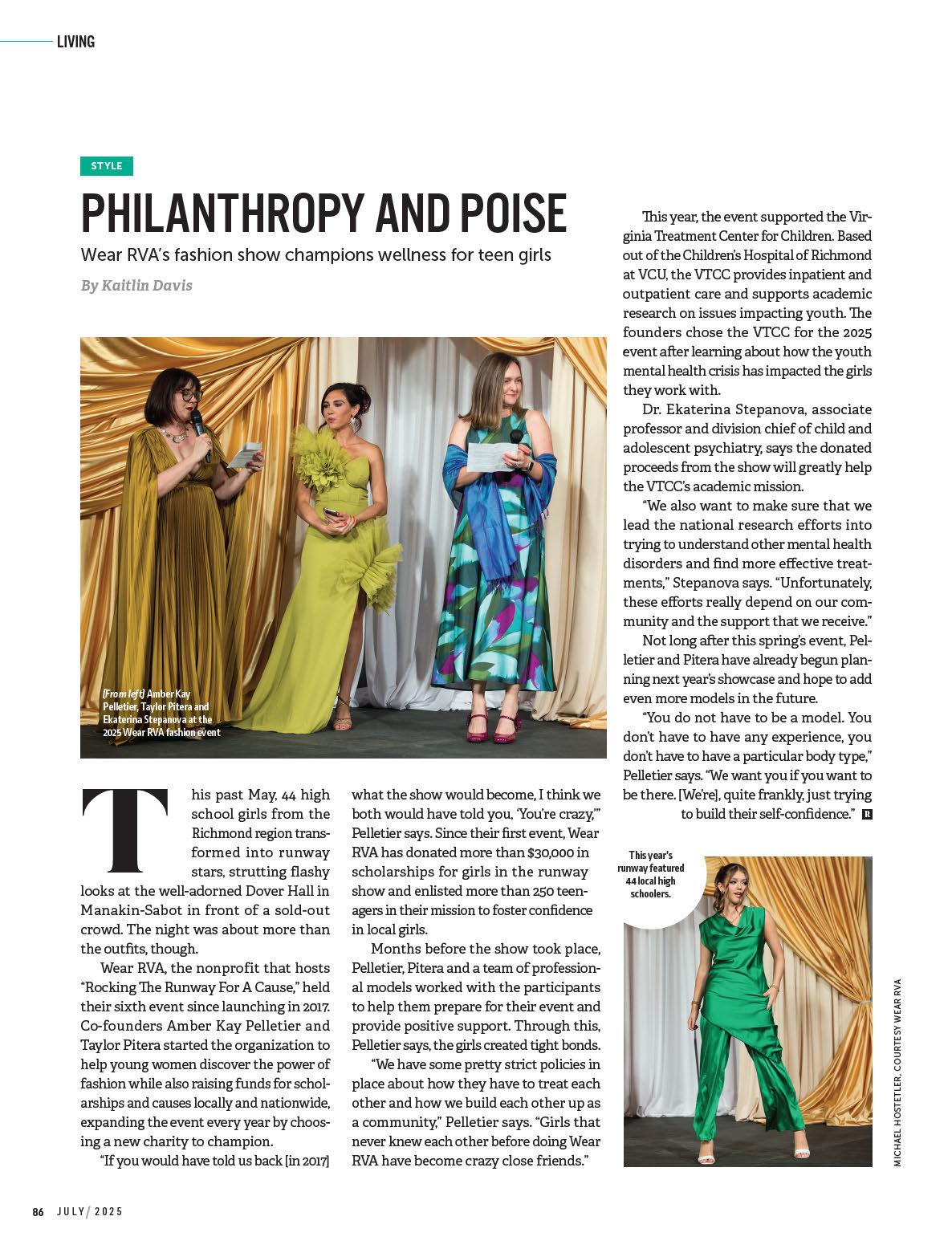

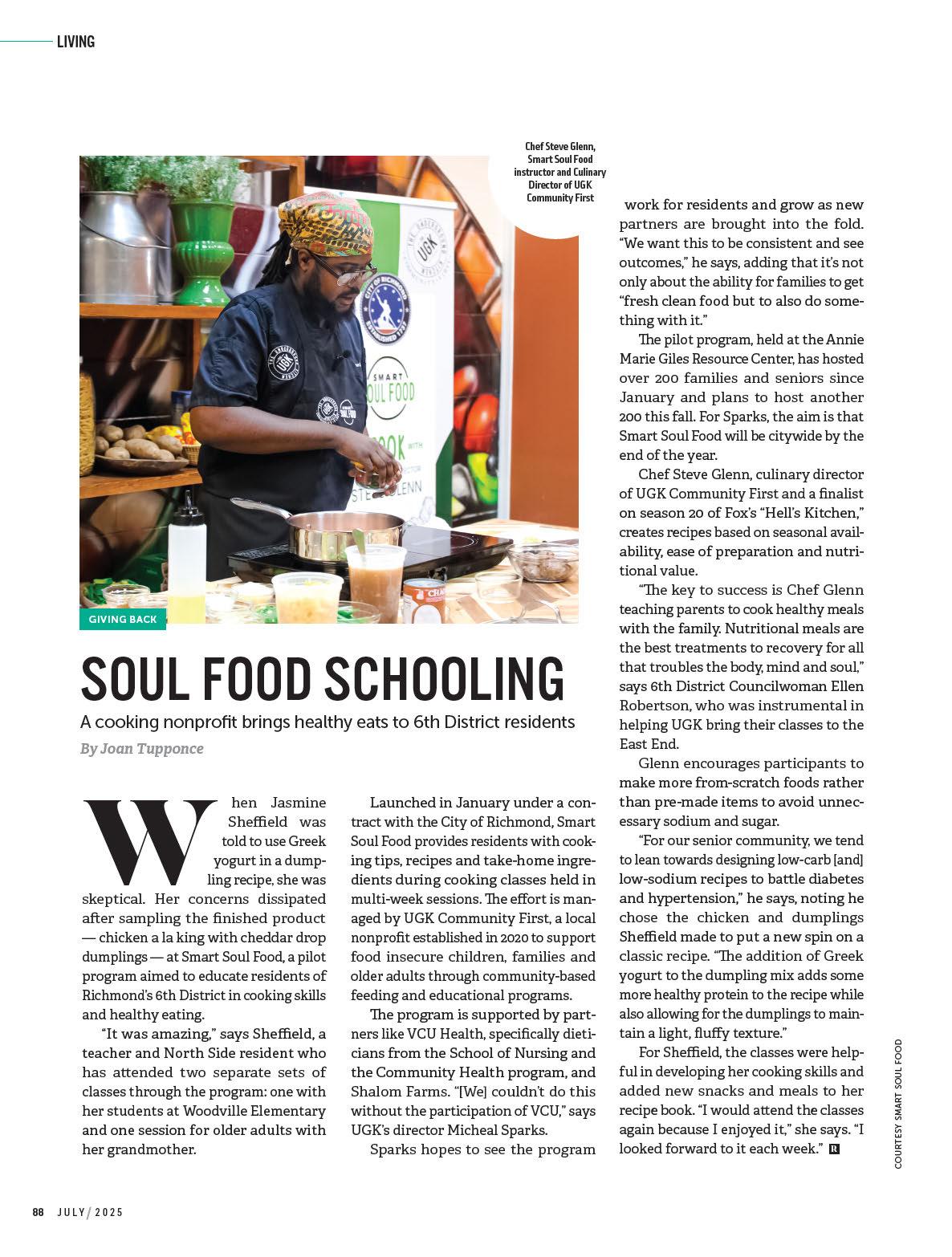

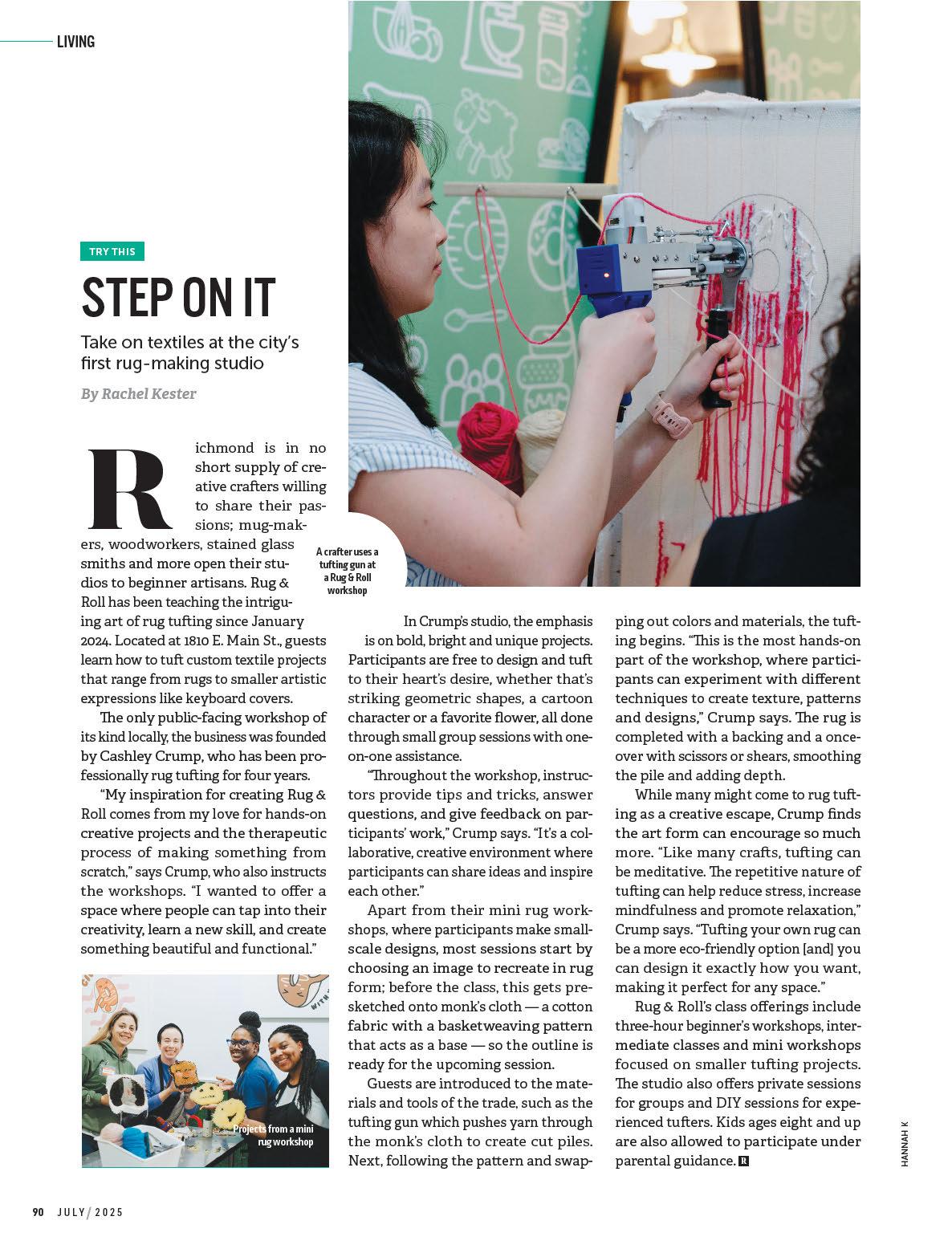

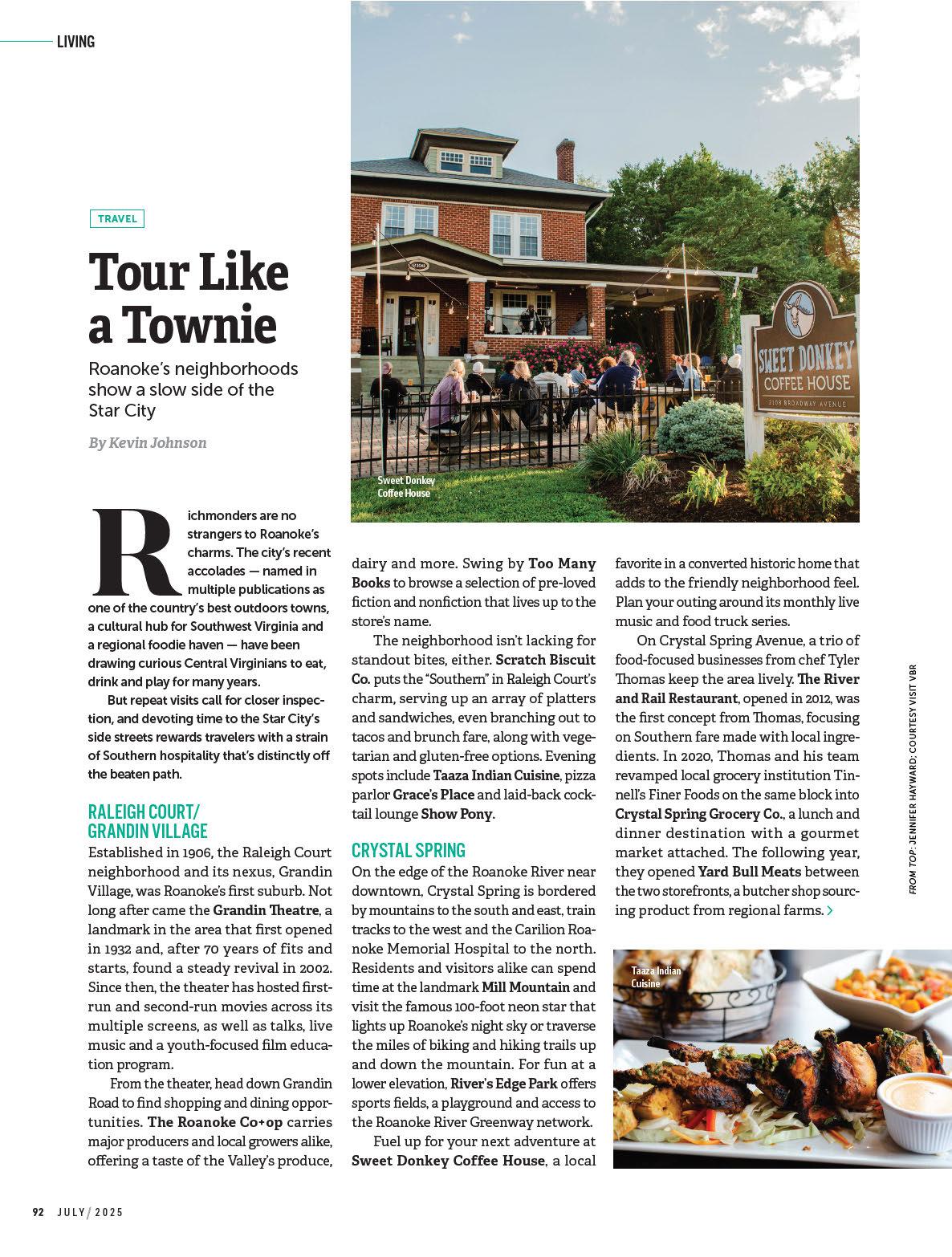

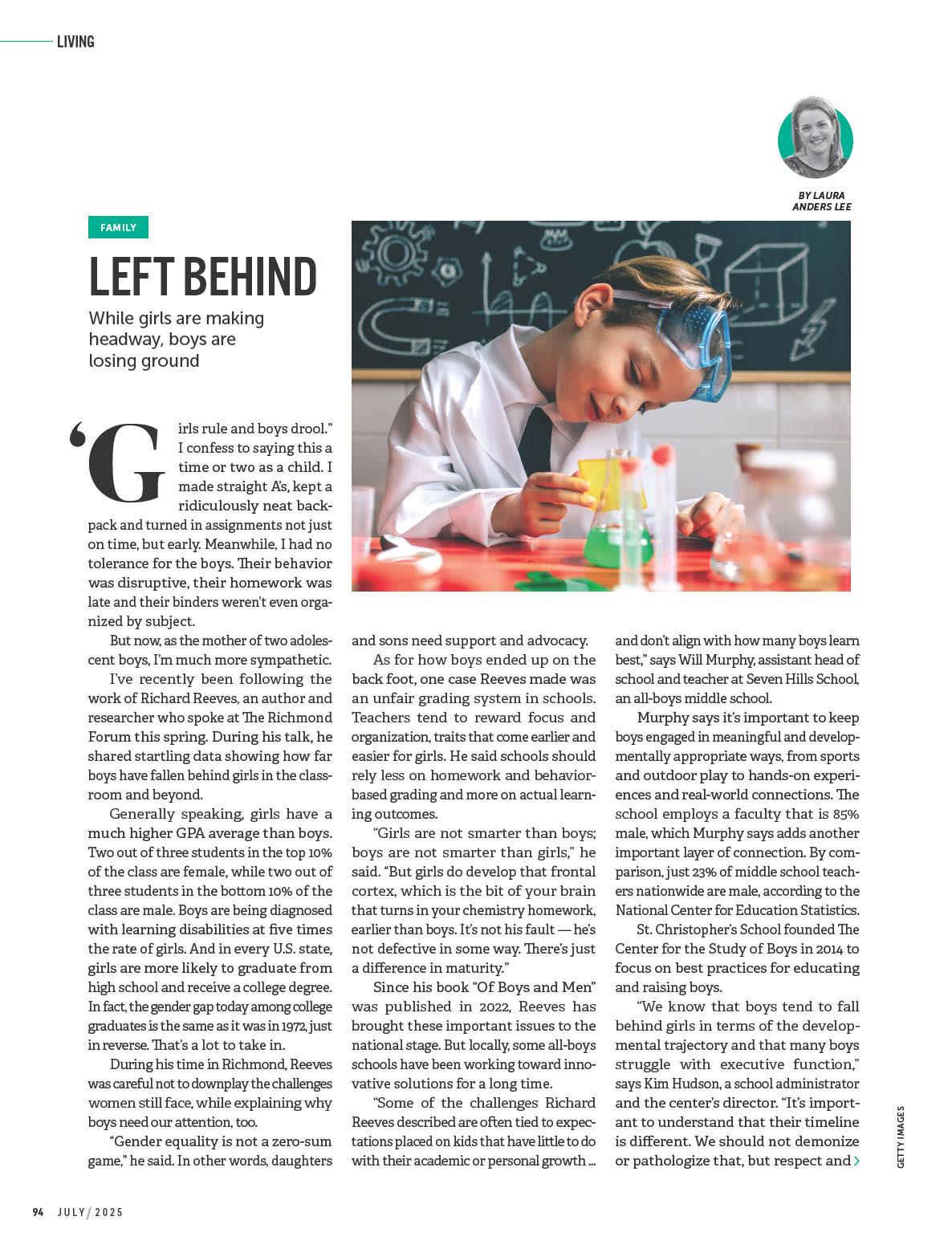

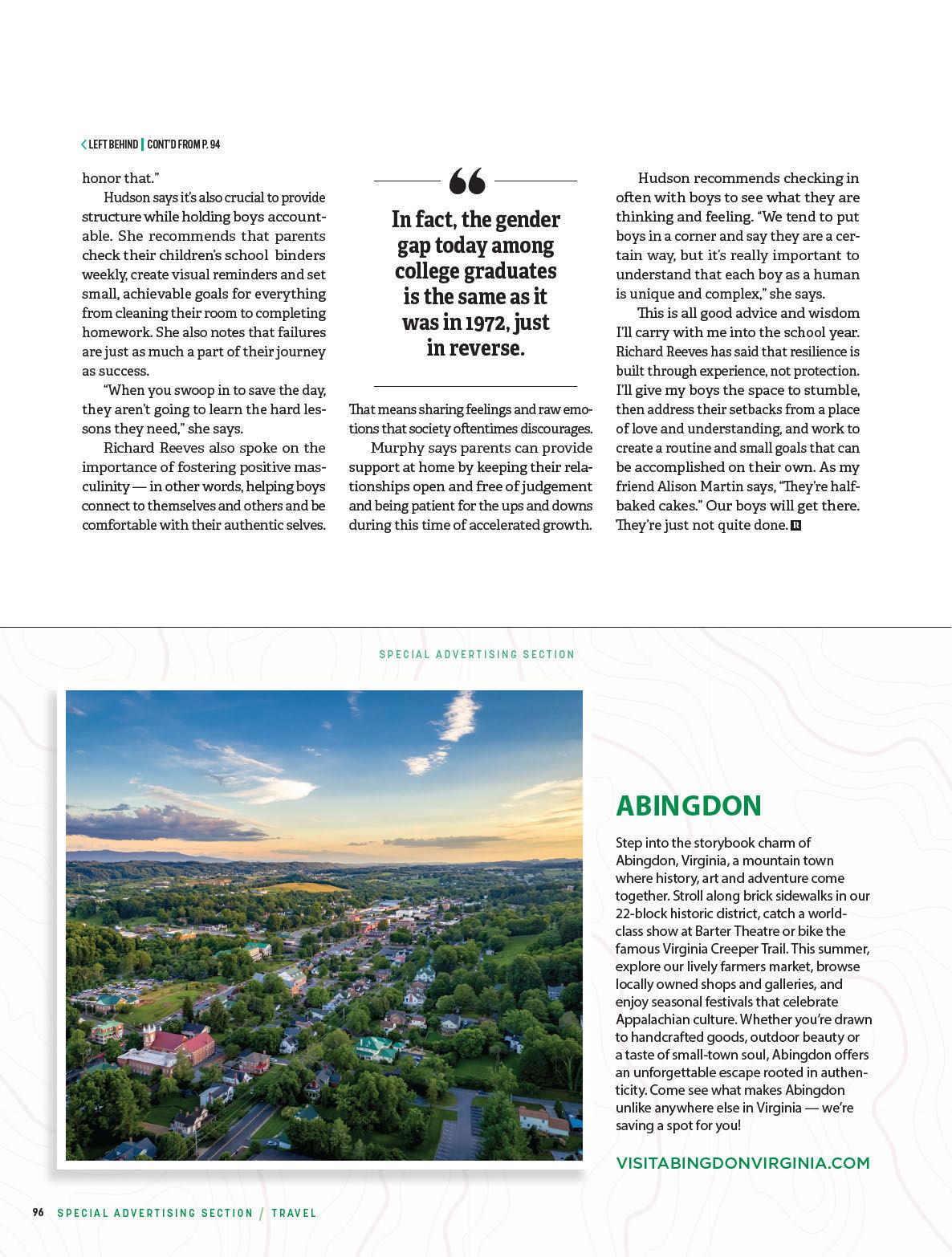



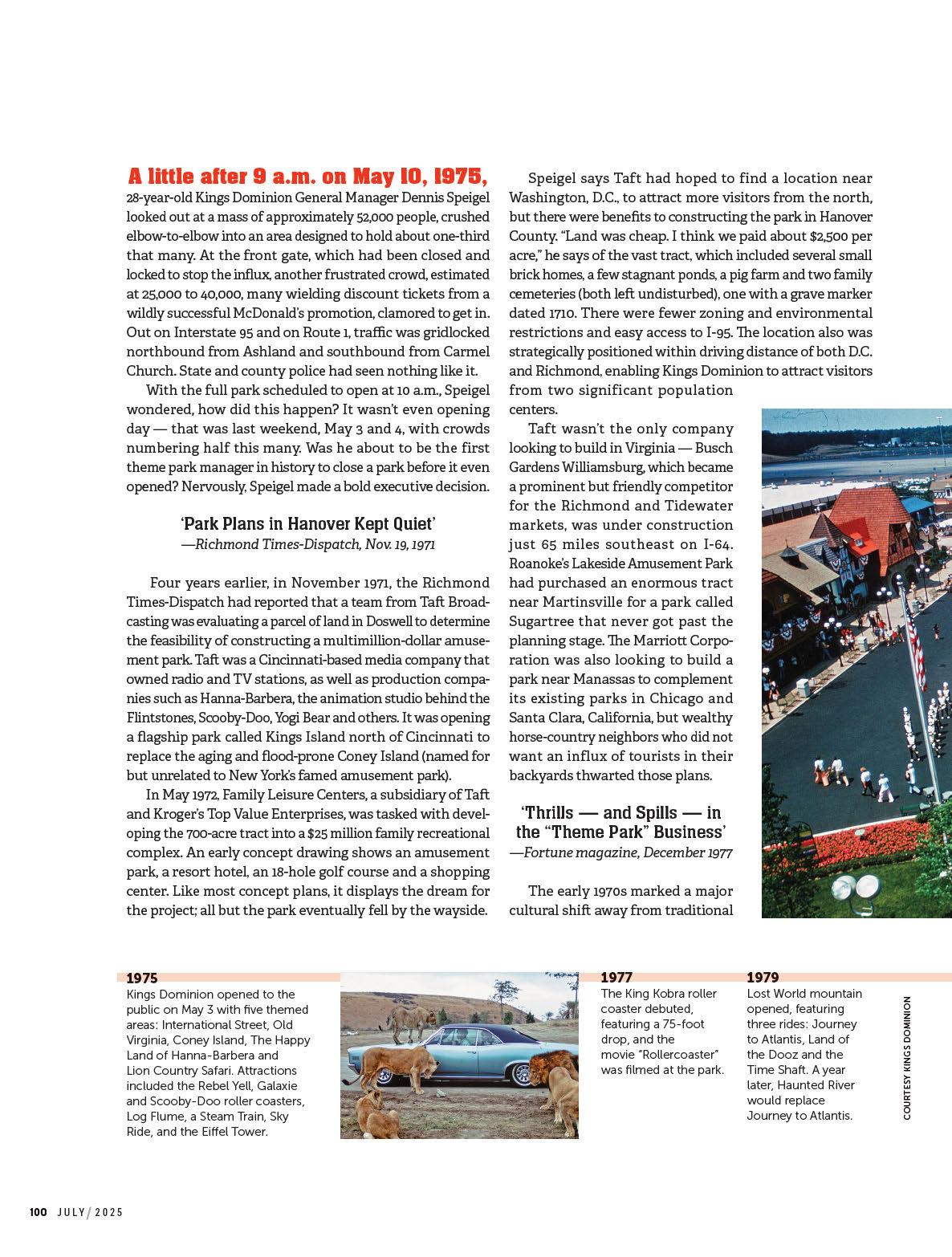
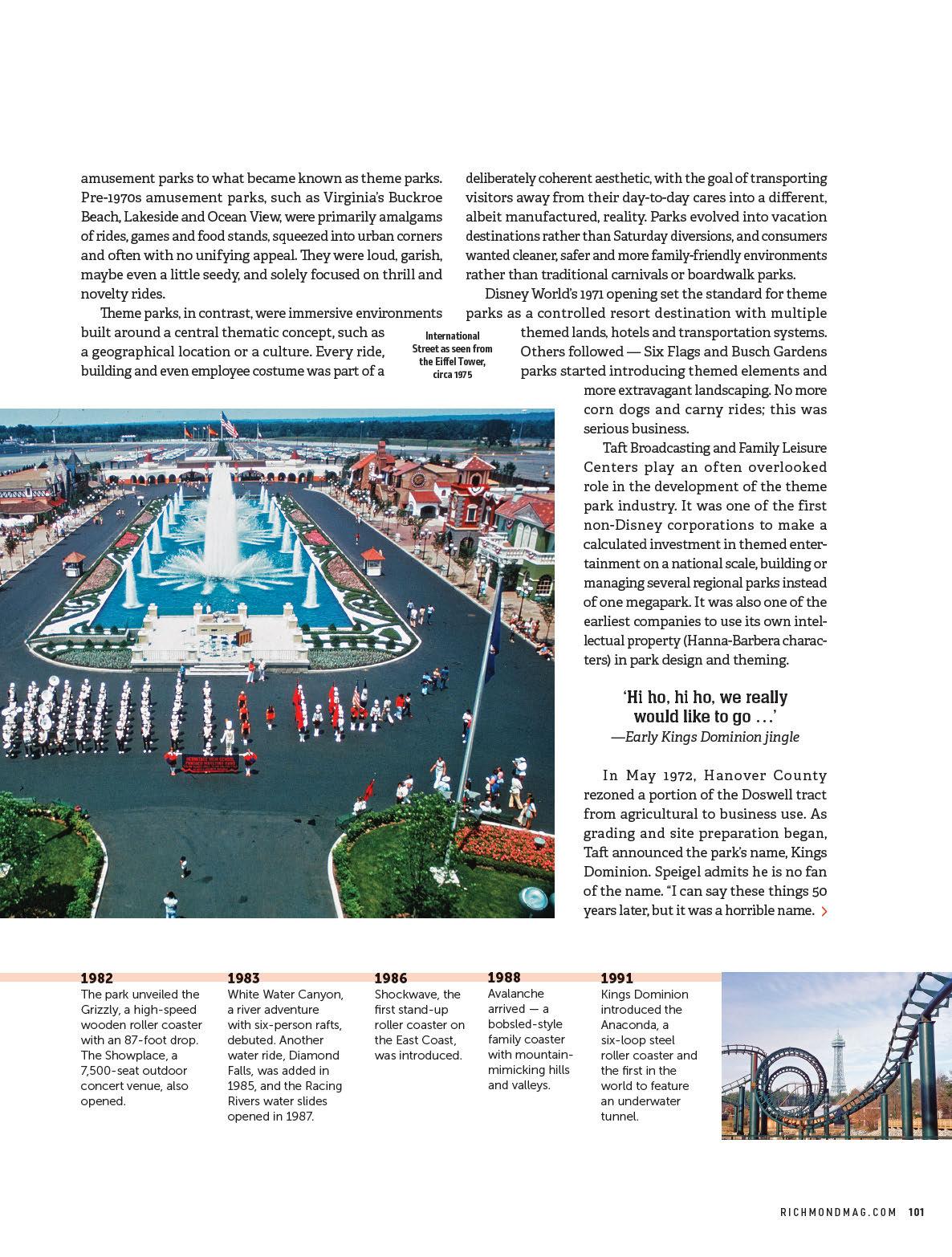
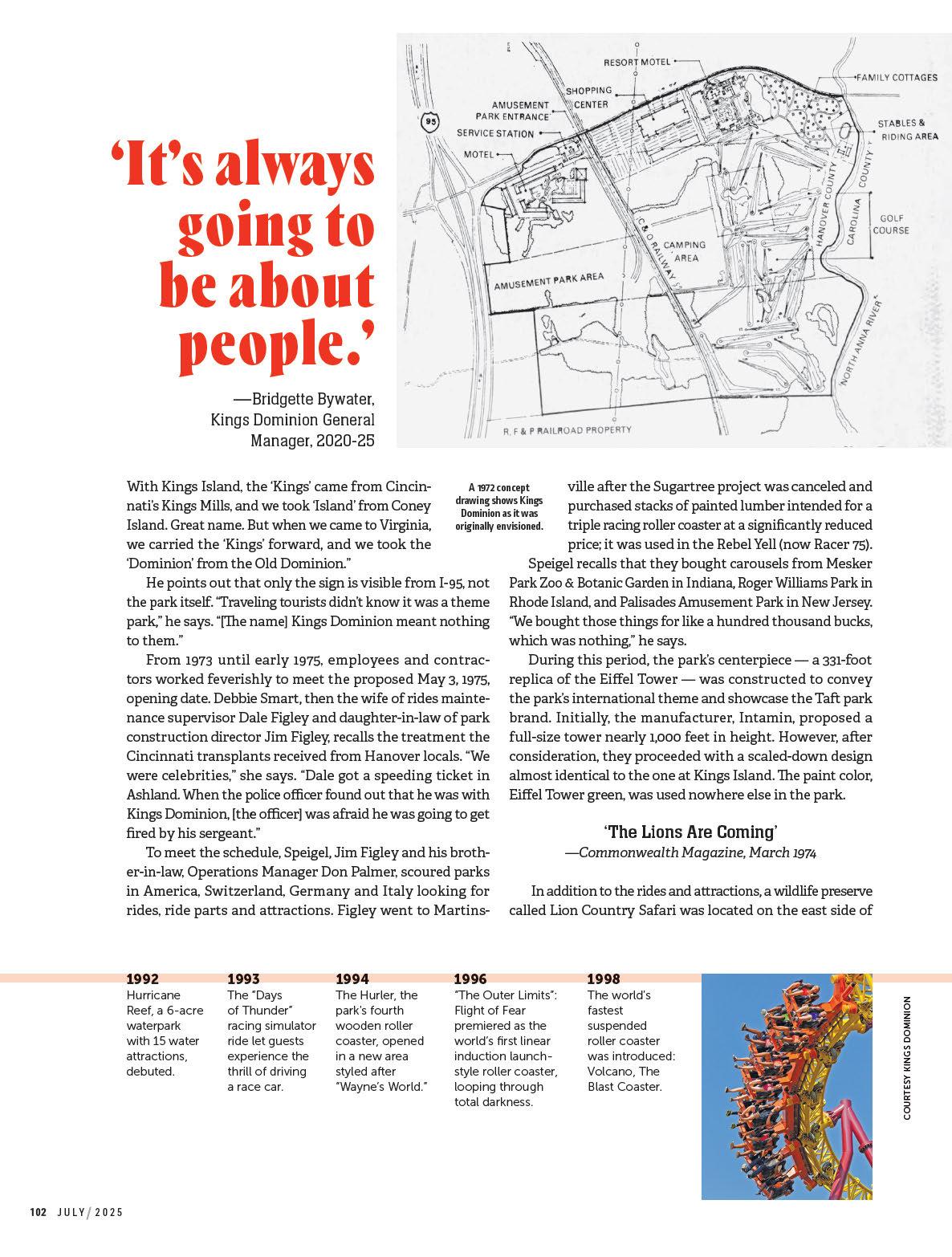
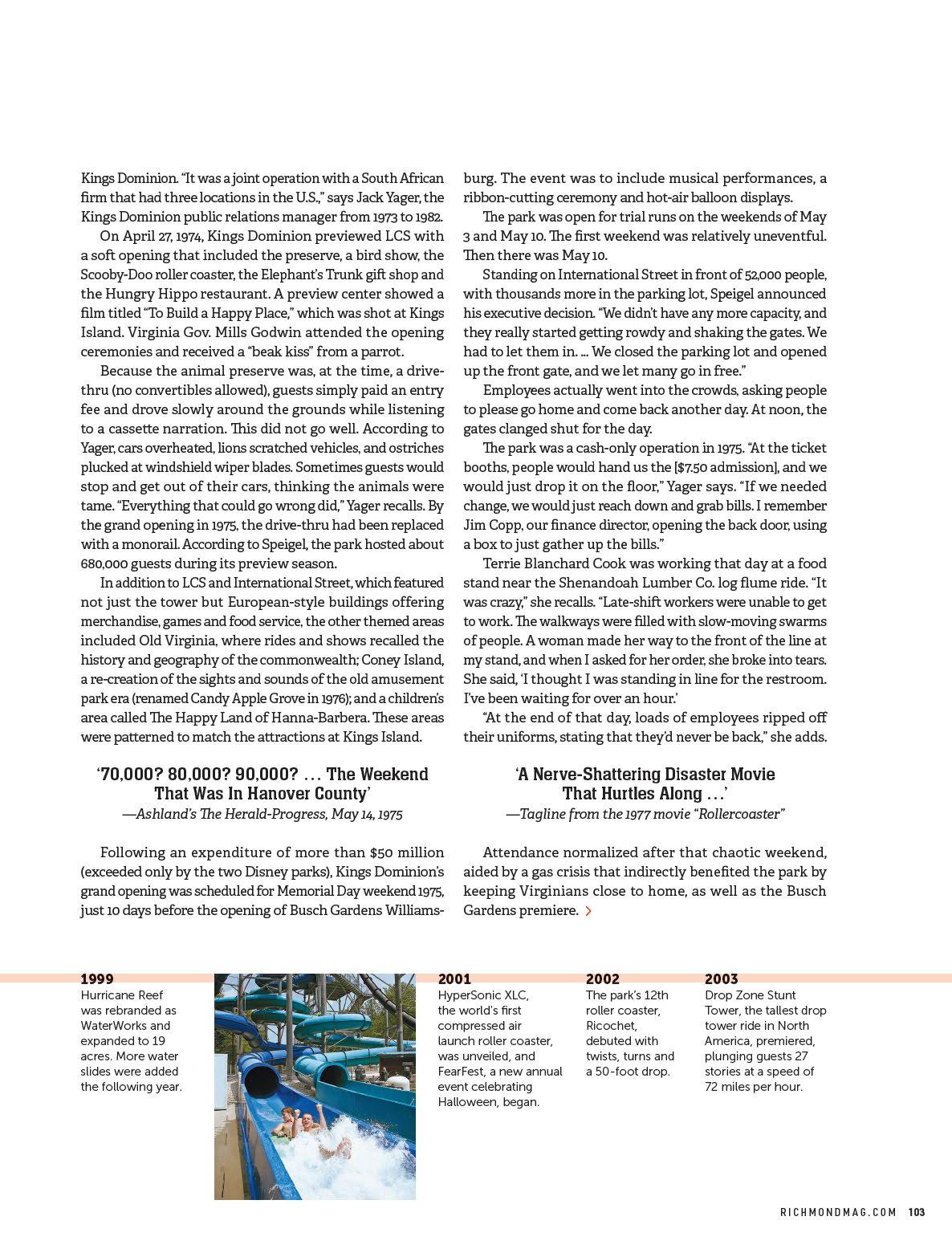
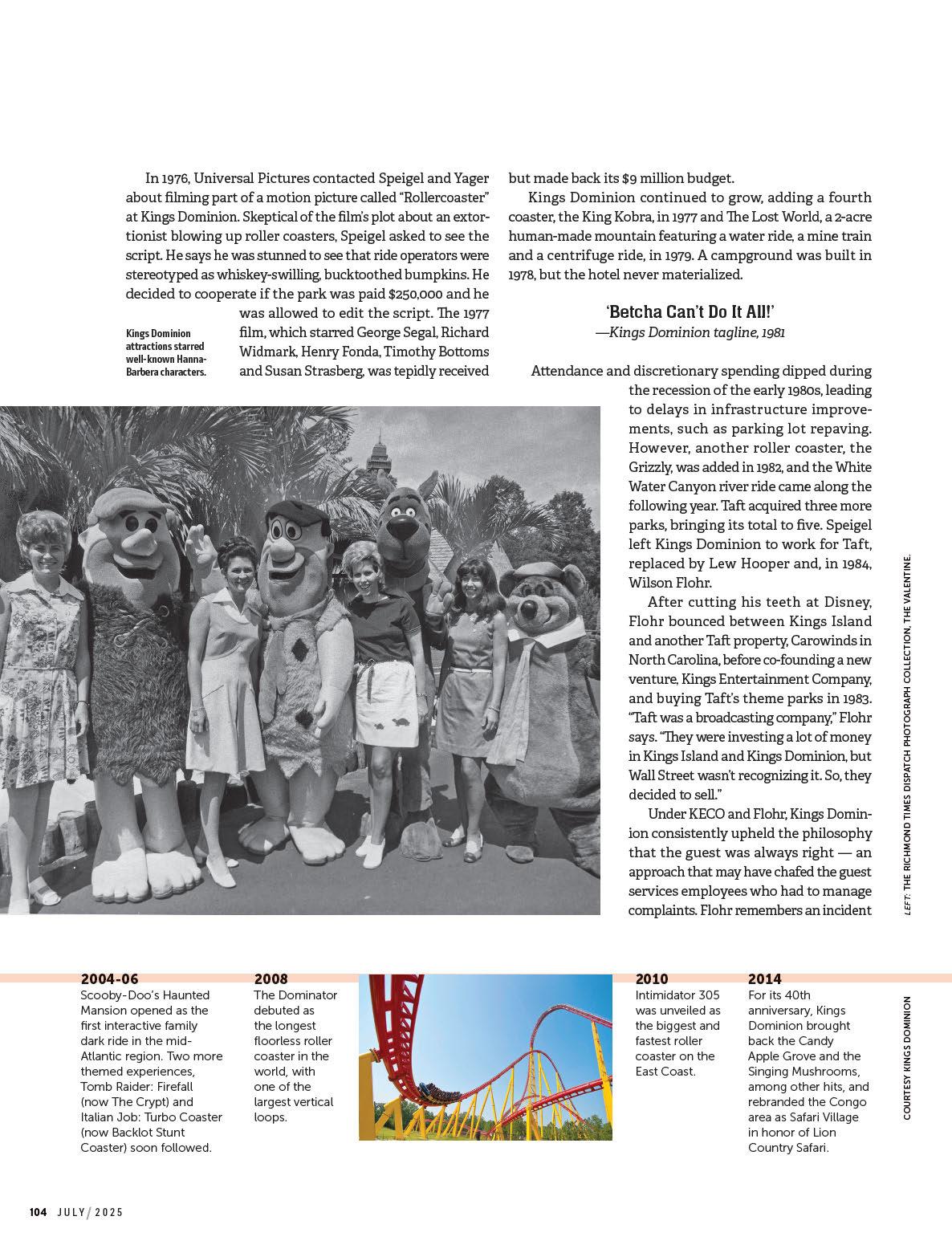
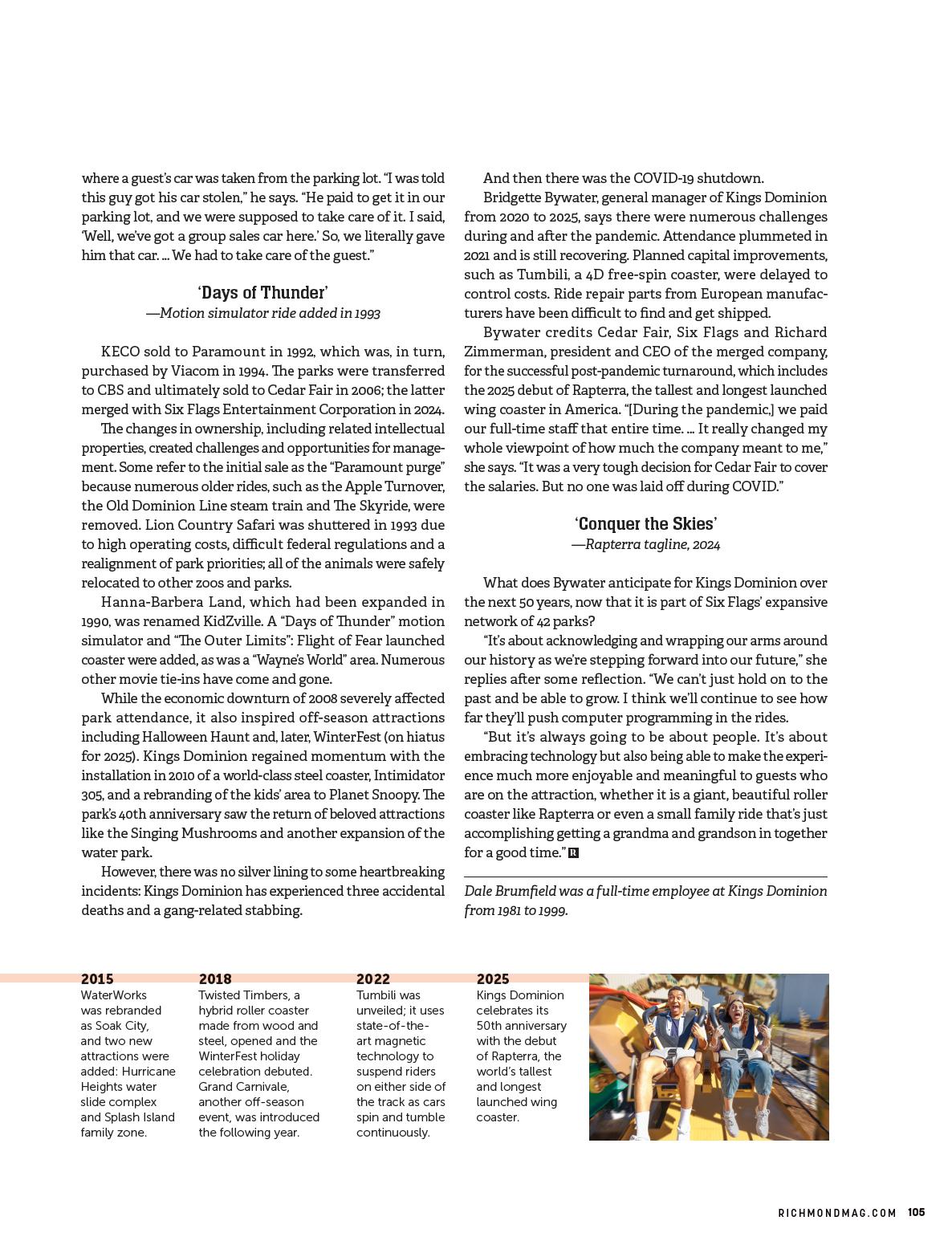














































































































SIX MONTHS OF FEDERAL EXECUTIVE ORDERS HIT HOME
On May 22, 613 households visited the St. omas Food Pantry in North Side in three hours, se ing a new record.
“ at was a substantial jump,” Director Kristin Cummings says. e pantry usually serves 450 to 500 households per day. If first-quarter numbers for 2025 — 12,289 individuals and 5,528 households served — continue at the same pace, year-end numbers will reach new highs, she adds.
Cummings is worried that she’ll have more people seeking food and less of it to give out, because the U.S. Department of Agriculture cut two Biden-era programs that guaranteed income for farmers while providing fresh food to underserved communities: Local Food for Schools, which had a $660 million budget, and the Local Food Purchase Assistance Cooperative Agreement, which helped food banks with its $420 billion budget. e announcement came in March.
USDA monies pay for about 25% of the food distributed at the St. omas Food Pantry. e only way to o set that loss without pausing aid is to rush to diversify food sources and grant funding. “We are trying to bring in more sources, like grocery stores and urban farms such as Shalom Farms,” Cummings says.
Why has need increased? “Prices are higher, and people are a ected by the loss of jobs. ey are stressed about what’s happening with what’s going on in the government. ey are worried: What if SNAP goes away or Social Security goes away?” Cummings says.
David Waidelich, Feed More’s chief collaboration and programs o cer, is seeing the same upward trend. “Last year, our 380-plus distribution partners had more than 1.2 million neighbor visits,” he says.
The people visiting food banks and pantries aren’t those you might expect. “Most are hardworking families juggling multiple jobs. ey visit a few times a year
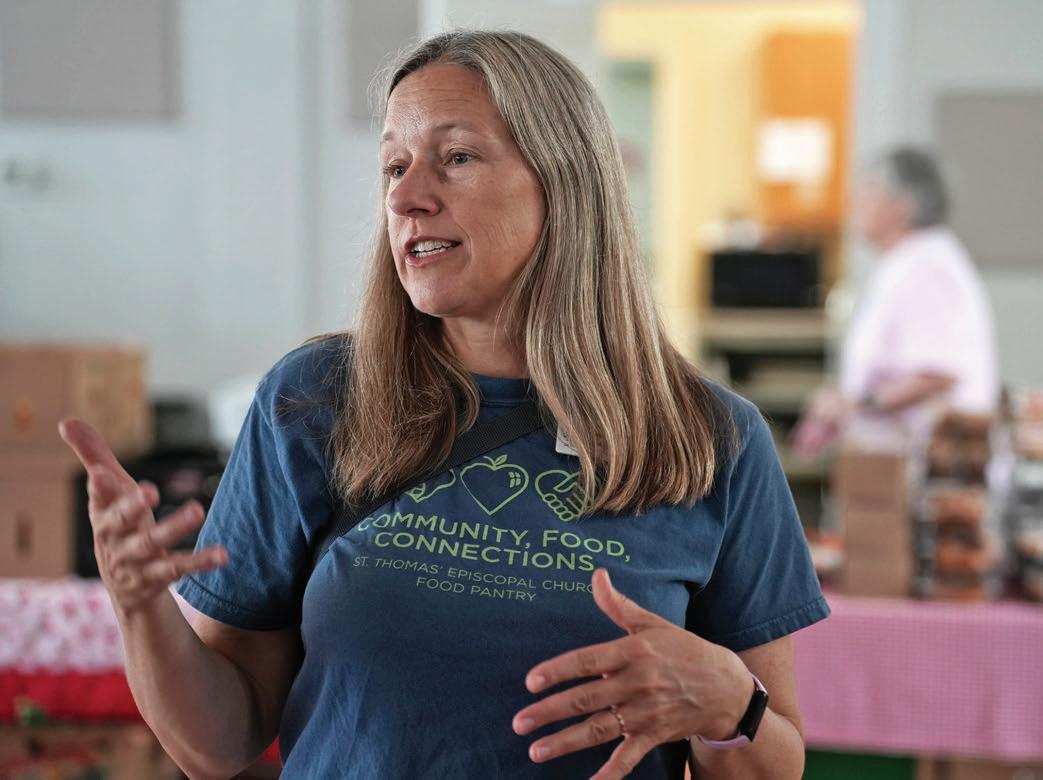
when food prices spike or an unexpected expense, like car trouble or medical bills, forces them to choose between nutritious groceries for their kids or paying rent,” Waidelich says. “Others are seniors who’ve worked hard their whole lives but lack the mobility to prepare a meal, struggle with chronic health issues or simply need support to maintain their independence.”
Changes to federal food assistance, health coverage programs like Medicaid and supply chain tari s are likely to a ect
the cost of living, Waidelich adds. “ ey don’t have a safety net.”
The people Cummings sees, many of them new to the food pantry, are worried. “They are feeling the weight of things. ey are worried about what happens when the tari s show up,” she says. “One of our older volunteers says that coming to the food pantry makes the scariness of the world go away. We want to be that safe place. We want people to feel welcomed.”
—Joan Tupponce
Farms across the country have relied on immigrant labor, but that dependable workforce is threatened due to the Trump administration’s increased detentions and deportations.
Federal cuts and policy changes have made it harder for workers with H-2A (agricultural) visas to arrive to farms on time. “The fruit that they’re coming to work with doesn’t wait,” says Agriberry Farm General Manager Pierson Geyer, “and ... it makes it so that [our] future harvest gets much more di cult, too.”
Amy’s Garden owner Amy Hicks told Richmond magazine in 2023 that, in addition to her family, a trio of these H-2A workers “runs the farm.”
The proposed federal budget also includes a 3.5% excise tax (down from its original 5%) on electronic transfers of funds to foreign recipients, impacting workers’ families who rely on that income. —Mark Newton

Haiden Hopper is facing a double whammy of life choices that would have been easier to navigate before January, when President Donald Trump signed several executive orders targeting the LGBTQ+ community.
One EO prevents transgender and nonbinary people from obtaining or renewing passports that reflect their gender identity. “So now I have a license that says one thing, and my passport says something
totally di erent,” explains Hopper, who uses the pronouns they and them. “I’m actually ge ing married next year, and I want to have a honeymoon, but I don’t feel safe to leave the country.”
In addition, Hopper plans to have top surgery this summer but has only found one area doctor who takes their insurance — sort of. “Because my insurance is so particular, they won’t do a [pre-authoriza-
The Department of Government E ciency says it has terminated three federal building leases in Henrico County.
DOGE claims that ending the $342,341 annual lease for the Virginia and West Virginia Water Science Center, at 1730 E. Parham Road in Glen Allen, would result in $962,305 in savings. Center Director Mark Bennett says the lease will be terminated this December and that a new space has yet to be secured. The center would also have to clear out a warehouse and a laboratory.
Two other leases near Richmond International Airport are on the chopping block: o ces for the U.S. Fish and Wildlife Service’s resident agent and Animal and Plant Inspection Services.
The U.S. General Services Administration, which in March launched its Space Match program to help agencies find o ce space, did not respond to requests for comment. —MN
tion], so I’m having to [pay] out of pocket,” Hopper says. “Most top surgeries around here run $7,000 to $10,000, at least.”
Despite their personal concerns, Hopper, 33, is more worried about trans teens, many of whom are currently being denied gender-related medical care due to a Jan. 28 EO that bans the use of puberty blockers, hormones and gender-a rming care for people under age 19 and prevents certain providers from o ering such care. “[ ey have] to live with all this distress and with these secondary sex characteristics,” they say. “And then you have to go through this big and expensive thing as an adult a er all these years of hating your body. It’s really hard to think about.”
Medical organizations including the American Academy of Pediatrics and the American Medical Association say gender-a rming care is medically necessary for treating gender dysphoria. Such care is legal in Virginia. However, Virginia Commonwealth University’s VCU Health and Children’s Hospital of Richmond, along with University of Virginia hospitals, complied with the ban when the EO was first announced before pivoting in February to allow care for current patients who are 19 and older.
“Executive orders are not law, but our hospital systems have cowered to the pressure of the federal administration and have temporarily stopped, or stopped and started, [providing care],” says Shannon McKay, executive director and co-founder of He She Ze and We, a support, education and advocacy nonprofit for transgender and nonbinary people and their families. A VCU spokesperson declined to comment and referred to an online policy post.
“ e messaging from our federal government, and even our state government, is emboldening people to openly feel that they can harass people and question and scrutinize,” McKay says. “Just like it wasn’t about water fountains with the Civil Rights Movement, this is not about bathrooms, either. Or women’s sports. is is discrimination, trying to make people give up and not show up.” —Ian
Stewart

President Donald Trump has implemented tari s as high as 50% on countries that run a trade deficit with the U.S., as well as a baseline 10% tari on all other countries. The start dates for the most punishing taxes have largely been delayed, and on May 28, a federal court blocked the tari s, saying Trump couldn’t legally make use of certain emergency powers. e next day, an appeals court allowed them to move forward as the Trump administration challenges the decision.
e back-and-forth makes it tough for businesses to predict what will happen next week, let alone next month.
“We’re in a land of confusion,” says Sco ’s Addition custom clothier Kevin Fox. His business, The Suited Fox — “where I do everything from the top to the shoes,” he says — has seen a 20% increase in prices on average since tari s were first announced. “My cost of goods has increased, and it doesn’t ma er where my shipments are coming from, whether it’s Italy, Spain, China, it doesn’t ma er; they’re more expensive now.”
The tariffs also hit after customers were quoted for custom suits, which are made overseas, so Fox had to eat those costs. His manufacturing connections, however, have helped him weather the storm. “They’ve been gracious enough to kind of meet me halfway on a lot of the tari increases,” he says. Fox now is more focused on weddings and other big moments. “You don’t see as many people just splurge as we did before,” he adds.
Even international corporations are feeling the burn. Alfa Laval, a Swedish maker of heat transfer, separation and fluid handling tech, has operated near Richmond International Airport since 1990. e products made there, created with materials from factories in Europe, India and China, are used across America for food preparation, pharmaceuticals, water treatment, data centers and other uses.
For Alfa Laval, the tari s have slowed imports at the border, particularly steel,
and confused the company and its customers, says President Ester Codina.
“ e lack of clarity makes it very difficult for us to do the right planning, and it’s very distracting from what we should be doing — that is, actually focusing on helping our customers here locally and making sure that we have the right strategies to grow the business and employ
more people in the U.S.,” Codina says. What businesses can do, says VCU professor Brett Massimino, is hedge their bets. “A lot of companies — and this could even apply to individual consumers — they’re buying things and importing things now in anticipation that this is as good as it’s going to get for a long time.”
—Mark Newton

U.S. Small Business Administration programs face $287 million in cuts under the proposed federal budget.
The plan is creating a “life-or-death situation” for the Women’s Business Center of Central Virginia, says Executive Director Nicole Parker: The $150,000 that the WBC’s only Virginia branch annually receives — which it must match with private funds before it can access the money — is completely cut in the current budget plan.
The cuts would hit other SBA-funded groups di erently. While the national SCORE organization would lose $17 million, SCORE Richmond is self-funded and led by volunteers. The Small Business Development Centers program (represented locally by the Capital Region SBDC), however, would get $10 million more.
The silver lining is that there is still lots of support for local small businesses, from entities such as the JWC Foundation, Lighthouse Network (formerly Lighthouse Labs), the Metropolitan Business League and the 1717 Collective. —MN
Considering the financial stresses of recent years, the region’s arts and culture organizations have demonstrated resilience, surviving through a mix of supportive audiences, philanthropy, and federal and local assistance. Even in the best of times, groups large and small use these means to maintain themselves.
On May 2, arts and cultural organizations here and across the country received emails tersely explaining that federal grants were “being allocated in furtherance of the Administration’s agenda” and that certain projects did not align with present priorities. Agencies including the National Endowment for the Arts, the National Endowment for the Humanities, and the Institute of Museum and Library Services canceled many of their promised allocations.
Emily Smith directs the artist-run 1708 Gallery, which initiated the InLight exhibition 17 years ago with NEA support.
“ e NEA has funded InLight for over a
decade; last year we received [$50,000],” Smith says. “We applied to the second cycle, which historically sends notifications in April, and we’ve heard nothing.”
S everal local groups are in limbo regarding their programming.
e NEA cut its own ArtsHERE initiative, with funds delivered in cooperation with South Arts and through partnership with regional arts organizations. For Richmond-based Oakwood Arts, this meant a hands-on project to help students learn filmmaking went dark.
“It just feels pe y,” Ashley Hawkins of Manchester’s Studio Two ree says. Hawkins’ organization experienced the cancellation of two grants totaling $230,000: Studio Two ree sought to install solar panels on its old school building and upgrade its HVAC system. e now-vanished grants made up 36% of the organization’s budget.
Development Director Kate Fowler observes, “If organizations have already
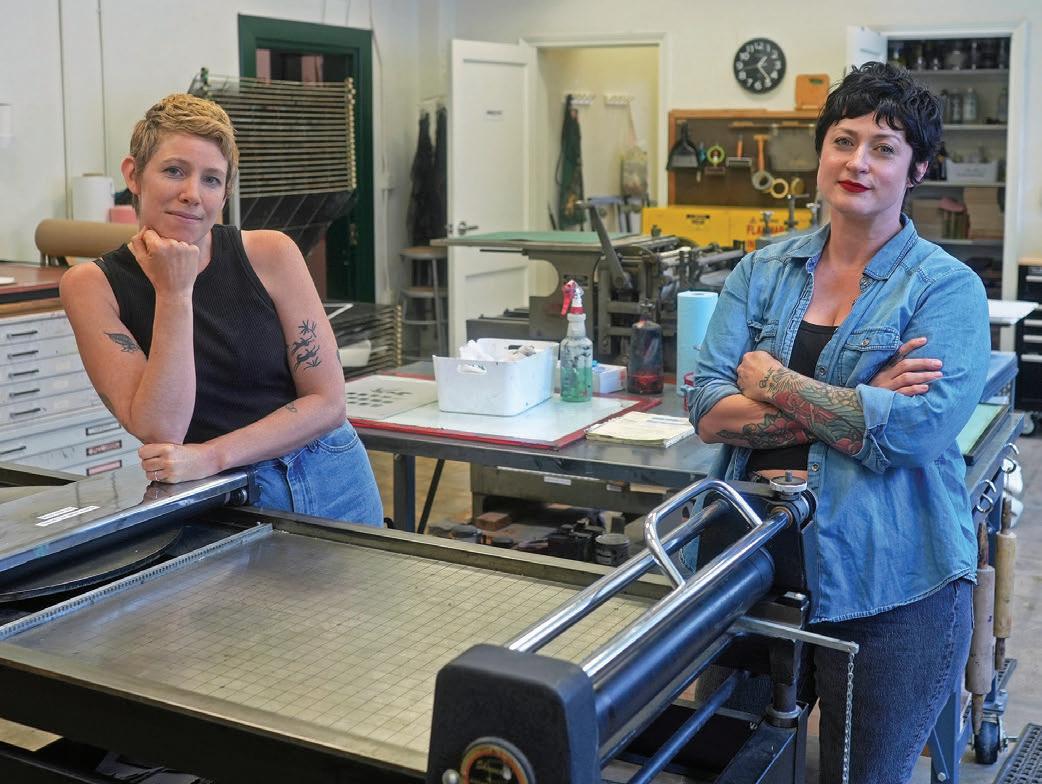
started operating for their fiscal year with [grants] in mind, [the government] reached into small organizations’ wallets and stole that money. I think, too, it’s intentional, to make grassroots organizations fail.”
St udio Two Three combines the entrepreneurial with the artistic. The nonprofit, non-stock company produces screen-printed T-shirts, totes and other materials and o ers classes, workshops and meeting space for smaller groups. Some services may be cut back, but the organization, which owns its building, isn’t going anywhere.
Hawkins and Fowler are gratified that public donations have ticked up with the news. Other arts and culture groups are bracing for the worst. “We’re lucky we’ve always been an earned-income organization,” Fowler says. “Grant funding has been an addition and makes us stronger. Some organizations, though, are at risk of shu ing their doors.”
Hawkins adds, “It’s going to be a weird four years.” —Harry Kollatz Jr.
Richmond’s deposed Confederate monuments will likely stay in storage despite President Donald Trump’s March executive order that, among other things, seeks the restoration of statues and other properties “improperly removed or changed in the last five years.” Richmond’s monuments, however, don’t belong to the federal government.
After the city’s civil rights protests in 2020, ownership of Richmond’s statues was transferred from the commonwealth to the city and then to the Black History Museum and Cultural Center of Virginia and The Valentine (neither responded to requests for comment by press time). Most are now stored near the city’s wastewater treatment plant. —MN

In addition to seeking cures, many medical researchers in Richmond are looking for ways to comply with changes in policies governing federal funding for their work. Restrictions announced in February by the Trump administration threatened to freeze funds and cap spending, but the changes have mostly been delayed or blocked. Additional grants totaling nearly $1.4 billion were cut in April and are now the subject of a multistate federal lawsuit.
The Trump administration wants to cap reimbursements on indirect costs for doing research at 15%, but the National Science Foundation in mid-May delayed implementation until mid-June. Researchers contend that limiting funding for support sta , maintenance, facilities and equipment could halt research.
“While the last several months have been filled with uncertainty and concern, it is important to share that we do not let it stop us from conducting the groundbreaking research that has made VCU a national research powerhouse,” says P. Srirama Rao, vice president for research and innovation for VCU. “ e O ce of the Vice President for Research and Innovation and research administrators across the university have been working as hard as possible to ensure that our researchers have every level of support we can provide.”
VCU is keeping abreast of the changes and sharing information with its sta and students through a website. It has also compiled a database on federal executive orders, memos and guidance that impact the university regarding research, international students and other issues. e site o ers guidance for issues such as a May 14 Department of Defense announcement that also called for a 15% limit on indirect research costs incurred under new grants as well as renegotiating already-approved

grants within six months.
Medical research generated $115.4 million in federal grant funding for clinical trials in Richmond in 2024. VCU received $111.9 million in grants, according to a National Institutes of Health database.
A 15% flat rate cap on indirect costs is already a reality for many smaller research operations. “It is not something I would ever want us to undertake because it is cost prohibitive to actually go about getting [a prenegotiated rate the way larger organizations do] and it doesn’t align with the kind of research that we want to do,”
says Debbi Gilad, vice president of clinical research for Bon Secours Mercy Health. Bon Secours researchers in Richmond and its other nine markets generally rely more on industry-sponsored funding than federal money for their work. Bon Secours researchers are generally not the prime recipients of federal funding but may receive money via working grants awarded through a large academic medical center that is part of the research project. “It’s a downstream effect for us that we likely won’t feel,” Gilad says.
— aron Giddens R
In April, President Donald Trump recognized historically black colleges and universities in an executive order, pledging federal support — such as holding an annual summit — but not more funding. The order was filed as Trump also targets Ivy League schools over their diversity, equity and inclusion policies. Virginia Union University President Hakim Lucas praised the order in a statement: “The White House’s renewed commitment to HBCUs through this executive order a rms what we at [VUU] — and across the HBCU community — have always known: Our institutions are engines of excellence, innovation and transformation. This directive not only acknowledges our historic contributions but reinforces the urgent need to invest in our future.” —MN

